
Viktoriya Torchinsky-Field details how her empathetic leadership approach at Cigna is informed by her flight from persecution in the USSR in 1989



Viktoriya Torchinsky-Field details how her empathetic leadership approach at Cigna is informed by her flight from persecution in the USSR in 1989

Five women in trial law for Fortune 500 companies, including Cigna’s Viktoriya Torchinsky-Field, detail their strategies and missions both in the courtroom and to elevate others in the profession P66
Karim Adatia’s journey to America at a young age, after being forced out of Uganda with his parents, strengthened the adaptability that he relies on today at Insight Enterprises
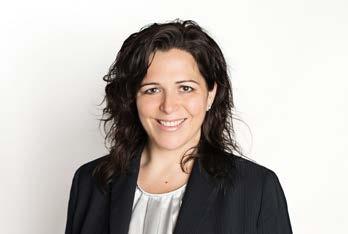
Southern Glazer’s Wine and Spirits has more than twenty thousand employees, and Lauren Mutti works to maintain a familial culture among them
Keith Scott, assistant general counsel of litigation and compliance for Exide Technologies, explains why he looks to hire outside counsel with significant trial experience
Betty Tierney of Macy’s is training the members of her litigation team to be able to operate more autonomously both in and outside the
Patricia Thayer had spent more than three decades working on IP for various private law firms, but a recent in-house opportunity with Gilead Sciences was too good to pass up
Natalie Naugle and Nikki Stitt Sokol are expanding Facebook’s stable of outside counsel to better account for the diversity of the company’s user base
108 The Numbers Guy
Pratt Industries’ Doug Balyeat explains how his background as an accountant continues to influence his work as in-house counsel for the maker of recycled corrugated boxes
119 Get Up, Stand Up
Sabra Truesdale is helping get Western Digital’s employees out of their seats through health and wellness programs, which are also fostering collaboration
138 From the Courtroom to the Boardroom
Before he began working for the Williams Companies, Lane Wilson was a judge for the Northern District of Oklahoma—a job that still informs his work today
182 It’s All in the Name
Sanjana Sharma protects UL’s famous logo from counterfeiters to help the company maintain its reputation as a top certifier of safety, performance, and sustainability
200 Guidance Is Good
Having mentors and serving as a mentor herself has had a profound impact on Ligia Bernardo’s career, including her time with agribusiness Olam

226 Where There’s Smoke, There Will Be
No Philip Morris International
The company is getting out of the cigarette business with “smoke-free products,” and J. B. Simko is helping it navigate the new regulations that have come with the shift
Creative
VP, Creative
Kevin Beauseigneur
Director, Creative Operations & Editorial
Cyndi Fecher
Senior Editor
Geoff George
Digital Content Manager
Frannie Sprouls
Director, Design & Photo
Caleb Fox
Designer
Greer Mosher
Photo Editors &
Staff Photographers
Cass Davis, Gillian Fry
Modern Counsel is a registered trademark of Guerrero, LLC.
© 2019 Guerrero, LLC guerreromedia.com 825 W. Chicago Ave. Chicago, IL 60642
Reprints
Reprinting of articles is prohibited without permission of Guerrero, LLC. For reprint information, contact Reprints & Circulation Director Stacy Kraft at stacy@guerreromedia.com
Corporate
CEO
Pedro Guerrero
Managing Vice President
Marc Jerbi
VP, Hispanic Division
Vianni Busquets
Senior Director, Finance
David Martinez
Director, Client Services
Cheyenne Eiswald
Senior Client Services Managers
Rebekah Pappas, Katie Richards
Client Services Manager
Skylar Garfield
Director, Talent Acquisition
Elyse Schultz
Director, HR & Operations
Megan Thorp
Executive Assistant to the CEO
Jaclyn Gaughan
Senior Directors, Sales
Ben Julia, Sarah Jameson
Directors, Sales
Jane Haglund, Rachel Miller
Associate Director,
Strategic Development
Kara Thomas
Director, Strategic Partnerships
Krista Horbenko
Director, Business Development
Jenny Vetokhin
Business Development Managers
Erin Malone, Elif Negiz
Strategic Account Manager
Taylor Frank
Content & Advertising Managers
Jimmy Borras, John Meo, Kemp Pile, Mark Jablonski, Stuart Ziarnik
The numbers from GQR’s “2018 State of Diversity & Inclusion” report and Culture Amp’s 2018 “Diversity, Inclusion and Intersectionality” report make it plain: US corporations still have a long way to go to convince employees that they fully respect and consider different viewpoints.
While 55 percent of survey respondents for the GQR report agreed that D&I efforts were built into their companies’ recruitment strategies, only 31 percent said that their companies were making measurable progress. And, while 69 percent of straight white men surveyed for the Culture Amp report agreed that “people from all backgrounds have equal opportunities to succeed at my company,” only 49 percent of LGBTQ women, 42 percent of black women, and 40 percent of Latinx women shared the same belief. As the white men age out of the workforce and higher proportions of people of other backgrounds enter it, such numbers are going to have to change.
That’s why it was so heartening to read this issue’s many stories focused on corporate D&I initiatives or personal D&I beliefs, which you’ll find marked throughout the magazine with a “D&I Spotlight” tag. Among other pieces, there’s a profile of Amgen’s Cynthia Patton (p.52), who’s developing the company’s next generation of leaders by empowering them to work more autonomously. There’s a story on Sandra Leung (p.130) and the work she’s doing with Bristol-Myers Squibb to further empower the company’s People and Business Resource Groups and maintain open-ended diversity-driven staffing goals. And, there’s a summarized conversation with Dragon Oil’s Sandra Redding (p.188) about how she has enriched her career and her expertise through exposure to a variety of cultures and perspectives.
In keeping with the theme, in this issue’s feature section, we got the chance to talk to five women working in litigation for Fortune 500 companies, including our cover star, Viktoriya Torchinsky-Field (p.68). She took the time to talk about how her experience fleeing the Soviet Union in 1989 and building her life anew in the US continues to impact her work as a leader at Cigna, including her appreciation for and her ability to understand different points of view.
Her inclusive philosophies and those of others in this issue indicate the prevailing winds of the corporate world as we move further into the twenty-first century. I hope their stories help inform your own D&I best practices.
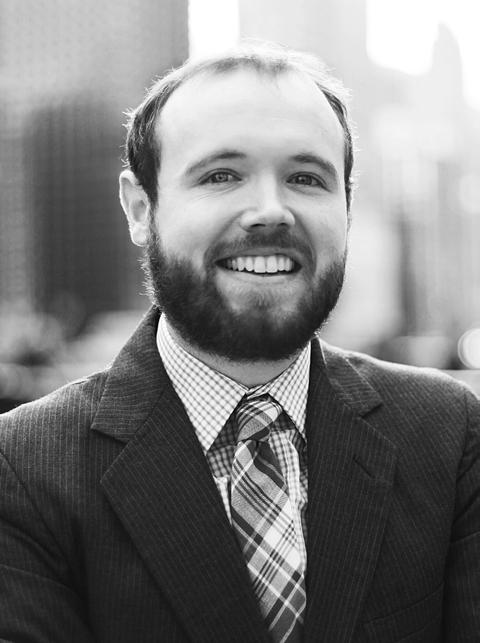

Geoff George Senior Editor
Celebrating legal leaders and their latest departmental and corporate efforts and achievements, including transactions, expansions, negotiations, inclusion initiatives, and more

By Bridgett Novak
Contracts, copyrights, and corporate acquisitions are just a few of Karim Adatia’s tasks at

WHEN KARIM ADATIA WAS THREE YEARS OLD, HIS family was forced to leave the place they’d called home for two generations. It was August 1972, and President Idi Amin had ordered all eighty thousand South Asians living in Uganda out of the country. The Adatias, originally from India, were among the six thousand South Asians who relocated to Canada.
Today, Adatia is associate general counsel and director of legal for Insight Enterprises, a Fortune 500 global technology-solutions provider with more than seven thousand employees, $6.7 billion in revenue, and offices in twenty countries serving clients in more than two hundred countries and territories. The adaptability he was forced to develop at a young age has stayed with him, and he has relied on it not only to gain experience with many different subjects and cultures, but also to push himself and his team to learn as much as they can about Insight’s value proposition and offerings and the ways they can facilitate them.
“My parents expected me to become a doctor, lawyer, accountant, or engineer, but taking organic chemistry showed me I wouldn’t do well in medicine,” he says with a laugh. He was interested in travel and exploring different cultures, so he chose the University of Victoria for law school, partly because it offered a four-month internship in an overseas law firm. Adatia was sent to RamRais & Partners, an IP firm in Kuala Lumpur, Malaysia. “A lot of multinationals, like Intel, Hugo Boss, and major pharmaceutical firms, were active throughout Southeast Asia at the time, so I got to work on several interesting deals,” he says. “I also enjoyed the unique blend of Chinese, Malay, and Indian cultures.”
He relocated to Arizona in 2004, where he joined the corporate practice of Osborn Maledon. In 2010, he joined Insight Enterprises, which manages and transforms how its clients use IT. “We leverage emerging technologies to solve unique business problems and optimize outcomes for our clients,” Adatia says.
In one example, a national railway company that owns and operates a vast network of tracks was looking for a way to predict potential problems and reduce maintenance and downtime costs. “Our digital innovation team designed and built a drone-based imaging solution that uses IoT [Internet of Things] processing to prioritize images and send them to a

cloud-based platform for analysis with near-realtime alerts,” Adatia says. “When an issue is identified requiring repair, it is escalated to track inspectors. The drones are able to fly over remote sections of track, thus saving time and money and keeping inspectors out of harm’s way.” The information gathered by the drones, combined with weather patterns and additional data related to track age, volume of usage, and length of time since the last repair, enable the company to better predict when certain track segments or switches might have problems. Insight also developed a dashboard for presenting the data so that it’s most useful to the business.
Insight doesn’t manufacture hardware; it instead partners with some of the largest providers, including Microsoft, Apple, Dell, and Lenovo. When it does design software, dashboards, and other solutions, it is Adatia’s team that ensures IP rights are properly protected.
Adatia’s team manages most of the company’s major partner and vendor contracts, too, and also plays a role in the company’s many mergers and acquisitions. Since its founding in 1988 (when it was known as Hard Drives International), Insight has made more than a dozen acquisitions. The company’s integration team makes sure lessons learned in one deal are not lost. “We pay a lot of attention to the people affected and make sure we connect on a cultural level,” Adatia says. “Communication and transparency are key. You need to let people know what is happening and provide them with a road map.”
Adatia reports directly to Insight’s general counsel and has three senior corporate counsel reporting directly to him. He also works closely with attorneys in Europe, the Middle East, Africa, and the Asia Pacific region. When adding to his team, he looks for people with a certain mind-set. “Technology is very disruptive,” he says. “It takes someone who is comfortable with change and is inquisitive and humble. They need to know what they don’t know. They need to ask questions and listen more than they talk, which doesn’t come naturally to most lawyers. In a law firm, clients turn to lawyers to guide them. Here, our internal colleagues know more about what they do than we do, so we have to be willing and eager to learn.”
Adatia says he also looks for IQ, EQ, and CQ (intellect, emotional and cultural intelligence, and intellectual curiosity). “Most applicants have the IQ and the experience required, but it can be difficult to find people with high levels of CQ and EQ,” he says. “But, they are essential to forming trusting relationships, adapting to change, and having empathy for what others are going through, which is extremely important to what we do at Insight and to the services we provide our clients.”



Daniel Duval helped reimagine and revitalize Jefferies Finance’s compliance program, setting the company up for sustained commitment to its clients long into the future.
By Paul Snyder

Daniel Duval
General Counsel, Chief Compliance Officer, and Managing Director Jefferies Finance LLC
ACCORDING TO DANIEL DUVAL, THERE’S A SIMPLE reason the notion of trust is important to any business: “Trust, once broken, can be near impossible to repair,” he says. So, if you lose trust, you lose business.
As general counsel, chief compliance officer, and managing director of Jefferies Finance LLC, Duval partners with other members of the executive leadership of the leading leveraged finance and asset-management business to implement the company’s strategic initiatives. This work includes capital raising and liquidity management, fund formation, developing new regulated business lines, corporate governance, regulatory compliance, and enterprise risk management. In addition, as the chief compliance officer to three registered investment advisory businesses, he is at the center of ensuring the company’s commitment to its clients remains paramount. His deep understanding of the business drivers and his integral role in the company’s strategic planning allow him to provide valuable insight into not only legal and compliance topics but also matters that impact the company’s business, processes, and operations. “In a business that is constantly changing, I’m able to evaluate and understand the impact of a particular strategy on our compliance program and, in turn, the impact that any changes in the program might have on our business,” Duval says.
Although Jefferies Finance already had core compliance policies in place, change became necessary after the 2008 economic crisis and the resulting DoddFrank Act, which became law in 2010 and enhanced the regulation of the financial industry. “As a result of certain provisions of the Dodd-Frank Act, our CLO management business—which until then had been unregulated—became regulated,” Duval says. “We began to build out our new compliance program and seized on the opportunity to create a larger asset-management footprint. In 2012, we registered with the SEC as an investment advisor and have issued twenty new CLOs since then, growing our assets under management from $370 million to more than $6 billion today.”
That success aside, it’s not a fixed formula. Duval points out that the compliance program has had to be built to adapt to a growing business and ever-changing markets and regulations. He says his goal has been to manage a program that’s not only cost efficient but
In addition to his work with Jefferies Finance, Daniel Duval is president of the Cornell Law School Alumni Association executive board. He’s also the founder and president of the Cornell Network of In-House Lawyers, which provides networking opportunities, mentorships, and a community that fosters professional development.
“It’s been great fun to meet other similarly situated alumni and build new friendships and relationships across the market,” Duval says. “A number of general and other in-house counsel within the network are also clients of the firm. It’s a great feedback loop for all of us to have direct channels of communications and make sure our clients are being serviced properly.”
also operationally efficient, automating processes to reduce manual work and scaling the program to changes in the company’s size. The multilayered approach requires messaging and support from the company’s leadership but also requires buy in from all employees.
To this end, the current compliance system encompasses everything from the identification of conflicts of interest to employee performance reviews. Data is needed to keep track of all these metrics, and Duval says one of the biggest challenges he has faced has involved upgrading the company’s data-management systems to process all of the information. “The way we manage data ensures we have the right data sets to work with and the right records with which to track, test, and analyze compliance performance,” he says. “It was a massive project that touched on all areas of our business, but it was also an opportunity to not just replicate what we had but build our vision of tomorrow.”
The first stages of creating the new program included extensive reviews, laying out plans for the company’s future—including decisions regarding whether to buy or build solutions—and implementing testing and migration. “It was all critically important to get right,” Duval says. “From a compliance perspective, it’s been incredibly powerful to have a tool for centralizing our records, improving the quality of our data, mitigating potential business interruption, and managing access privileges and information barriers—in addition to tracking, testing, and generating exceptions, approvals, requests, reports, and much more.”
Considering the company’s adherence to trust and ethics, the fact that compliance permeates every aspect of the business perhaps shouldn’t have been a surprise to Duval, but he says that when faced with implementing a system that covered almost every aspect of Jefferies Finance’s business, it was sobering to see just how ingrained the culture of compliance truly is.
“Doing the right thing is not just the job of the compliance department,” Duval says. “It’s every employee’s job to adhere to the highest ethical and professional standards and to identify and mitigate conflicts and ethical questions as they are presented in nearly every decision that’s made.”
“Doing the right thing is not just the job of the compliance department; it’s every employee’s job to adhere to the highest ethical and professional standards.”
Daniel Duval, General Counsel and Managing Director at Jefferies Finance LLC, on his exceptional accomplishments and recognition by Modern Counsel
Knowing that he’s set the company up to better ensure its decisions are made in an ethical and trustworthy manner long into the future is a nice job perk, Duval says. “It’s very rewarding to be constantly working on new initiatives, thinking creatively about new and better ways to tackle challenges, and building the business in a meaningful way to help it grow, succeed, and evolve while protecting our clients, employees, and other stakeholders,” he says. “It’s nice to leave a tangible legacy.”
White & Case LLP:
“Dan is an outstanding general counsel, displaying the highest degree of character and integrity. White & Case has had the privilege of working with him on numerous financings and the expansion of Jefferies Finance’s platform.”
—David
Bilkis, Partner
We are proud of our longstanding relationship with Jefferies Finance LLC. whitecase.com
IF YOU’VE EVER USED A CARD OR badge to enter your work building or your apartment, there’s a high probability you’ve used an HID smart card and reader.
“That is the traditional bread and butter of HID’s business,” says Mark Camero, the company’s vice president of legal and general counsel.
It’s not the only line of work in which HID Global works, however. Founded in 1991, the Austin, Texas-based international security company boasts more than three thousand employees and operations in more than a hundred countries, providing products and solutions for trusted identities, including secure physical access, network logins, asset tracking, and cloud-security resources. HID’s parent company, Sweden-based ASSA ABLOY, is an international door-opening solutions manufacturer that employs more than forty-seven thousand people.
“We are their high-tech arm,” Camero says.
Originally, HID was the acronym for Hughes Identification Device, a subsidiary of the Hughes Aircraft Company, founded by famed aviator, manufacturer, and movie producer and director Howard Hughes. Hughes used radiofrequency identification technologies to keep track of his aviation parts within warehouses.
By Olivia N. Castañeda
As HID secures the identities of people and things, Mark Camero is securing a global legal team that will help the company manage risks
Over the years, though, HID expanded through acquisitions and gradually aligned itself into six business units. Since Camero joined in late 2016, he’s been helping bridge the gaps between these units to help lower legal risk as they’ve reached into new services, solutions, and geographical areas. HID’s software is increasingly cloud-services based, for example, and instead of just letting certain people
Mark Camero VP of Legal and General Counsel
into certain rooms or buildings, the company now has to be very strict with privacy concerns and how personal information is used and stored.
“That is at the core of what we do,” Camero says. “With respect to whatever you are opening—whether it is a door to access a facility or a room, logging on to your computer, or accessing a file—our software and services are critical. We have advanced with mobile access—using your phone to open a door—and now we are moving forward with area governance, based on location-services technology.”
However, at the same time, Camero has been tackling an even broader concern: “How do I get legal involved with a business that really was never used to having a legal department in the first place?” he asks.
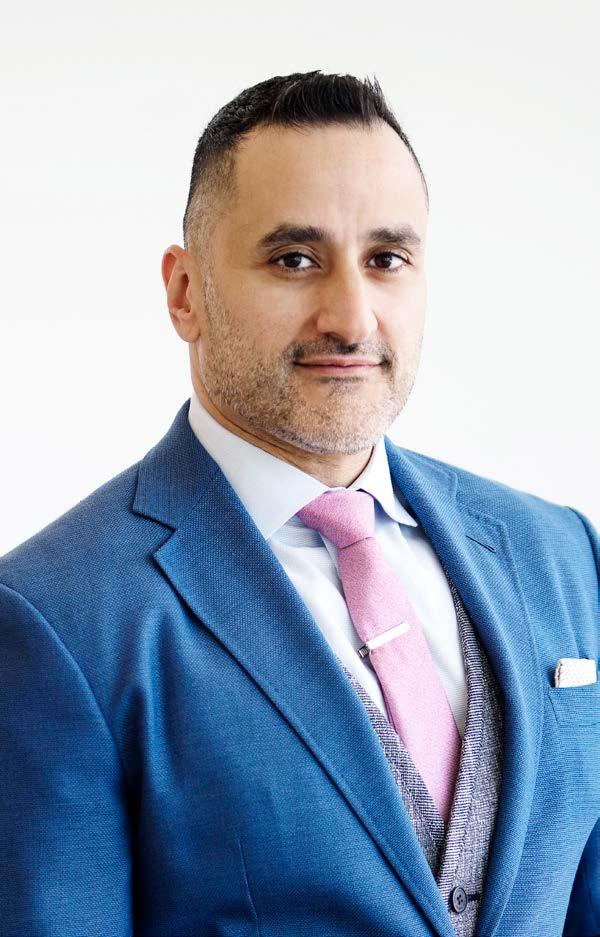
His strategy was to look within the company and maximize the existing talent, promoting several employees to attorney positions. In his first two years with HID, Camero’s legal team has gone from just two people (one of whom was himself) to a group of thirteen based all around the world. Camero describes the team as “top-shelf,” with sophisticated technology backgrounds, meaning they can offer better legal services to HID.
The department’s current focus is complying with China’s new Cybersecurity Law, enacted on June 1, 2017. HID’s operations in China are about network operability and remaining compliant with the country’s regulations regarding how data is sent in and out of the country (including what can be sent, how it is processed, and how it is logged).
HID’s legal team faced a similar task when working to comply with Europe’s General Data Protection Regulation (GDPR). For that effort, HID hired a data-privacy manager and created a data-privacy team to develop the framework procedures that are now implemented in other regions to stay compliant with federal, state, and other regulatory policies. “As a trusted identity company, that is something we can never compromise on,” Camero says.
To continuously meet these goals in line with CEO Stefan Widing’s expectations, Camero has bolstered HID’s legal team with quality paralegals and compliance and data-privacy professionals. New talent must possess sophisticated knowledge of cloud-based solutions, software-and-services agreements, and licensing and a general understanding of commercial technologies.
“As the world gets digital, lawyers need to get digital as well,” Camero says, adding that they should specif-



















“As the world gets digital, lawyers need to get digital as well.”
ically engage in the digital business environment, participate in CLE trainings and transactions, and get involved in the legal community.
Being a part of Camero’s team is about being self-motivated, hardworking, and solutions oriented, as he is. Camero grew up in a lower-income neighborhood of Chicago and put himself through law school at DePaul University while also working a fulltime job. During those lean college years, he developed an appreciation for hard work, which now informs his leadership style. He says he’s a handsoff manager, though, allowing flexibility into his team’s schedule and not micromanaging them.
Paradigm Counsel LLP provides cost e ective, pragmatic and responsive advice for companies from formation to exit, for corporate and technology transactions, licenses, commercial contracts, financings, mergers and privacy compliance.
Paradigm Counsel is proud to serve as HID’s legal counsel and applauds Mark Camero for his leadership and business and legal acumen. paradigmcounsel.com chiara@paradigmcounsel.com
“My point as a manager is to give them the tools, the resources, and the assurance that they need to progress in their careers,” Camero says. “I know the business leaders have had nothing but fantastic things to say about my team. Quite frankly, that’s the best compliment that I could ever be paid, and I am beyond pleased with the success that we’ve had so far.”
DLA Piper UK LLP:
“Mark is a force to be reckoned with—a brilliant lawyer, energetic, bright, quick, strategic, and forward thinking. It is a real pleasure and honor to work with Mark as outside counsel.”
—Burkhard Fuehrmeyer, Partner / Annemarie Bloss, Counsel
As general counsel for AmeriTrust, Kristen Netschke is ensuring the insurance organization’s contracting and data practices are on point and up to date
By Jacob Winchester
MANAGEMENT IS A WIDE-RANGING discipline that can be overwhelming for a new attorney. The key to getting one’s arms around it, according to Kristen Netschke, is not to “boil the ocean.”
“Just by diving into your specific area of operation and rolling up your sleeves, you’re going to reveal readily actionable and digestible items that you can do and that are going to result in benefits across the organization,” says the senior vice president, general counsel, and secretary for AmeriTrust Group. “It doesn’t have to be this scary, ambiguous concept that you don’t know how to apply in practice.”
That’s not to say it’s a lesson she learned in a day. After graduating law school, Netschke landed a judicial clerkship with the Michigan Supreme Court, which led to several years of practice pursuing litigation and appeals for a large Detroit law firm. Although she says becoming an in-house attorney
wasn’t on her mind in those years, the work she did made others take notice. AmeriTrust, a commercial insurance underwriter and insurance administration-services company, approached her about a corporate counsel position.
“At first, I wasn’t sure how to respond,” Netschke says. “Eventually, though, I embraced the opportunity and took a risk.”
Since then, she’s been making waves, especially in the past two years, in her latest role. With the help of her team, she’s targeted several areas within the company for improvement and rolled out a series of initiatives aimed at bringing them up to date.
Having worked her way up as corporate counsel and assistant general counsel for AmeriTrust, Netschke is well acquainted with the company’s many contracts. Still, until assuming her
current role, she had not been tasked with considering how contracts flowed into the legal function before returning to the business. “I realized we had a very decentralized method of contract management, which was definitely contributing to unnecessary risks, distractions, and delays,” she says.
In light of this, Netschke and her team set out to imbue the process of review with some necessary internal structure. By streamlining the contract review system, the team ensured that any commitment of resources and anything obligating the company was properly reviewed, prepared, approved, and executed.
“By centralizing the contract function and being able to monitor the workflow, it created an opportunity for us to start tracking metrics, which we could use to identify and remedy inefficiencies that existed,” Netschke says. “We were also better able to focus our attorney effort—because there are only three of us—on higher-value and higher-risk agreements or transactions.”
The new policy requires all contracts to be directed through the legal department. Netschke’s team sent out
and trained employees on proper procedures, implemented explicit requirements for contract review, and built in a few measured exceptions.
“We didn’t want to be too onerous, because ultimately we want to help the business achieve its goals out in the market,” she says. “I’m working very hard to override the stigma of a legal department being a ‘department of no.’ We want the company to know we’re a resource for them. We’re here to help, not hinder.”
Netschke and her team also set about refining AmeriTrust’s record-retention policy, which hadn’t been updated in years. “In today’s world, it’s very important to have a record-retention policy that’s a fluid living-and-breathing document,” she says.
The team drafted and implemented a new policy that made the record-retention process less complicated. Her team also hosted various webinars and on-site meetings to help colleagues follow through on the new system. “I’m a firm believer that a policy is just a policy without acting responsibly to support and enforce it,” Netschke

says. “We appointed record managers from each of the functional areas of the company, and they’re tasked with scheduling, implementing, and maintaining a record-cleanup day on an annual basis. They also track the metrics of what they’re doing, what they’re deleting, and what they’re keeping so that we can actually measure the value coming out of the new retention policy.”
The new approach will help protect the company, too. “Keeping records for longer or shorter than needed is going to expose any company to unnecessary risk,” Netschke says. “There are also operational and regulatory requirements that obligate us to be responsible with our records.”
As AmeriTrust’s records—and the company’s data in general—become increasingly digitalized, Netschke and the company’s leadership also find themselves focused on cybersecurity concerns. “We really wanted to bolster our existing cybersecurity processes and procedures and bring AmeriTrust in line with best practices when it comes to data security,” Netschke says.
Kristen Netschke SVP, General Counsel, and Secretary
AmeriTrust Group, Inc.
This has involved recruiting a chief information security officer as well as an internal security director. In addition to creating these positions, the legal department is also working closely with security liaisons from AmeriTrust’s IT department.
“There are myriad regulations now regarding data security and privacy,” Netschke says. “Our goal was to protect the company in the best way possible by creating a dedicated security team for the task. As a company, we’re striving to optimize value for our shareholders, policyholders, and employees. To do that, it’s extremely important to understand how the world might be changing and what uncertainties might impact our financial strength, our earnings potential, and even our social responsibility.”
It doesn’t just protect the company either. It emboldens the entire organization. As Netschke puts it, “Having risk management as a process that’s actively scanning that environment, looking at those risks or opportunities, and developing ways to mitigate or monitor them is a very effective way to drive value.”









Hunton Andrews Kurth is proud to support Kristen Netschke at AmeriTrust and wishes her continued success.
Clients say they trust the attorneys of Plunkett Cooney to anticipate legal pitfalls, to resolve high-stakes litigation and to craft contracts they can sign... with confidence. See your business differently.
Hunton Andrews Kurth is a global law firm serving the world’s leading companies. Our industry focus spans the energy, financial services, real estate investment and finance, insurance, retail and consumer products, and technology sectors. With offices well-situated throughout the United States, Europe, Asia and the Middle East, Hunton Andrews Kurth is poised to help businesses around the world navigate complex legal challenges. For more information, visit HuntonAK.com.
As distributor Southern Glazer’s Wine and Spirits continues to expand, Lauren Mutti is helping to maintain its family values from a legal standpoint among its thousands of employees
By Joseph Kay
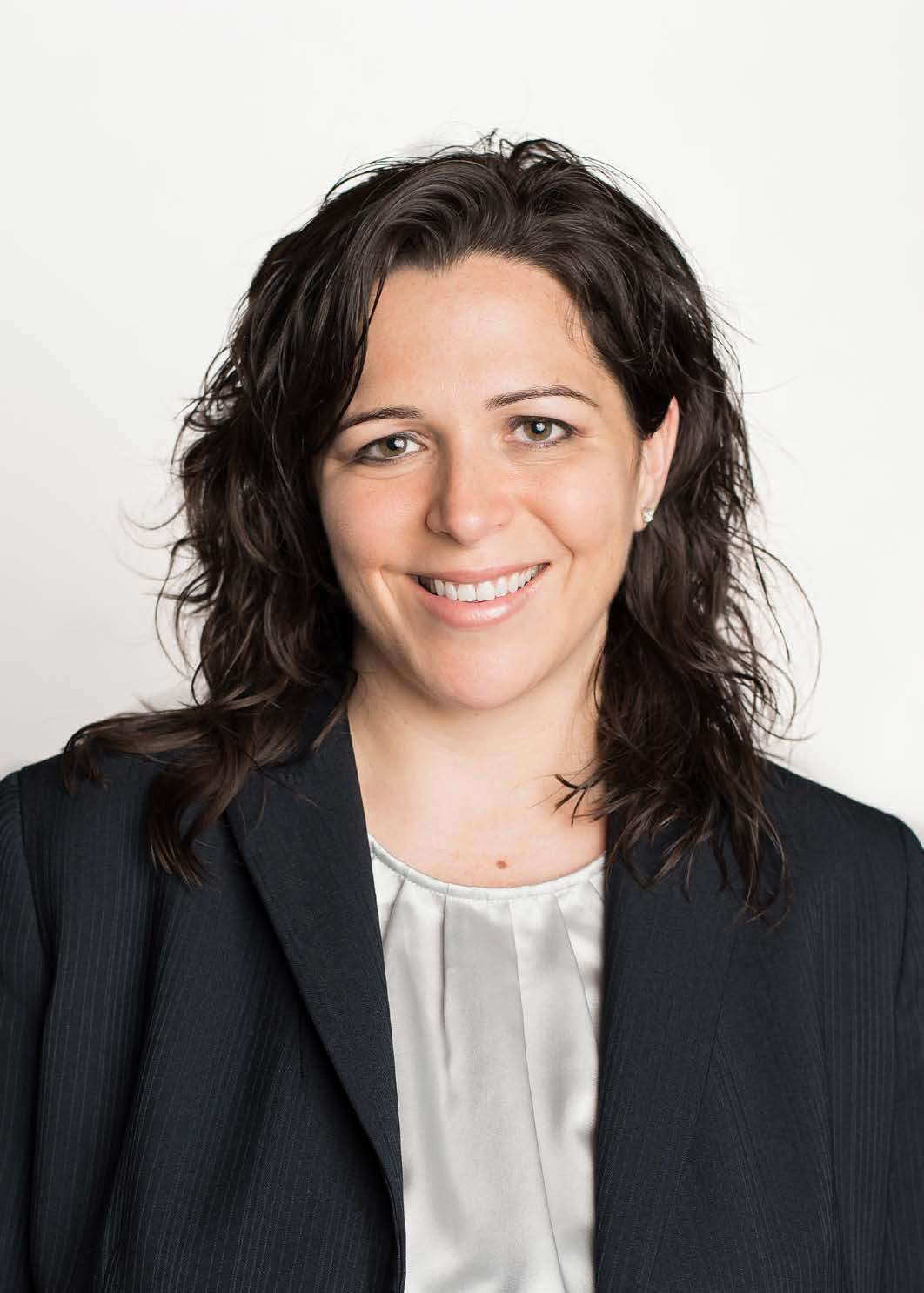
Mutti VP of Labor and Employment Counsel
THOSE WHO’VE TIPPED BACK A BEER, A COCKTAIL, or a glass of wine today likely have Southern Glazer’s Wine and Spirits to thank for it. The company is the largest wine and spirits distributor in North America, shipping thousands of brands and millions of cases of product annually via operations in forty-five US states, Canada, and the Caribbean. To operate at such a scale, the company employs a workforce of more than twenty thousand, and it’s Lauren Mutti’s job to manage them from a legal standpoint—a task complicated by the fact that she’s largely building her position from scratch.
Mutti came to Southern Glazer’s after ten years in a role as occasional outside counsel for the company. The then general counsel of Glazer’s Distributors, Alan Greenspan, was tapped to build the company’s internal legal department in 2016, and he reached out to Mutti for help. She accepted, excited about the opportunity to influence the company’s strategic direction. “As outside counsel, you’re often triaging or fixing problems that have already happened, figuring out how to clean up after something,” she says, “whereas if you’re in-house, you have more of an ability to be closer to the business and prevent those problems from happening,”
Today, as vice president labor and employment counsel, Mutti is responsible for overseeing labor and employee relations, dispute resolution, and workplace harassment and discrimination issues—all of which can be serious challenges at a big enterprise. She and her team make the strategic innovations and adjustments necessary to prevent such concerns from emerging in the first place— and more broadly define the kind of company Southern Glazer’s can be in the process.
For instance, during Hurricanes Harvey and Irma in 2017, the company took bold steps to help affected employees. “Legal worked in conjunction with HR and communications to put together a broad range of assistance programs for employees,” Mutti says. “We offered interest-free loans, we paid extra overtime, we offered grants, we suspended attendance policies, and we ensured our employees had essentials like water and food. But, it’s not only in our partnership on big projects like these hurricane responses; it’s also in our everyday coun-
“We’re going to make sure we treat our people right.”
seling about how we handle difficult situations with our people.”
Despite its size, Southern Glazer’s proudly remains a family-owned company, and corporate leadership tries to work those family-driven values into the company culture. Even the company’s statement of values is an acrostic that spells out the word family. Mutti’s part is to help protect and define those principles—chiefly, integrity and inclusiveness , found under the I—as they relate to Southern Glazer’s team members.
A family-oriented, people-first approach, however, can sometimes mean looking beyond simply the correct legal answer: “On a base level, we advise on what we can and can’t do legally. But the more interesting layer, I think, is: What should we do? And what kind of company do we want to have? And what steps can we take to move the company forward, both financially and for our people?” Mutti says. “That’s a specific challenge for labor and employment in-house counsel because it’s not just a question of what’s legal or what’s not.”
Since her role touches people and their livelihoods (in addition to money and contracts), it demands a high degree of emotional intelligence. Mutti says that this has been key to her success, and she prioritizes its development among her team members. She helps them model charged personal interactions, invites them to observe challenging calls, and provides gentle guidance toward empathy and awareness.
In an in-house position, Mutti says, it’s important to weigh legal risk and institutional values while maintaining awareness of personalities and relationships. That, according to her, is the emotional intelligence that leads to good counsel. “It takes sensitivity—being self-aware, being aware of how you’re being perceived by all parties in the room, being aware of competing priorities between the others,” she says. “That’s critical. Ultimately, though, the business will make the decision on what steps to take. We’re only as valuable as our credibility.”
The ongoing challenge for Mutti and Greenspan has been to carve out space for a legal department that is viewed as having a strategic role in the business. Relationship building has been key; there’s no substitute for face time, especially in such a large company. Over time, they’ve built up trust as a solutions-oriented element of the operation. Resilience, Mutti says, has been the greatest asset. “At first, some were skeptical about what we could offer, but we stayed true to our guiding principles,” she says. “Provide good advice. Show you’re a team player, and even the most difficult people eventually come around.”
Looking ahead, Southern Glazer’s is prioritizing expansion and evolution. The company is scaling up digital initiatives and tech solutions for salespeople and customers across the country. And, now that her department has a strong foundation of trust, Mutti is looking to expand it along with the company—all the while keeping those family values a priority. “We are moving forward and evolving to make sure that we meet the challenges of the twenty-first century,” she says. “There’s always going to be change, but we’re going to make sure we treat our people right.”

Mutti, Vice President, Labor &
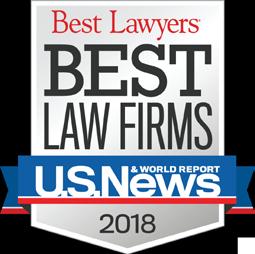

Dave Wall is a convert to the advantages that come with making Volvo Trucks’ legal department a member of its clients’ teams.
By Jeff Silver
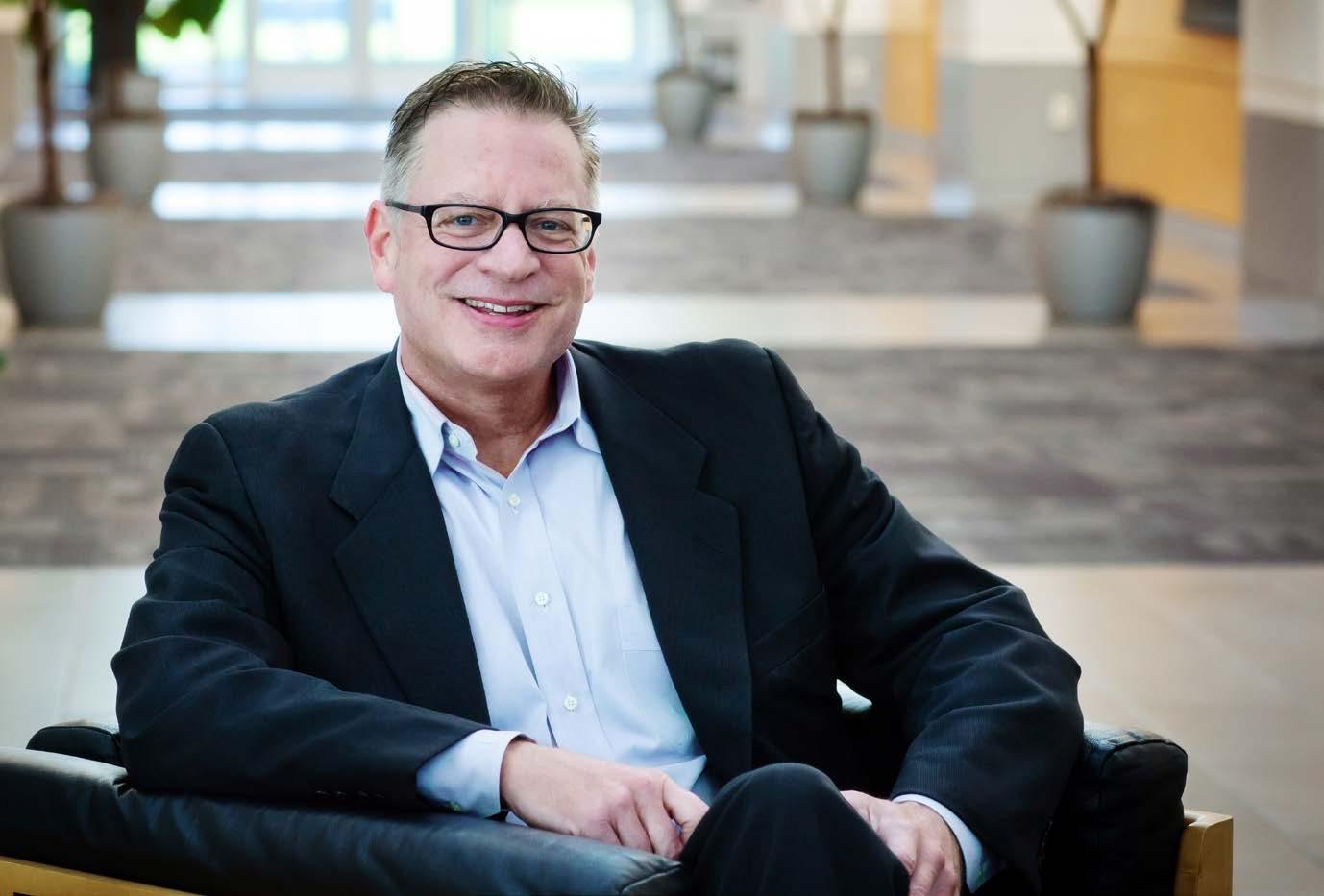
“We can’t just be observers. We have to be regular participants who contribute to the conversation.”
Dave Wall Global Legal Counsel Volvo Trucks
WHEN VOLVO TRUCKS’ SENIOR MANAGEMENT FIRST directed its legal department to begin participating in management meetings, Dave Wall, global legal counsel, was skeptical. As one of two attorneys stationed in North America responsible for nearly all back-end activities of the company’s business— which includes the Volvo and Mack truck brands— he was concerned that the meetings wouldn’t make the best use of the time required to support three hundred internal clients and colleagues within other legal functions.
Wall quickly realized that developing closer cross-functional relationships and gaining a deeper understanding of company operations actually makes the legal department more efficient. That’s because it can be involved in a wide variety of projects and issues earlier, and proactively identify and avoid risks before they become problems.
“I’ve accumulated a lot of institutional knowledge during my time with the company, but I’m now a firm believer that the legal function has to have a seat at the table at all levels of management and operations,” he says. “And we can’t just be observers. We have to be regular participants who contribute to the conversation.”
Being embedded in operations has normalized interactions with the business and encouraged questions that might never have been asked in the past, he says. For example, the supplier quality assessment department wanted to know whether images of suppliers’ production line personnel, taken as part of vendor audits, are considered personal data and raise legal concerns under the European General Data Protection Regulation. The question illustrated a deep understanding of nuanced legal concepts that resulted from the training the legal department had provided.
As a team member, Wall has benefited from better perspectives and insights into decision-making processes and project execution. He points to his involvement in Volvo’s development of electromobility in California, from which he was able to draw connections to an earlier 2014 project and to ongoing European R&D. He also gained a better understanding of infrastructure requirements, like the proximity of charging stations to California’s ports and the types of trucks best suited to the project.

“Because I get directly involved with business, technology, and operations people, I’ve been able to gain a broader perspective of the different activities Volvo is involved in and how they directly and indirectly impact each other,” Wall explains.
He was able use this to the company’s advantage when he worked with various global stakeholders to negotiate a collaboration agreement with FedEx for a partnership to develop platooning. This is a strategy that uses cooperative adaptive cruise control—a wireless vehicle-to-vehicle communication technology—that reduces reaction times to traffic conditions and enables multiple trucks manned with professional drivers to travel closer together than normal. The results are reduced drag, improved fuel efficiency, and overall greener operation for the platooned vehicles.
“Having been involved with the sales teams, I know what an important customer FedEx is,” Wall says. “I definitely took that into account when I considered how to approach important issues like liability terms and IP provisions as part of our agreement.”
Now that he works more closely with the business, Wall has seen the value in providing guidelines on how to request support from the legal department. His team has created an easy-to-read, practical set of instructions about the appropriate legal resources to contact for specific types of issues along with checklists of items that are required to proceed. Wall expects this will streamline requests for support and avoid duplication of efforts from both clients and attorneys.
Wall says that the continuous learning and crossculture collaboration that result from being embedded in the business have been two of the most influential factors in his success at Volvo. He believes that both create opportunities for exposure to new strategies and to develop new personal and professional skill sets.
To help illustrate, he points to the differences between the Americans’ hard-charging, individualfocused priority to get things done quickly, and the Swedes’ more time-consuming consensus-based, collaborative approach. “Both approaches have a place in achieving our organization’s short- and long- term objectives, and in understanding the cultural dynamics that help me execute those objectives more effectively,” he says. “The more tactics you have at your disposal, the better prepared you are for whatever issue you might be facing.”
Hannah Lim-Johnson has helped Kelly Services reconfigure its external partnerships with moremotivating payment structures and a greater level of inclusion that has led to innovation
By Olivia N. Castañeda
WHEN HANNAH LIM-JOHNSON CAME aboard as the new senior vice president and chief legal officer for Kelly Services in September 2017, she was immediately given an ambitious project: rethinking the company’s external legal partners and how Kelly works with them. The task was part of Kelly Services’ internal initiative focused on finding ways to make the company more effective and efficient, and to tackle it, Lim-Johnson spent her first ninety days evaluating what changes were needed and seeking potential areas for growth. Her resulting moves have not only impacted how Kelly Services’ outside counsel are paid but how diverse they are as a group.
To kick things off, Lim-Johnson worked with the company’s procure -
ment department to create a request for proposal (RFP), the first objective of which was to establish an annual flatfee arrangement with potential external partners. Lim-Johnson believes such an arrangement will make Kelly Services’ external partners more invested in helping the company achieve its goals, rather than just maintaining a service relationship through which they can bill for more hours. “We want law firms that we’re partnering with to have skin in the game,” Lim-Johnson says. When she was in private practice herself, she recalls, she would only get a snapshot of what was happening within the companies she did work for. It wasn’t until going in-house that she was able to see how significantly one litiga-
Kevin Fritz Labor & Employment Attorney Seyfarth Shaw
Hannah Lim-Johnson SVP and Chief Legal Officer Kelly Services
tion case can impact a corporation. She believes a flat-fee arrangement will help Kelly Services’ outside counsel become more efficient and invest in gap-filling and training, which will help reduce Kelly’s overall case count. “I am trying to replicate the in-house experience as much as possible for our external partners, where they are not looking at a snapshot but are actually walking with us in a true partnership,” Lim-Johnson says. “When a litigation matter impacts us, it impacts them as well.”
The second objective of the RFP was diversity and inclusion. “Diversity

is very important to Kelly as a firm, to work with diverse vendors and professionals who reflect the communities in which we live and work,” says Lim-Johnson. In the end, based on the firm’s diversity offerings, Kelly Services hired Seyfarth Shaw to handle its US labor and employment litigation and advice and counseling work. As a result, Kelly Services now works with a greater variety of outside attorneys, including Kevin Fritz, a Seyfarth lawyer with muscular dystrophy who devised a critical new technology, the Kelly Counseling Automation Tool, which he affectionately named KCAT.
Prior to the deployment of KCAT, in September 2018, to receive day-today legal advice at Kelly Services, an employee would have to internally submit a question to a paralegal, who would then send it to Seyfarth Shaw, where the query would be assigned to one member of an internal counseling group, based on question type. One of the individuals would then have to volunteer, draft a possible solution, have it reviewed and approved, then send it back to a paralegal at Kelly, who would ultimately shepherd it on to the person who made the initial request. KCAT allows Kelly Services to get advice out to its employees at a rapid rate and in a streamlined, organized fashion without having to route questions through numerous employees.
“Simply stated, KCAT provides an automated way for Kelly employees to submit requests for legal advice,” says Fritz, who brought the tool to life in six short weeks. “It presents as a straightforward logic-based system and cuts out all the redirects and pain points that slow things down. KCAT is really a culmination of the way that I live my life. Because of my physical disability,
“We want law firms that we’re partnering with to have skin in the game.”
—Hannah Lim-Johnson
my muscles are weak. Whenever I do something in my job or in my own life, I am thinking of ways to exert less physical energy while still delivering the same results. KCAT provides just that: less exertion of energy for the same great results.”
Kelly Services considers Kevin an invaluable partner. “If we didn’t have Kevin on our team, we would have never been able to realize the benefits of the automation tool,” Lim-Johnson says.
Looking ahead, KCAT is expected to decrease by 50 percent the time spent fielding questions from Kelly Services’ employees across the country. And, it will capture trends while delivering consistent advice to help lower risk. It’s just one of many benefits the company is enjoying after rethinking its external partnerships to achieve a better payment structure and promote diversity.
“I am really glad that Kelly Services is able to reap the benefits of this innovation, and I’m very proud to be a partner of Kelly’s,” Fritz says. “The company does a great job of supporting, appreciating, and recognizing people from all backgrounds, which is great for business all around.”
Shaw LLP congratulates Hannah Lim-Johnson, SVP & Chief Legal Officer of Kelly Services, on her outstanding professional achievements.
By Lori Fredrickson
VSE’s Thomas Kiernan wants others to understand that leading good teams means sharing and listening to different perspectives while staying humble
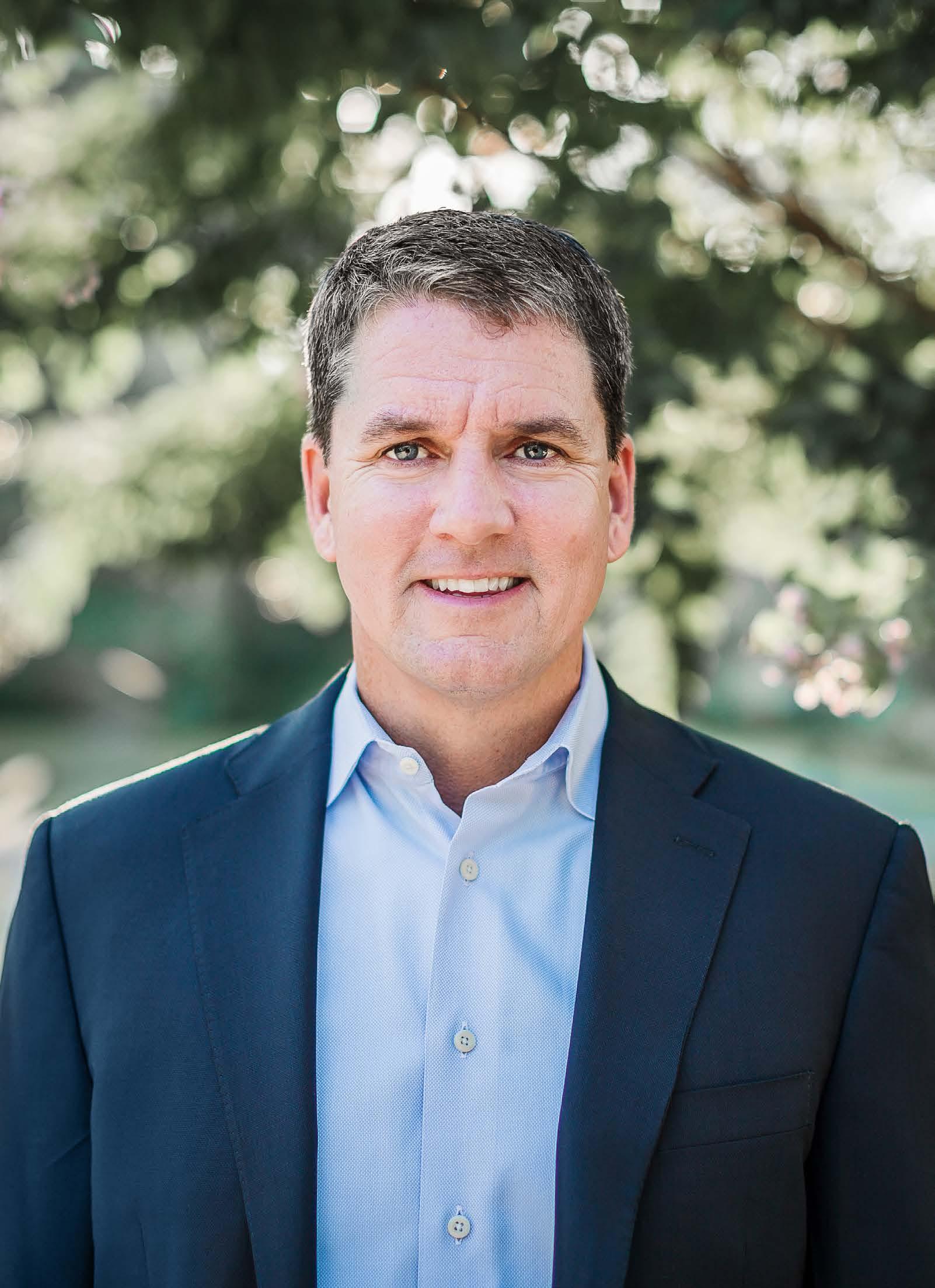
VP and General Counsel
and he raised five sons whose own teams he coached over the years. So, he understands well that being part of a winning team requires the ability to build trust by listening to others and understanding their different personalities and perspectives, and how they can be directed toward a common goal. It’s a philosophy he has brought into his legal work as well, particularly in his current role as the vice president and general counsel at VSE Corporation.
“There are parallels in the corporate world because we each have different roles but ultimately we’re all trying to create value for the greater good,” Kiernan says. “Both in sports and in real life, as long as you can get everyone focused on a common goal, the whole team will be more successful.”
This idea has been particularly relevant over the course of his time at VSE, which he joined ten years ago as its first in-house counsel. Kiernan had reached out to the relatively small, publicly traded company after having spent several years in a similar role for Intelsat, and he was hired not long after to oversee SEC compliance and provide counsel for leadership of the company. Coordinating with three different group presidents, with three separate lines of business, he has often focused on building relationships in order to work well together. “We have a unique company, in that we don’t have silos; the group presidents are aligned and not competitive with each other,” Kiernan says. “I’ve tried to foster that existing culture and that teamwork approach.”
Kiernan only learned the term “emotional intelligence” recently, but he says he has long relied on the skill—both with his own teammates and with his opposition—to foster VSE’s team culture. Focusing on his empathy for others has helped him work closely with various groups to ensure that they’re aligned in managing concerns related to third-party disputes, business operations, compliance and ethics, and human resources. “Acting with integrity and understanding different perspectives has given me the courage to discuss difficult issues and share advice,” he says.
“Acting with integrity and understanding different perspectives has given me the courage to discuss difficult issues and share advice.”
He’s also focused on taking this approach to work out some of the company’s thornier matters, including the resolution of issues with third parties and insurance carriers to avoid protracted litigation to resolve disputes through negotiations. “You have time to establish long relationships with people you work with, but negotiating with an external party with whom you don’t have a preexisting relationship can be more challenging,” Kiernan says.
He cites one particularly difficult case with a former government client with whom VSE was resolving a dispute. When researching the opposing

side, he found some reasons that it would be interested in coming to a swift resolution. “I’ve found it to be more effective to show my cards a little bit, so I explain my position, explain what I think is their position, and see how we can get to a mutually agreeable solution,” Kiernan says. Rather than continue with meetings between his team and the team of the opposing counsel, he invited the other side’s deputy general counsel out for coffee. Over a series of five personal meetings, after developing a level of trust, they were able to facilitate a resolution that worked in both sides’ interests.
Taking a personal and empathetic approach is something Kiernan has not only made a part of his own work philosophy but also tried to pass on to others. He supports VSE’s Leadership Program, which was founded by the CEO several years ago. In addition to connecting younger leaders with executives, the program includes strategy teams that connect staff members across different divisions in the company, enabling them to get to know one another, and it also includes former members who have participated in the program to support the new leaders in developing corporate initiatives.
Kiernan has also personally mentored a number of young leaders, and one of the things he stresses most is that they should work to be respected on a peer-wide level. “I try to focus them to look at the big picture,” Kiernan says. “It’s important to support each other and make a good impression on your peers as opposed to managing up. If you’re respected among your peers, you’re going to be respected by the senior management team.”
By coaching others to be self-aware, to connect with one another, and to be conscious of being inclusive, Kiernan continues to help develop strong new leaders in the company who he knows will support its values. “Connecting, building trust, and communicating are very important attributes,” he says. “It’s a combination of staying humble while being courageous and self-confident. I’ve found that people gravitate to strong but humble leaders.”
Jackson Lewis P.C. congratulates Tom Kiernan on his recognition by Modern Counsel. We are honored to have been chosen by Tom as VSE Corporation’s Labor & Employment outside counsel.
With competition stiff in the makeup and hair-care market, Sally Beauty Holdings, Inc. has undertaken a cost-reduction plan and new initiatives to keep the company viable and open new opportunities
By Roland Archer
ALTHOUGH SOME MIGHT ARGUE THAT beauty is only skin deep, it’s also big business, and in order to stay competitive in the marketplace, it can take major financial decisions to keep a brand afloat and viable. That’s why Sally Beauty Holdings, Inc., the Denton, Texas-based retailer and distributor of beauty products, is rethinking where its money will go.
In April 2018, the company announced a cost-reduction plan designed to help finance long-term growth initiatives by implementing organizational efficiencies, sourcing product and brands for resale, and rethinking inventory management. Two months later, the company announced the launch of Sally Beauty Cultivate—For Women by Women, a business accelerator program to help female beauty entrepreneurs grow their business.
“We continue to be inspired by all of the terrific women entrepreneurs we
have met over the years and believe in supporting women who are developing products to make her best accessory, her hair, even better,” said Carrie McDermott, president of Sally Beauty, in a statement.
Sally Beauty’s formal restructuring plan is expected to cost about $30 million up front but then generate annual benefits of up to $15 million, which will be reinvested to support strategic initiatives. Benefits will also be reinvested in market-competitive store wages, accelerated technology investments, e-commerce growth, better visibility of store-level inventory, and various initiatives to strengthen the company’s business in both the US and Canadian markets. Sally Beauty president and CEO Chris Brickman says these initiatives will help maintain the company’s profitability and fund investments such as Sally Beauty Cultivate to help transform the business.
As part of that program, Sally Beauty will accept entries from female-owned hair-care brands that want to expand their business. The top brand will receive $25,000 in financial support, product distribution at SallyBeauty.com, and mentorship from the Sally Beauty team as well as some of the brand’s famous business owners. It will also receive the opportunity to have the product put directly into the hands of high-demand beauty influencers at one of Sally Beauty’s monthly influencer events.
“We believe there is so much haircare innovation happening every day in women’s homes, salons, and communities, and we want to encourage that innovation to thrive and grow,” McDermott said in a statement.
Sally Beauty has a storied history of supporting female-owned haircare businesses, given that nearly one in three of its sales has supported brands created or owned by women.
Sally Beauty was also the first national
beauty retailer to provide distribution to popular female-owned hair-care brands including Made Beautiful, Mielle Organics, the Mane Choice, and Arctic Fox. Beyond that, Sally Beauty was the first to launch an exclusive ingredient range with Carol’s Daughter, called the Pracaxi Nectar Collection. In each of these cases, the distribution support provided to these brands helped their businesses grow and achieve the national prominence they enjoy today.
It’s these kinds of efforts that have kept Sally Beauty a constant in the beauty and hair-care market, and they’re an important part of why the corporate restructuring was necessary, to keep the company in a viable position in the marketplace— particularly now that competition in the beauty segment has grown considerably.
“Similar to how our Beauty Systems Group segment is the color and education destination for the professional stylist, Sally’s primary goal is to have every customer feel confident in her ability to color and care for her own hair, and we will tailor our assortment, service, and education to ensure we are her go-to store for that purpose,” Brickman said in a prepared statement.



LeClairRyan:
“Jen is an outstanding attorney, but what impresses me most is the impact she has on all those who work with her. Her professionalism and geniality are infectious. This is the mark of a true leader.” —Daniel P. Elliott, Partner
Vice President and Associate General Counsel of Sally Beauty Holdings, Inc., on her feature in Modern Counsel. It is our privilege to partner with Jen and her team at Sally Beauty.
© 2018 LeClairRyan. All rights reserved. Congratulations to our client and friend


Connell Foley LLP is pleased to support our good friend and client Jennifer Ingram, Esq., and commends her exemplary leadership and dedication as Vice President and Associate General Counsel of Sally Beauty Holdings, Inc.


Matthew S. Schultz Partner
Connell Foley LLP One Newark Center 1085 Raymond Blvd., 19th Floor Newark, NJ 07102 www.connellfoley.com
In partnerships with Genivity and SpringFour, BMO Harris Bank is taking a targeted, specific approach to help its customers gain a better understanding of their finances
By Roland Archer
A LITTLE BIT OF MENTORING CAN GO A long way for a start-up company, and a startup’s business ideas can go a long way to sustaining a large company, as BMO Harris Bank is demonstrating.
In August 2018, BMO announced partnerships with two Chicago-based tech start-ups, Genivity and SpringFour, in an effort to provide more specific solutions to certain customers. Genivity is an artificial-intelligence software platform that can help advisors work with clients through life stages and care-cost planning, while SpringFour developed a financial wellness platform to improve payment performance and reduce payment delinquencies.
Genivity won an award in 2017 as part of the BMO Harris/1871 FinTech Partnership program—which provides mentorship tracks to start-ups—thanks
to the company’s financial planning software tool, which helps wealth advisors have healthcare discussions with clients and estimate future long-term healthcare costs. The software will be unveiled via a rollout with BMO Wealth Management's US business in the Hinsdale and Barrington suburbs of Chicago, as well as in Naples and Sarasota, Florida.
“With Genivity’s platform, our team of advisors will not only be able to better prepare our clients in this area, but also manage the risks that come with planning for unforeseen circumstances,” said Darrel Hackett, president of BMO Wealth Management US, in a statement.
SpringFour’s technology platform helps customers who are facing financial difficulties connect with trusted local, state, and national resources. The com-
We are proud to collaborate with Christy and the BMO Harris team. Her legal talent, team leadership, and corporate citizenry inspires us all.

Charlotte
Salt Lake City
San Francisco
Washington, DC AttorneyAdvertisingMaterial.
pany’s platform can be navigated with a simple search by zip code, and provides people with various resources in their respective area. BMO Harris customers will have access to SpringFour’s resources through the bank’s website.
“We are excited to take a step forward in enhancing the level of financial support we offer our customers by leveraging SpringFour’s resources,” said Ernie Johannson, head of the US Personal and Business Banking Group for BMO, in a statement. “We are committed to aiding customers in their journey to achieve and sustain financial stability.”
The partnerships are an example of the work BMO is doing not only to provide improved, more direct solutions to its customers, but also of doing so in a way that embraces multiple platforms. Such partnerships wouldn’t be possible without the bank’s legal department, including Christy DeMott, BMO’s associate general counsel and vice president, who provides strategic legal advice for consumer and small business deposit and lending products services—including online and mobile banking initiatives.
BMO’s partnerships with both Genivity and SpringFour were not forged at random, but rather out of a mentoring relationship to help both start-ups gain better footing in the financial world.
In an interview with Crain’s Chicago Business , Heather Holmes, CEO of Genivity, says the mentorship program provided a different entry point into the financial sector than other pilot programs might.
“It’s the difference between having a demo day and rolling up your sleeves and wanting to bring innovation into your company,” she said. “Our mentors

at BMO recruited other mentors. It was the opportunity to get direct feedback from a large enterprise customer. BMO had people assigned to us who wanted to make sure we got the support we needed.”
In the same Crain’s Chicago Business piece, Howard Tullman, a former CEO of 1871 and an investor in Genivity, said the mentorship program is a valuable tool to give start-ups a chance for long-term success.
“Once the C-level guys say, ‘Do something,’ it still doesn’t happen unless they identify a business unit within their companies and some line— not staff—people who will work to actually implement something that helps both sides,” he said. “Small wins to start, but with real P&L consequences and benefits. If you don’t get someone inside as your champion, who actually has some skin in the game and a career interest in seeing the project succeed, then you won’t be going anywhere.”
L. Scott Askins wants to see more women in corporate leadership positions, and Kabbage has provided her a culture in which to take real action in pursuit of her goals
By Joan Livingston
THE NUMBER OF WOMEN IN CORPO
rate leadership remains disappointingly low. According to a recent report from the Center for American Progress, they occupy just 25 percent of positions for executive- and senior-level officials and managers at companies in the S&P 500. When it comes to the board seats of those companies, they occupy only 20 percent, and when it comes to CEO positions, they occupy only 6 percent. L. Scott Askins wants to see those numbers change, and when she got a call about a job offer from Rob Frohwein, CEO and cofounder of Kabbage, Inc., she saw her chance to be involved with a company making more of an impact.
At the time, Askins had been working as general counsel for Premiere Global Services, Inc. (PGi) for twelve years and was helping the collaboration software and services company go private. Before that, she’d helped WebMD, the
online health information provider, file to go public. Kabbage, though, a fintech company with a platform providing small businesses access to working capital, not only represented an opportunity for her to push her skill set in a new sector; it also had a team and a mission that aligned well with her values.
For one, Kabbage’s president and one of its cofounders is a woman, Kathryn Petralia. For another, there is a significant number of women on its executive team. And then there’s Kabbage’s primary objective to empower entrepreneurs, many of them women- and minority-owned small businesses, in making a significant leap through access to capital. “A large percentage of small businesses are started by women,” Askins says. “Small businesses fuel economies across the globe, and Kabbage makes it easier for them to access the capital required to grow.”





MICHELLE COHEN, Partner

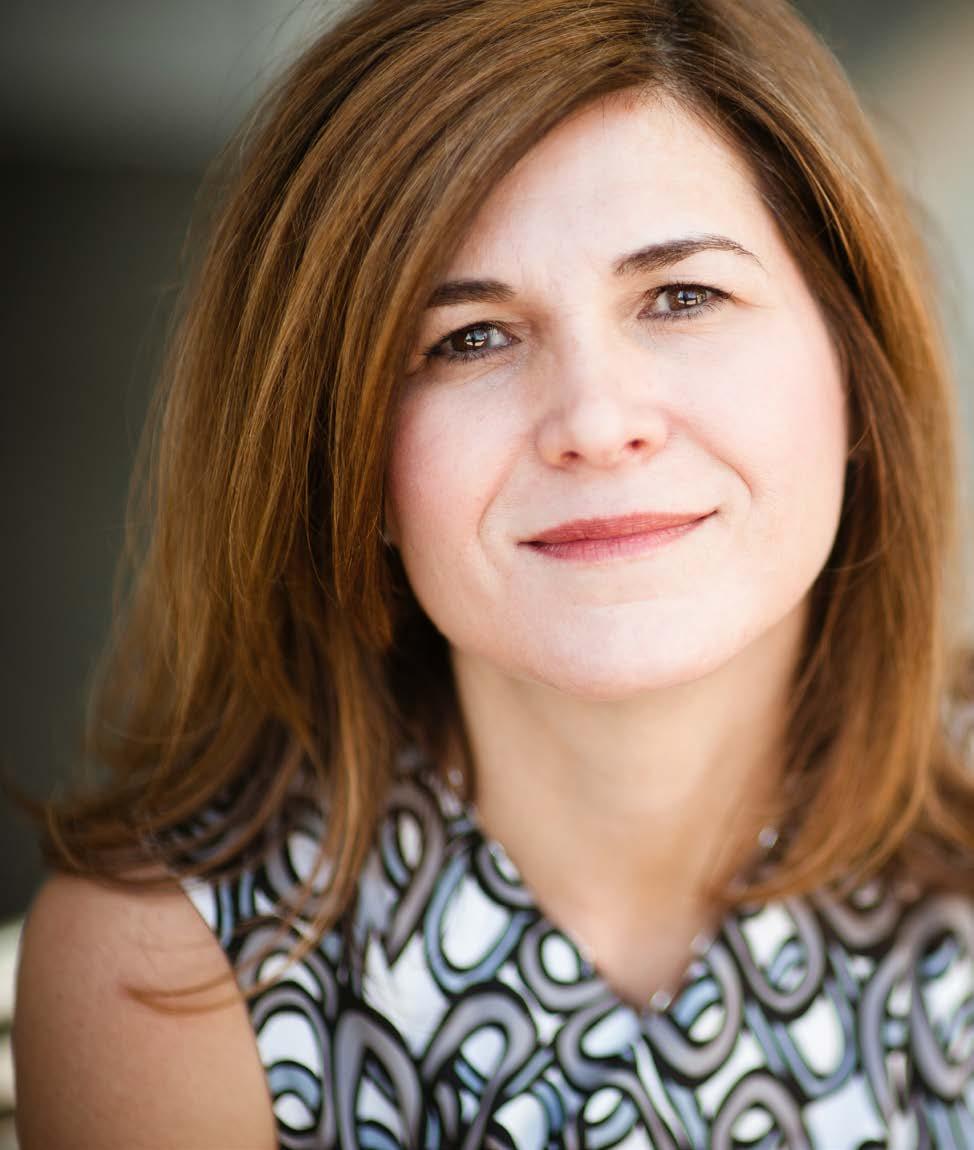
L. Scott Askins Head of Legal & Compliance

Askins took the job and has since been with Kabbage for about two and a half years, overseeing legal and compliance matters company-wide from its Atlanta headquarters. Her eight-member team works closely with Kabbage’s policy team to ensure transparency with regulatory authorities. Askins considers herself a business-practical attorney who explores all angles of an issue and how it might impact the company. The attitude stems from her time studying finance and accounting at Clemson University before attending law school at the University of South Carolina and at New York University, where she also earned an LLM in taxation. “I like the art of a deal, if it’s a strategic deal for the company,” she says.
Kabbage’s growth doesn’t surprise Askins, who says the company is serving an underserved market. The company’s platform works with an FDIC-insured bank to allow small businesses to access lines of credit up to $250,000 and take the exact amount of capital they need, when they need it. Additionally, 95 percent of its clients have a fully automated experience, with applications completed online within minutes via proprietary credit models utilizing machine learning to analyze business performance, not just credit scores. “We’re taking the human bias out of traditional small-business lending,” Askins says.
Askins speaks highly of the male mentors who gave her opportunities early on at WebMD and PGi—“They didn’t treat me any differently, and they expected the same from me as from my
male counterparts,” she says—but she’s still pleased to work in Kabbage’s corporate culture today. She’s excited about the diverse perspectives, experiences, and backgrounds the company brings together and the thoughtful outcomes they produce. “It serves for a more robust debate about things,” she says. “I really appreciate that we have that here.” It also means Kabbage does more to amplify a variety of voices. For instance, the company celebrates National Women’s Small Business Month, in October, by providing online content to assist entrepreneurs, including numerous profiles of womenowned small businesses.
Personally, as a firm believer that women must advocate not only for themselves but for others, Askins participates in in-house women’s groups, which network about a variety of legal issues. She’s also involved in OnBoard, a Georgia nonprofit working to increase the number of women on executive boards. “The more women you have in the C-suite means more opportunities for women,” she says.
While corporate advancements for women are happening, Askins feels the pace is still slower than it should be. She thinks of her nine-year-old daughter. “I don’t want her to be in a position like I was, where you are looking around the boardroom but you aren’t seeing anything but white males,” she says. “That isn’t reality. That’s not representative of what our country’s demographics look like.”
With her help, it’s not what boardrooms will look like, either.
By Valerie Menard
Assistant general counsel Keith Scott seeks trial lawyers with skill and experience in the courtroom as outside counsel for Exide Technologies
AFTER WORKING AS IN-HOUSE COUNSEL at Owens Corning and Rollins, Inc. for twenty-two years, Keith Scott had a finely honed idea of what makes a trial lawyer excel in the courtroom, and that’s what led him to become Exide Technologies’ assistant general counsel of litigation and compliance, in 2017. The company, a global manufacturer of batteries for multiple applications, had filed for bankruptcy in 2013 and hired Scott to turn around its approach to litigation. He decided to take a leap of faith and accept the role.
“Exide wanted someone who’d seen it all, from high-volume mass torts to high-stakes class actions and commercial litigation,” Scott says. “They hired me to impose greater discipline on our internal processes and sharpen our strategic focus all the way through trial.”
His philosophies surrounding best practices for trial attorneys have been brewing in his head since childhood, before he even knew he wanted to be a lawyer. Growing up in southern Florida, he was impressed by prominent trial lawyers such as Gerry Spence and Richard “Racehorse” Haynes, who he saw interviewed on 60 Minutes . He also admired military figures such as generals Grant and Patton, who could block out the noise of battle and find clarity. “I enjoy a good fight,” Scott says. “Good trial lawyers filter out the noise, too. They get to the heart of a case, and then they do something more subtle: they add nuance and storytelling. They know how to persuade, how to win a jury's heart before they win their minds. When I saw it all come together in court, I knew that’s where I wanted to be.”
He saw these traits in Jack Scarola, a lawyer he met while in law school at
Keith Scott Assistant General Counsel of Litigation & Compliance
Emory University, working as a clerk at the law firm of Searcy Denney Scarola Barnhart & Shipley. “He was extremely disciplined but also very creative,” Scott says. “And, he approached a case like a bulldog; he didn’t let go.”
Scott and a paralegal work in-house for Exide Technologies, and a pool of outside counsel round out its litigation team. Scott is tasked with hiring the outside counsel, and their ability to try a case is the key factor in his decision-making. He’s been particularly impressed by Dan Gerber, of Rumberger Kirk & Caldwell, for the unassailable credibility he brings to the courtroom, and by Mike Davis, of Sidley Austin LLP, for his uncanny knack for staying several steps ahead of his adversaries. “I’ve seen lawyers from all over the country, and I’m
fascinated how each takes a different approach,” Scott says. “I’ve learned from what they do and share their strengths with everyone else, particularly those two.”
Demonstrated excellence in a trial lawyer is also critical to his ability to evaluate a case. If he hands a case to outside counsel, he wants to be confident of the outcome. “If you know what a good trial lawyer can do with your case, then you can envision what it'll look like after the court enters a final judgment and you'll know how to evaluate it,” Scott says.
He also wants lawyers who are “joined at the hip” with Exide and can help it build on its successes in compliance. He works with different departments at Exide to understand the business and stay ahead of the law. “If


Rumberger, Kirk & Caldwell
is proud to recognize Keith Scott
Assistant General Counsel Exide Technologies for his Professionalism Partnership and Results



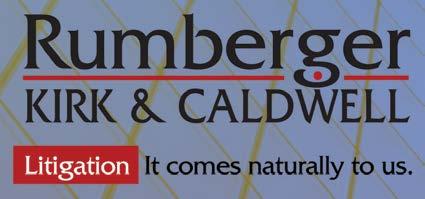


“You will never be a good trial lawyer unless you try cases as a young lawyer. It teaches you what matters to a judge and jury.”
all a lawyer does is recite regulations, he or she is not much help to the company,” he says. “You must understand the business like the back of your hand.”
Looking ahead, Scott believes that finding good trial lawyers will continue to be a challenge, largely because law firms keep young lawyers from the courtroom. “You should become a partner because you can try a case, not the other way around,” he says.
He advises young lawyers to find mentors who will let them try cases as soon and as much as possible. “You will never be a good trial lawyer unless you try cases as a young lawyer,” he says. “It teaches you what matters to a judge and jury, which, if you're trying a case, is all that matters.”
By Lori Fredrickson
Amgen’s Cynthia Patton knows that building a team of strong leaders starts with empowering them to lead

CYNTHIA PATTON HAS NEVER BEEN A BIG FAN OF hand-holding. As Amgen’s senior vice president and chief compliance officer, she says that micromanaging team members leads to missed opportunities in terms of discovering capabilities and empowering staff members to excel.
“From a corporate perspective, successful delegation helps identify future leaders,” Patton says. “Delegation, done correctly, gives an individual the confidence to use his or her own decision-making skills, and I can watch how they navigate complicated situations.”
Patton first joined Amgen, an international biopharmaceutical corporation headquartered in California, as associate general counsel, in 2005, following several years as a healthcare attorney. In 2012, she was promoted to her current role as chief compliance officer. Although she immediately fell in love with the challenges of the new role, she also discovered that her staff was struggling with decision-making—something she immediately set out to fix.
“It was very important to me that my team be agile,” Patton says. “A global company like Amgen faces many complicated risk issues. We need people to understand the business and show maturity and nimbleness when navigating complex challenges.”
From the outset, she made it a point to stress that team members needed to own their decisions. She made herself available to help and support them with particularly thorny situations, but she pushed back if they tried to get her to solve the problem for them. “I’d ask them what they would do instead, and as I suspected, the solutions they brought to me were just as good as anything I could have come up with on my own,” Patton says. “I also don’t tell them what I would have done. This way, they are more invested in the solution because it was their own idea and they know I trust them.”
She also makes sure her team understands that it’s okay to challenge her and push back. This encourages her team members to grow, gain confidence, and think proactively about finding better solutions, and it cultivates among them a culture of confidently pushing back against the status quo. For example, when Amgen’s head of investigations was building her team, she developed an entirely new model that


Cynthia Patton SVP and Chief Compliance Officer Amgen

we listen. We are a law firm that leads with our ears. We hear your concerns. We understand your business. Then we act.
“One of the best mechanisms to determine who your leaders are is to observe who will take delegation and actually run with it.”
Patton concedes she never would have considered. “It’s a model that the rest of the compliance organization has started to use as they develop their own teams,” she says.
Outside counsel engaged by Amgen attest to the company’s commitment to compliance. “Ropes & Gray values the partnership we have established with Cynthia Patton and her team at Amgen,” says Tim McCrystal, a partner and cochair of the healthcare practice at Ropes & Gray. “We look forward to continuing to serve as a resource for compliance-related matters and other key legal issues, and to working with Cynthia to support Amgen’s global ethics and compliance program.”
Patton says that giving staff ownership and seeing how they run with it also provides significant value in succession planning—and not just in her department. “One of the best mechanisms to determine who your leaders are is to observe who will take delegation and actually run with it,” she says. “That leadership capability and talent can be deployed in other areas of the company, and the more compliance-trained staff that can go on to roles in other parts of the company, the better it is for Amgen.”
In addition to her work cultivating her team, Patton is a board member for a number of healthcare and educational organizations. She has long been pas-
sionate about healthcare and access to quality education for the underserved, and she’s happy to apply to such causes the knowledge that she’s gained through her work at Amgen and her years of practicing law. Moreover, she’s proud to be a mentor to many both inside and outside of Amgen.
“I’ve had great success at the top of the team, but the bigger reward is getting others there,” she says. “It’s also important for me to be a mentor for women and other diverse individuals—and to help them understand the expectations of leadership. At Amgen, I have a unique seat at the table; it’s wasted if I don’t use it to help others.”
Ropes & Gray:
Ropes & Gray values our longstanding relationship with leading global biotechnology company Amgen. As compliance counsel to Amgen, we provide ongoing support and advice to senior vice president and chief compliance officer Cynthia Patton as well as to the compliance committee of Amgen’s board of directors. We advise on matters relating to Amgen’s compliance program and related functions and activities, including policies and procedures, training, and monitoring and auditing, among other areas.
DLA Piper: “DLA Piper is proud to work with Amgen and Cynthia Patton—a tremendous lawyer, chief compliance officer, and friend. We congratulate Cynthia and her team for building an outstanding compliance program.”
—John Rah, Partner

By Lori Fredrickson
At Puget Sound Energy, Kendall Cammermeyer knows that developing women in leadership roles means recognizing internal talent first
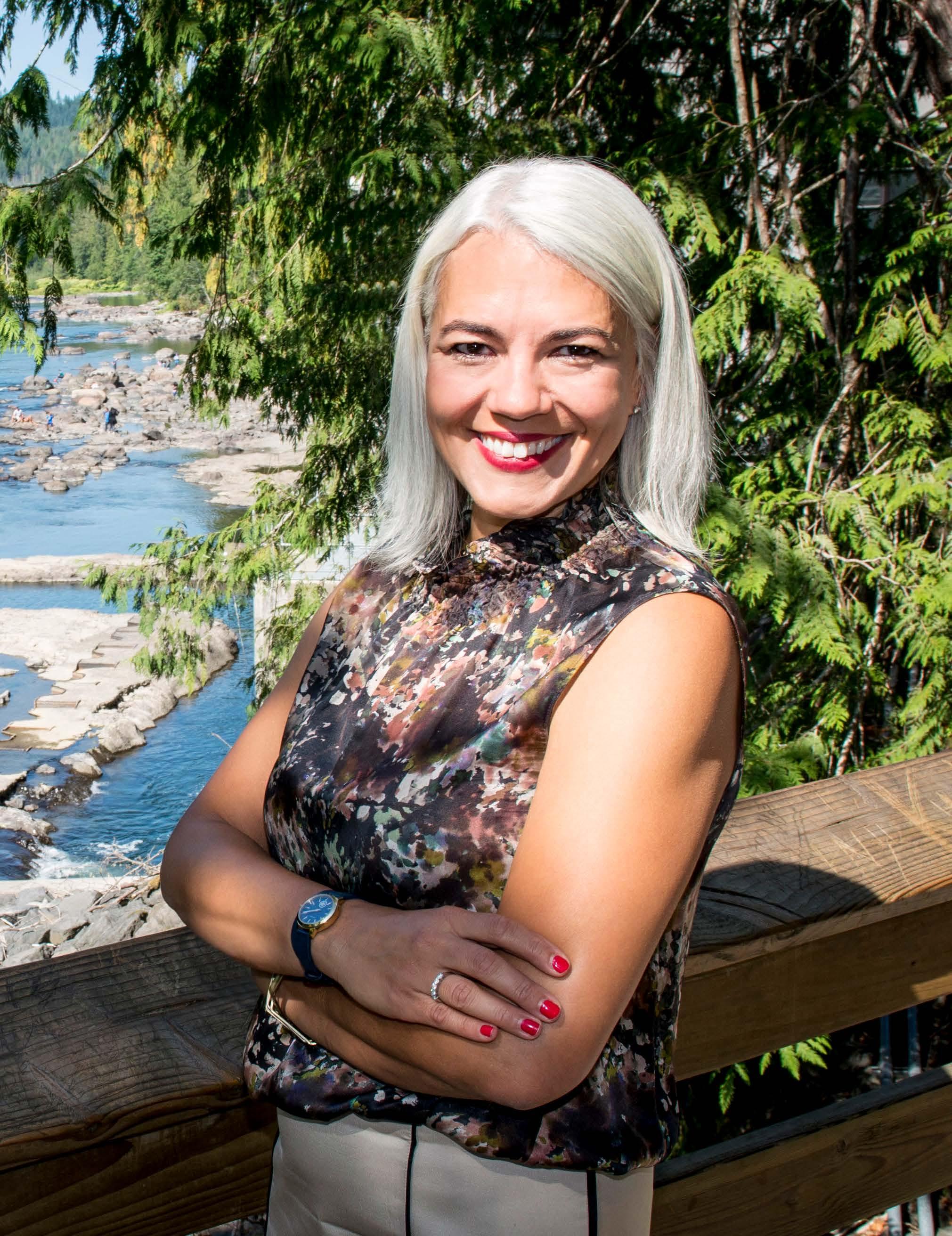
Kendall Cammermeyer Director and Assistant General Counsel
AN UNUSUAL LEADERSHIP TEAM IN THE PACIFIC Northwest is setting a new precedent in the energy and utilities sector across the United States. Puget Sound Energy (PSE), based in Bellevue, Washington, has struck an equal balance in the number of men and women at the helm—a remarkable fifty-fifty ratio in an industry historically dominated by men. Yet the equilibrium wasn’t born out of an effort to promote gender diversity, according to Kendall Cammermeyer. The director and assistant general counsel points out that it was the result of identifying and promoting talent.
“It wasn’t something that we said we need to do because of women; we looked at the top talent in the room, and the talent in the room was women,” Cammermeyer says. “It’s about people who have the potential and are recognized as those who can lead the organization to the next level.”
That approach resulted in the diverse leadership team that inspired Cammermeyer to join PSE in 2003 as corporate counsel. She had been looking for an in-house role after years of working with regulatory issues at firms such as Stoel Rives. Cammermeyer was drawn to PSE after hearing good things about its then general counsel, a woman known for being a strong mentor and employee advocate.
Now Cammermeyer is paying it forward by using her fifteen years of experience at PSE to create more opportunities for others at the company. Guided by the support of the company’s leadership, she set out to take on employee empowerment. She recalls one conversation in particular in 2015, when she met with colleagues to discuss succession planning and ways to develop talent for some of the more technical roles.
The result? Cammermeyer’s new initiative at PSE, the Women in Leadership program. “We saw an opportunity to be more intentional in our efforts to cultivate talent and skill sets of aspiring women leaders and thought that if we were to focus our attention on operations, we might be able to help business initiatives also succeed,” Cammermeyer says. “The goal was to have high-potential women leaders in those areas help others to exercise different skill sets and support them in getting opportunities and establishing contacts.”
Having previously received professional coaching opportunities, Cammermeyer and her colleagues opted to make the initiative employee-driven and led by five
female directors. They launched the program through a number of speaking engagements, including one event sponsored by the company’s president and CEO, featuring the well-known author Tara Mohr.
Then they received input from employees about what information might be most helpful, including focus groups with women from other operational areas. With that feedback, they expanded the program by adding training on different leadership competencies such as managerial courage, strategic agility, and networking and mentorship opportunities.
“We’re approaching it from the perspective that strong leadership benefits from gender diversity and drives PSE’s business success,” Cammermeyer says. “With the mentoring program, we’re trying to be deliberate about creating opportunities for women who have already made strides in their career here to help mentor other women who are interested in pursuing their career, either here or at a different company.”
Early on, Cammermeyer focused on making trust a cornerstone of her mentorship style that she now applies on a larger scale through the company-wide Women in Leadership program. “It’s about giving people opportunities to succeed and also creating a space for failure,” Cammermeyer says. “You’re creating a support network, and you’re also creating a place to make and learn from mistakes, which is a necessary part of development.”
Part of the reason why the launch was so successful, Cammermeyer adds, was because of that culture of trust throughout PSE. “Our atmosphere of doing what’s right, that we have each other’s back and we all have a voice, fosters a culture that embraces trust relationships,” Cammermeyer says. “When we succeed, it’s because we have a high-functioning level of trust. And it’s because of that trust that we felt empowered to move forward.”
Since its launch, the Women in Leadership program has been well received across the company. It’s also attracted attention from other organizations in the industry that are interested in establishing similar efforts. Recently, members from the Women in Leadership team also met with other groups who are interested in getting their own programs off the ground.
“People are excited about it, and they want to know how to engage with it and support it,” Cammermeyer says. “It’s not just looking at what we can do to support women leaders, but also what we can do to support
directors and management to identify talent and support an environment that cultivates its aspiring women leaders.”
For Cammermeyer and her fellow program directors, the process of creating the program within the company has been a uniquely rewarding experience. “None of us are experts in coaching, but we know our culture and we are steeped in it,” Cammermeyer says. “We’ve been able to learn from our own experiences in order to help others at the company.”
As the program moves into its fourth year, the Women in Leadership initiative has become a meaningful effort that is outside her day job as a lawyer, and it’s one that she embraces at PSE. “It’s something that I’m completely excited about because it’s moving the company’s vision forward,” Cammermeyer says. “It’s helped me to tap into my passions, and one of my passions is supporting others and developing others to do their best work.”

Gordon Tilden Thomas Cordell isfirst and last - a trial practice firm. We prepare every matter, from the beginning, on the assumption it will be tried to verdict. All of our partners are experienced trial lawyers; among them are two Fellows of the American College of Trial Lawyers and a Member of the American Board of Trial Advocates. Viewing the case through the lens of trial positions our clients for success, whether the case is ultimately tried or resolved via creative approaches to settlement.
Davis Wright Tremaine LLP: “Kendall successfully navigates the challenges of a complex, regulated industry with style and skill. We at Davis Wright Tremaine look forward to a continued partnership with Kendall and Puget Sound Energy.”
—Kelsey Sheldon, Partner
Gordon Tilden Thomas & Cordell LLP: “PSE faces myriad legal issues in a highly regulated and complex landscape. Kendall’s mastery of this constantly evolving arena is remarkable. As outside litigation counsel for PSE, we benefit greatly from Kendall’s expertise and judgment.”
—Jeffrey M. Thomas, Partner
GTTC is recognized as a leading firm in the Pacific Northwest in complex business litigation, insurance recovery, and high-stakes personal injury litigation.
600 University Street Suite 2915 Seattle, WA 98101
www.gordontilden.com 206-467-6477
HEATHER STERN SIGNED ON AS WHOLE Foods Market’s general counsel just months before the grocery chain was acquired by Amazon in 2017. It seemed fortuitous. Years ago, Heather Stern and her brother were eating at the multinational supermarket chain when she mentioned she would love to work for the multibillion-dollar organic product company. He responded that it would never happen. Why? “Because no one ever leaves,” she recalls. When Stern defied the odds and scored the role of general counsel and global vice president of legal affairs, in 2017, she saw that he was right: she never wants to leave.
“This is a comfortable, special place to work,” Stern says. “People can be themselves, work hard, and have their own personality. When someone starts a new job, they often say it takes a long time before they feel like they’re not new anymore. I stopped feeling new very quickly.”
That mind-set prepared her to dive in headfirst when she arrived in April 2017. On her first day, an activist investor took a large share of the Whole Foods Market stock. Not long after, the company welcomed five new board members. And, that August, Amazon acquired Whole Foods Market for $13.7 billion. For the first-time general counsel, it was an incredible opportunity for her company’s growth and her own professional development.
By Randall Colburn
How Whole Foods Market’s Heather Stern is embracing the legal challenge of a major merger and the importance of a warm, collaborative culture
“It was very challenging,” Stern says. “It was a lot of very high-profile, complex work for any general counsel. Being someone who was new to the role and new to the company, it was a lot all at once to take in.” The legal leader values the ability to adapt and adjust with her personal mantra, “Run toward the chaos,” which she cites when navigating a fast-paced environment.
Prior to her arrival at Whole Foods Market, Stern had served in the legal department at Office Depot since 2005. There, she led the commercial litigation team and helped close a merger with OfficeMax in 2013, which transformed the company into a multibillion-dollar office supply retailer. Before going in-house, she worked as a labor and employment lawyer at Kilpatrick Townsend & Stockton LLP and clerked for the 11th Circuit of the US Court of Appeals in Atlanta. Since Stern first earned her JD from the University of Georgia School of Law, she has cultivated a legal career built for change.
“When things get difficult or scary, run toward it,” Stern says. “That’s how you’ll grow as a lawyer, team member, and person—and it’s how you’ll advance in your career. Raise your hand when someone asks, ‘Who’s willing to do it?’”
Today at Whole Foods Market, Stern oversees transactions, intellectual property, employment law, litigation, governance, and compliance, as well as risk management and claims. She’s also working closely with members of Amazon’s legal team to help facilitate the integration process between the companies. “It’s an added benefit to have additional people to work with,” she says. “They’ve been very supportive of us. We’ve been learning from them and we think they’ve also been learning from us.”
The merger has also had an impact on Stern’s continued efforts to roll out updated compliance training, policies, and procedures. While several of Amazon’s compliance initiatives are being integrated, so too are efforts that Stern was spearheading even before the merger. The goal is to build a cohesive compliance training program, including illuminating the Whole Foods Mar-
ket’s code of business conduct, which is the subject of a recently launched online training program. Stern and her team have also taken over the company’s compliance hotline.
As more initiatives become necessary due to Europe’s GDPR data protection regulations, Stern is working to ensure the Whole Foods Market team stays informed without becoming overwhelmed. “I think the job of any legal team is to continuously monitor how the company is doing with its compliance efforts and that our team members are given the right level of compliance training,” she says. “In other words, we don’t want to overburden anyone, but we also need to make sure the right amount of training is in place.”
Stern is also implementing a number of efficiencies to help ease the company into the future, namely by bringing a few different functions under the legal department’s umbrella. That includes Whole Foods Market’s employment work, which was previously handled in the company’s regions throughout the United States. Similarly, Stern’s team is also taking on loss prevention and safety—functions that previously lived in retail operations and in the regions. Not only do these efforts create economies of scale, but they also help ensure consistency and open up opportunities for standardization.
“There’s not a dull day,” says Stern, noting that she retains a hands-on approach when it comes to working with her team. “At some companies, the general counsel sits away from her team. Here, I’m with my team and have lots of interaction with them.”
The result is exposure to all the different successes, challenges, and peculiarities to pass through the team, according to Stern. “I’m glad I
“When things get difficult or scary, run toward it. That’s how you’ll grow as a lawyer, team member, and person.”

Pirkey Barber is one of the largest firms in the United States exclusively practicing in the fields of trademark, copyright, and unfair competition law. Congratulations to our friend Heather Stern of Whole Foods Market for this well-deserved recognition of her leadership and accomplishments.
Greenberg Traurig is proud of Heather Stern for her leadership, commitment, and vision as General Counsel and Global
w. pirkeybarber.com

airs of Whole Foods. We wish you continued success and are grateful for your partnership.
– Your friends at Greenberg Traurig
Greenberg Traurig understands and embraces the moral, legal, and business case for diversity, and since our inception, we have built an inclusive firm that is focused on delivering efficiency in value and legal services in a diverse world.



have interesting, varied work, because, for a lot of lawyers, their work can end up becoming a routine,” she says.
Stern also describes her role as a “thought partner” with the business itself. It coincides with her vision of developing legal as a tool to look at the bigger picture of the company. “Here, working in-house is selling groceries,” she says. “If you’re a litigator, your job isn’t to try cases, it’s to sell groceries. Every decision that we make has to be an evaluation of risk or an effort to move the ball forward for the business. Otherwise, we’re just a hindrance.”
Ultimately, she explains, her team’s mission is to help the business do what it needs to do, so as lawyers, her team must do everything it can to support that goal, regardless of each individual role on the team. “Be partners; be business friendly,” she says. “And help them move forward with their goals.”
Greenberg Traurig, LLP:
“Congratulations to our colleague, Heather Stern, on this recognition. She leads with energy, dedication, and vision each day. We are proud to work with her and her team and look forward to our continued partnership.”
—Gregory J. Casas, Administrative Shareholder of the Austin office
Taking a microscope to unique niches, specialties, regions, and regulations in the legal field and the high-profile lawyers who confidently and expertly navigate them
Modern Counsel got to speak with five women in trial law in the Fortune 500 whose leadership extends beyond the courtroom through philanthropy, mentorship, diversity and inclusion initiatives, and more

BELIEF IN EMPATHY AND
By

Like so many American success stories, Viktoriya Torchinsky-Field’s began beyond the country’s borders—in her case, in Ukraine, when it was still part of the Soviet Union.
Born there in 1970, she found herself trapped, unable to thrive because of a system of strictures that denied her, others of Jewish heritage, and those of other persecuted religious and ethnic groups, the same rights and opportunities as the Russian majority. Many Soviet Jews sought to escape to the West, in the hopes of building a promising future. Initially, almost all Jews who applied for exit visas were denied. They came to be known as refuseniks, were seen as traitors, and were persecuted further, including losing educational and employment opportunities. By the early 1970s, though, more Jews had begun to receive exit visas, leading to three waves of emigration.
Torchinsky-Field was part of the last wave, in 1989. As a nineteen year old, with her country on the brink of collapse, she was forced to surrender her citizenship and leave her immediate family behind to emigrate. “I was stateless,” she says. “I did not belong anywhere. I did not have a passport from any country. I had a travel document that was literally a single piece of paper.”
As a refugee, she was taken to Austria and Italy, where for six months she lived in immigration camps, in rooms of five to seven people—all waiting for transport papers to a country that would grant them asylum. After being denied entry to the US and going through an appeal, she was finally admitted and arrived in the country at JFK, right before Thanksgiving. She landed in Baltimore, where, without her family, she had to rely on assistance from the government and nonprofits for support, financial and otherwise. While she had the freedom she had sought, she certainly didn’t imagine that she’d leverage her unique experience to one day become a senior lawyer for Cigna, a Fortune 100 company. And, she could not envision that such trying circumstances would positively influence how she leads today.
“I think of it as the worst of times and the best of times,” she says, looking back on her first years in the US. “I was really isolated, and although the Jewish community was welcoming and provided financial support, most of the key support was really provided by immigrants’ own families.”
She didn’t socialize much and instead concentrated on finding work and continuing her education. Her first job was waiting tables at a Pizza Hut, for $2.11 an hour, plus tips. “At one point, I had seven, nine, or more W-2s in one year, and I think I still qualified for the below-poverty-level, noincome-tax bracket,” she says.
That isolation proved a strange blessing, though, forcing her to quickly assimilate to her new culture, a task aided by the education she’d received in the USSR.
“The Soviet school system was providing a pretty stellar education, both in the sciences and in the humanities,” Torchinsky-Field says. “Although I had limited language skills, I did have a strong knowledge base, which got me through the door of many places. Employers, educators, and mentors were willing to look past the obvious limitations and took a chance.”
In addition to working full time, she enrolled at the University of Maryland and put herself on a track to go to dental school, thinking it would be a good profession that would fit her still developing English skills. This track,
Supporting innovators in the pursuit of excellence
We are proud to recognize Viktoriya Torchinsky-Field for her leadership and exceptional career.
Grateful for the help she has received, Viktoriya Torchinsky-Field is an active member of Cigna’s in-house volunteer program. She helped set up Cigna’s legal pro bono program in 2011, which has since expanded to include non-lawyer Cigna Legal employees. The group is involved in numerous projects, including:
• Notary work at a birth certificate clinic, helping homeless and mentally ill individuals who have lost their documentation. “This is important because they may be eligible for benefits but can’t access them without a birth certificate,” Torchinsky-Field says.
• Aid at the Senior Law Center, where Cigna legal employees assist with a bimonthly clinic to help low-income seniors write wills and other necessary legal documents.
• Collecting donations for Dress For Success, a nonprofit that provides wardrobes for women living in shelters who are trying to return to work. “I can personally vouch for the importance of looking presentable when going for an interview,” Torchinsky-Field says. “I once benefited from a social worker, a young woman close to my own age, who thought to bring me a bag of her own interviewworthy clothing.”
though practical, ignored her lifelong knack for argument and her passion for “being an advocate for a cause.” Along the way she met another college student with a thick accent who was on track to go to law school. “I thought, ‘Oh, my God, if he can do it, I can certainly do it,’” she says. So, she began adding courses and trying to understand the law school admissions process.
Because English was her second language and because she wasn’t used to standardized tests, her LSAT scores were far from competitive. After being turned down by about twenty schools on the first try, she expanded her outreach, looking for special programs that would place value on diverse backgrounds. She found The John Marshall Law School, in Chicago, which had a “conditional acceptance” program that allowed potential students to enroll in two summer classes. If they earned a B average in those classes, they were in. Five years after arriving in the US, TorchinskyField became a first-year law student. She quickly rose to the top 5 percent of her class, receiving “best in class” awards throughout law school, publishing in and managing the John Marshall Law Review, and eventually securing a job with a top firm. “In setting up the program, the school recognized that value of providing the opportunity—by recognizing that there are talented people who may not fit the standard criteria but will flourish if given the chance and the support,” Torchinsky-Field says. “It goes to show that it pays to take chances and be receptive to candidates whose path is unconventional.”
For a decade after school, Torchinsky-Field honed her skills as a litigator with national law firms, before joining Cigna in 2008. As her responsibilities at Cigna have expanded, she has found that her experiences as an immigrant who built an authentic life for herself in the US continue to influence her leadership approach every day. “I try to see the whole picture with people, and I understand that not everyone’s path is linear,” she says. “The world is not binary; it is, rather, very complex, like a prism. Depending on the angle, the view might be different. But everyone has a story worth hearing.”
Today, Torchinsky-Field is associate chief counsel of litigation for Cigna, reporting to executive leadership and overseeing a ten-person team of lawyers and paralegals who defend the company in decisions regarding healthcare, disability, and life and accident benefits; in government investigations; and in class-action lawsuits. She speaks flawless, accentless English and does not stand out as
Torchinsky-Field
Associate Chief Counsel of Litigation




WITH MY TEAM,
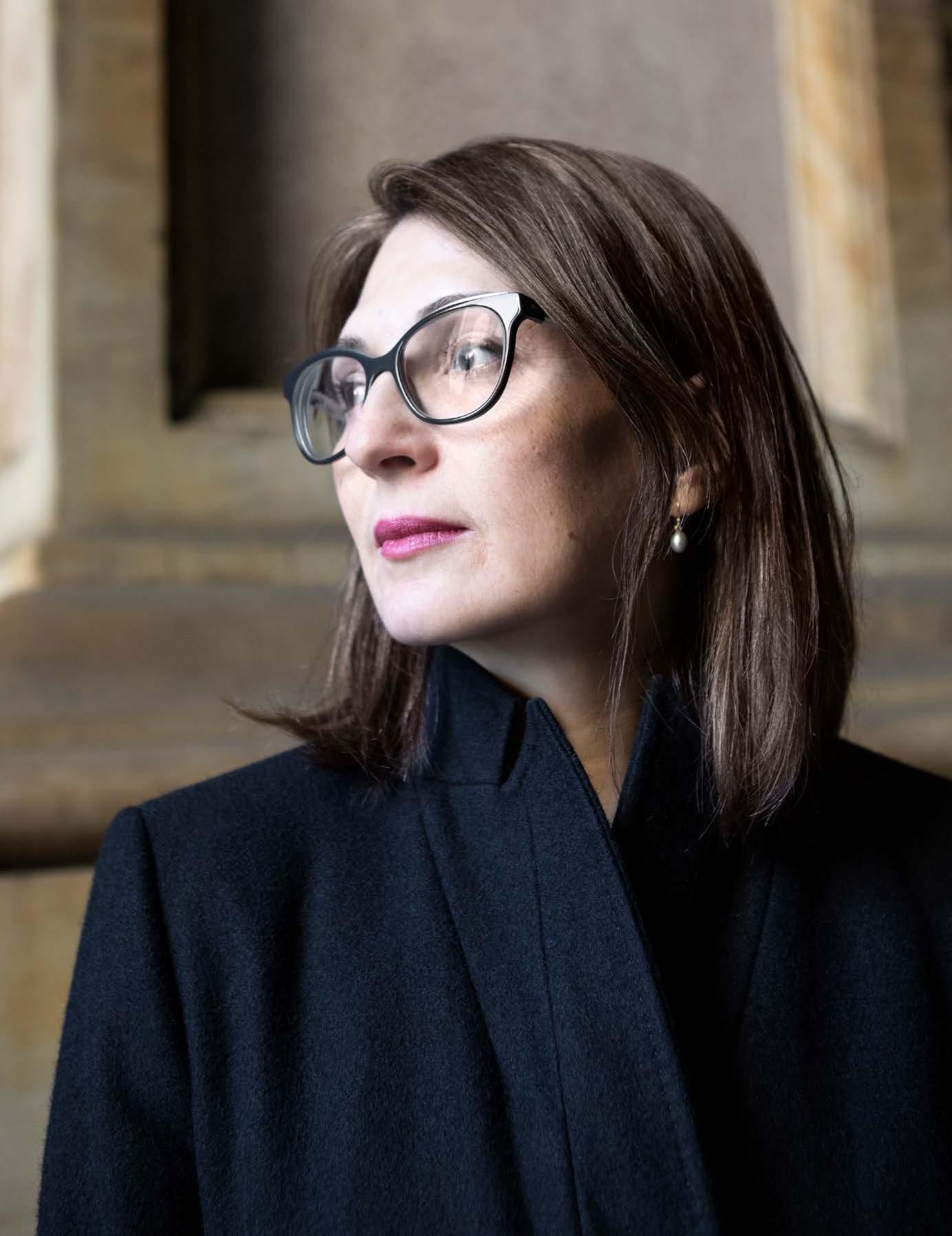
AND I UNDERSTAND THAT NOT EVERYONE’S PATH IS LINEAR.”
someone who arrived in the US as a refugee, but her experiences as a young adult still inform her daily interactions with her internal team and outside counsel. She believes in the fundamental value of diversity—and its clear impact on the bottom line. “I’m convinced that diverse teams are likely more successful because the diversity of perspective results in creative thinking and innovative approaches,” she says. “Especially in litigation, where the difference between a win and a loss is sometimes razor thin, groupthink is unhelpful. Instead, I push myself and encourage my team to think outside-the-box.”
A related principal lesson drawn from her past is the importance of maintaining open channels of communication while providing honest, constructive feedback and developing empathy for others. “That was one of the many lessons from my immigration story and my time flailing about like a blind puppy: more than anything, advice and feedback is valuable,” she says. “Make sure it’s received as intended, make no assumptions or character judgments, give people the benefit of the doubt, and give people room to grow. You have to know the person you’re leading.”
Torchinsky-Field’s leadership style hasn’t gone unnoticed by the outside counsel who work with her, either. “After I completed an engagement, Viktoriya asked me to lunch and requested my feedback,” says Caitlin Piccarello Strauss, a litigation partner with Saul Ewing Arnstein & Lehr. “Clients don’t often solicit such feedback from me. Viktoriya made me feel comfortable sharing ideas that will be implemented going forward.”
“Viktoriya isn’t just a great litigator; she’s a great business lawyer,” Kirkland & Ellis litigation partner Josh Simon adds. “She has an incredible ability to focus on the key issues and build consensus around the right solutions.”
Her adaptable, empathetic approach is also ideal for work in an industry as dynamic as healthcare, where laws and regulations and policy are constantly changing, and it gives her and her team an edge in the courtroom, too. “By carefully observing and analyzing each situation and our opponents’ decision-makers, I try to develop an appreciation for the other side’s motivation and likely objectives,” she says. This finely tuned ability to read her adversaries has helped her reach unlikely and unorthodox courtroom wins and settlements she might not otherwise have been able to game out.
Torchinsky-Field has also remained committed to providing others the type of help she has received. “I always
Kirkland & Ellis LLP is a 2,200-attorney law firm representing global clients such as Cigna in complex litigation, dispute resolution and arbitration; M&A, private equity, and other corporate transactions; restructuring; and intellectual property matters. The firm has fourteen offices around the world, in Beijing, Boston, Chicago, Dallas, Hong Kong, Houston, London, Los Angeles, Munich, New York, Palo Alto, San Francisco, Shanghai, and Washington, DC.
Kirkland’s renowned litigation practice includes trials and dispute resolution, government, regulatory and internal investigations, and US Supreme Court cases. Its diverse team of more than 500 litigators delivers consistent results and has been recognized and commended by The American Lawyer, Chambers , Benchmark Litigation, The National Law Journal, and many other publications. The firm is able to offer clients a deep bench of lawyers who have been taking cases to verdict since the early stages of their careers. Whether in the courtroom, at the bargaining table, or by helping clients avoid risks without litigation, Kirkland has a long and proven track record of generating successful results for clients in their most high-stakes cases. The firm prides itself on having lawyers across all practice areas who work together as an integrated, multidisciplinary team to provide seamless service with a focus on practical, commonsense problem-solving.
The Insurance Practice Group at Saul Ewing Arnstein & Lehr, LLP counsels and represents insurers, reinsurers, and other insurance industry professionals and participants, including Cigna, on issues and challenges inherent in the business of insurance. The group counsels health insurers in product development and approval matters, regulatory compliance, privacy and cybersecurity practices, and other consumer-focused matters. It represents health, benefit, and life insurers in individual and class challenges to policy sale, policy administration, and claim administration practices in state and federal courts in many jurisdictions. It regularly handles litigation and counseling under various consumer-protection statutes, including ERISA and HIPAA as well as state statutory and common law claims. It advises insurers in their dealings with state regulators and, when necessary, in contested proceedings with or in front of those regulators. And, it routinely provides guidance to boards of directors on compliance with fiduciary obligations. Insurance Practice Group members are active in and help lead various insurance industry organizations and provide thought leadership on emerging industry issues and opportunities such as insurtech. Some of its members come from the industry or from state regulators, and its alumni are actively sought for industry law departments and various regulatory positions.
look after new people,” she says. “I really make it a point to take them out to lunch, welcome them, show them the ropes.” She’s also part of the internal diversity and inclusion initiative at Cigna and was on the women’s committee of her bar association when she still worked in private practice. “I think about what a difference it made to have people take chances on me, even though I may not have fit perfectly into the job or program requirements,” she says.
As Torchinsky-Field’s management responsibilities have increased and Cigna’s business environment has evolved, she has also turned to organizational psychology to assist her in achieving her personal and organizational goals while remaining true to her core values. “There is a lot of research that informs us about what works in a business setting, where teams of people are working together—where there is some hierarchy and yet a cooperative and collaborative approach to reaching goals,” Torchinsky-Field says.
She also takes wisdom from Cigna’s Leadership Colloquia series, which invites thought leaders from various disciplines to present to the company’s leaders, and overall she’s pleased to be part of a company that puts such an emphasis on learning and growing. “The general counsel and my manager, who reports to general counsel, are both intellectually curious and empathetic leaders,” Torchinsky-Field says. “I’ve been more successful in the last five years—in terms of coming into my own as a manager and, frankly, as a complete person—in large part because of the environment and opportunities here.”
Looking ahead, Torchinsky-Field hopes others from outside the US continue to get the chances she got, so that one day they might succeed as she has, and she will continue to do all she can to help from her position at Cigna. “In the current climate, we’ve changed how we view the value of immigrants,” she says. “I don’t understand it, I don’t accept it, and I think there’s not just a political and legal component to it but a moral component. As a lawyer, I believe I’m obligated to pay attention.”
Morgan Lewis:
“Viktoriya combines a deep and technical understanding of the legal and regulatory challenges facing her industry with dynamic people skills. Morgan Lewis is pleased to collaborate with Cigna and Viktoriya to further the growth of the global health-services company.”
—Jeremy Blumenfeld, Cochair of Morgan Lewis’s ERISA Litigation Practice
WilmerHale:
“Viktoriya possesses a leadership style that many of us in the legal profession should pause to consider carefully. It is at once thoughtful and inclusive of many views on an issue, yet always goal directed.”
—Jonathan Yarowsky, Partner
Morgan Lewis joins Modern Counsel in recognizing the


At Morgan Lewis, we collaborate with our clients and with one another. We work around the clock and around the world—always ready, always on—to respond to the needs of our clients and craft powerful legal business solutions for them.







Linda
Patricia
Nicole Y. Blohm
Anna M. Martin
Jason A. James


Kirkl and & Ellis congratulates our friend Viktoriya Torchinsky-Field for this well-deserved tribute.
Fantastic to work with and universally regarded as a thought leader, Viktoriya is more than a superb litigator, she is an amazing business lawyer.

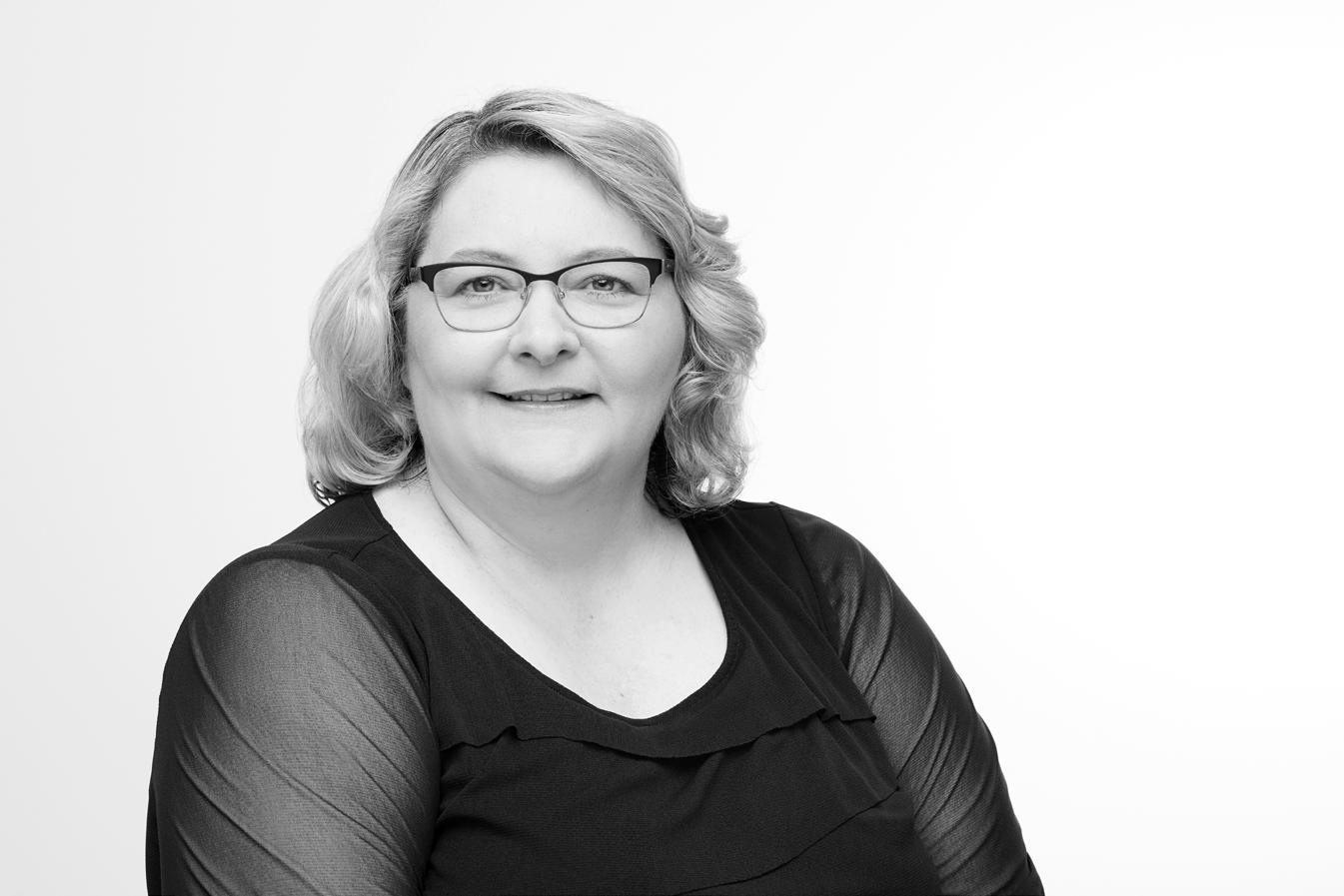
Betty Tierney Associate General Counsel of Litigation
Now in a leadership position at Macy’s, Betty Tierney is passing her passion for litigation down to a new generation of lawyers and training them to better operate on their own
“I was a reluctant leader for many years,” Betty Tierney says. “I guess I always thought of myself as a litigator first.”
Today, though, she serves comfortably as Macy’s associate general counsel of litigation, a position in which she oversees a team of ten attorneys, five paralegals, and four administrative positions while managing a full caseload. Getting to that point took a lot of self-discovery as a litigator, and Tierney now wants pave a smoother road for others, so she’s working to create a safer avenue at Macy’s for young lawyers to cut their own teeth as litigators.
It was the opportunity to “actively litigate” that first drew Tierney herself to an in-house position, at the May Department Stores Company, in 1992. (May eventually merged with Macy’s in 2005.) “There’s a battle for billable hours at a firm, so a lot of the good work goes to the senior partners and associates,” she
By Randall Colburn
says, reflecting on her time at a law firm prior to joining the May Company.
In-house, she explains, there’s fewer bodies but plenty of work, thus allowing someone looking to gain more experience the opportunity to handle more challenging cases. “As a young lawyer, I was able to do more advanced work than I probably would have at the firm, where I was pretty much doing research all the time,” Tierney says. “When I came to the May Company, I had an argument before the Seventh Circuit within months. In-house, I was able to get a lot more experience much quicker.”
Though she was happy in the courtroom, the call to leadership was a persistent one. What finally swayed her was a desire to help prepare Macy’s next generation of litigators. “What really hit me when I took on the role was that we had an opportunity to make the team even stronger for the future,” she says. “I want to make sure that when I
leave, the team is ready, so my objective became to find a way to better train our less experienced attorneys.”
One of her solutions was to give those attorneys the chance to take first chair on big cases—but with the comfort of having a senior attorney at their side, in a backseat role. “Being a first chair in a trial is a weighty responsibility,” she says. “We want them to have that experience but to also have a safety net. They get the experience and responsibility, but if something unexpected happens, they also have someone there who can step up and help them resolve it.”
Tierney wishes this kind of arrangement had been in place when she was a young lawyer. Though she values the experiences she had assisting senior attorneys, she says it just “doesn’t make sense” to sit second chair when it’s your own case. It also doesn’t help prepare young lawyers for when they might find themselves on their own. “We litigate
AND PREPARED
ADDRESS ANY SITUATION THEY FACE.”
across the country for Macy’s,” Tierney says. “You have to stand on your own two feet when you’re on the road. If you're in a deposition or hearing in front of a judge in another state and things happen that are unique or unexpected, you have to rely on your own abilities and skills.”
This focus on the importance of autonomy extends beyond Tierney’s attorneys, too. She even invites the company’s paralegals to participate in hearings and arbitrations. “It’s important that they see why their work is so important,” she says, “and they need to see the cases on which they’ve worked from start to finish.”
This stems from Tierney’s belief that everyone in her department at Macy’s should “own their role” and “feel empowered.” The hope is that, by giving them this power, her staff will develop their own devotion to Macy’s and its desire for integrity above all else. “What’s the best thing for Macy’s?” is a question that Tierney consistently asks herself in her role, and it’s one she also pushes her team members to consider, especially when they’re on the road, without support. “Through my leadership of the team, they know to ask those questions and make them a focus,” she says. “When they decide how to proceed in a case, I want them to consider not just resolution but also whether or not it’s the right thing. Should we be pursuing this? Why or why not?”
If a team member’s decision turns out to be a mistake, Tierney makes sure to listen and understand why they made that particular choice. “I will always support you if you can justify the decision you made, and if it doesn’t turn out to be the right one, then we’ll figure out a way to resolve it,” she says. “But
nobody’s going to be in trouble because they made a wrong decision, so long as they have a legitimate and rational basis for the action.”
Such a gracious and constructive response also helps ensure that the team members feel in control of their own cases. “You want your people to feel empowered and prepared to address any situation they face,” Tierney says.
She may have been a reluctant leader early in her career, but today, Tierney’s impact is not only felt in the present moment but also foreseeable in Macy’s next generation of leaders. She doesn’t plan to retire for another ten years, but when the time comes, she will be able to feel confident that, due to her policies, her team will be more than ready to take the reins.
Schoeman Updike Kaufman & Gerber LLP:
“Betty Tierney is a true leader and embodies
We extend our heartfelt congratulations to our friend Betty for this
—David Ganz and Steven Gerber, Partners
Shutts & Bowen:
“I’ve had the privilege to work with Betty for over fifteen years, and not only is she a phenomenal lawyer but a good friend. I congratulate Betty on all her success and well-deserved recognition.”
—Sheila Cesarano, Partner




Schoeman Updike Kaufman & Gerber LLP represents clients ranging in size and scope, including Fortune 100 companies, governmental agencies and authorities, educational institutions, and privately held businesses. 551 Fifth Avenue New York, NY 10176 (212) 661-5030
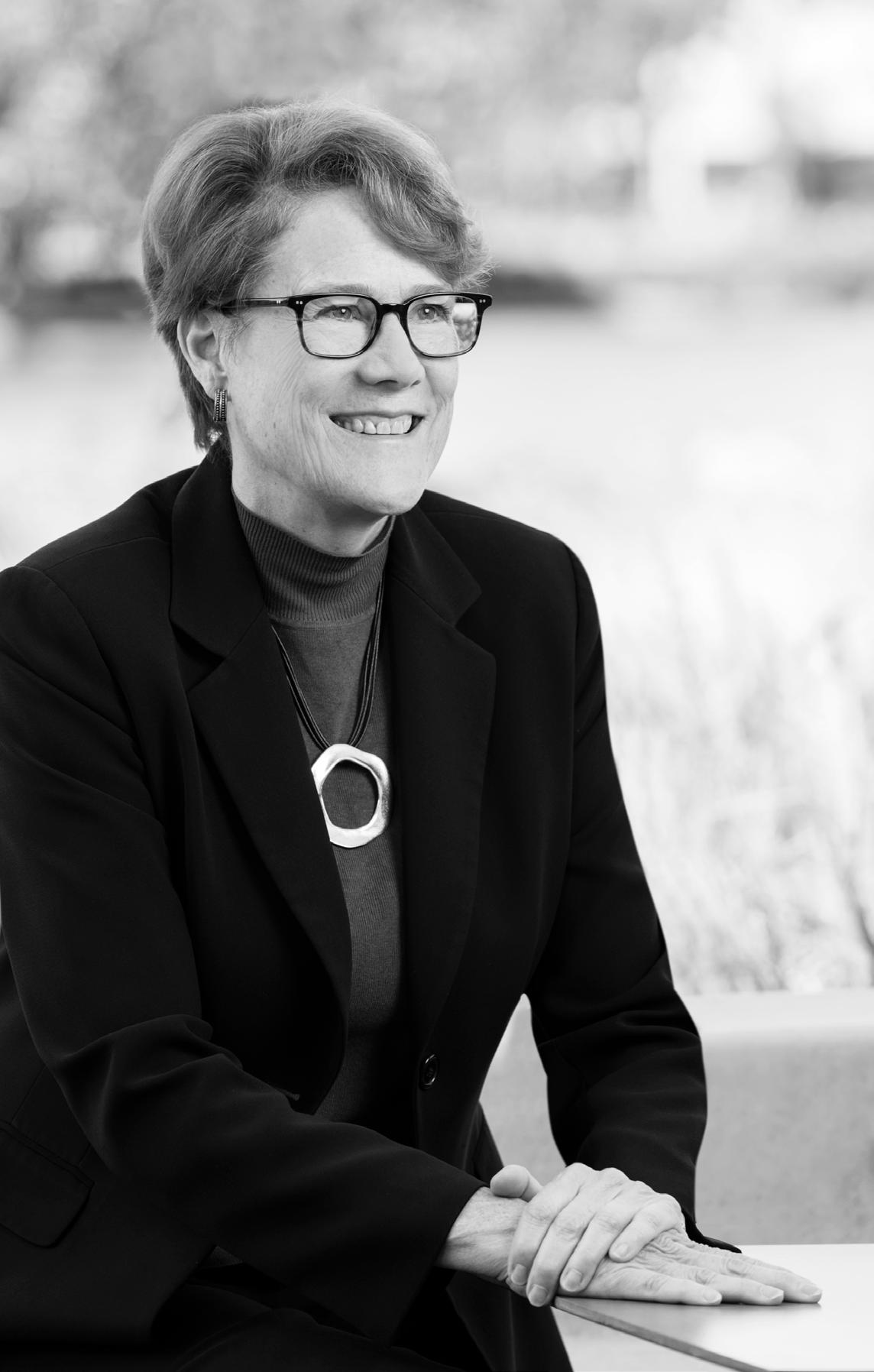
Patricia Thayer Senior Associate General Counsel of IP Litigation Gilead Sciences
After more than thirty years as a patent litigator at a number of prestigious law firms, Patricia Thayer is now helping Gilead Sciences manage its global patent disputes
By Bridgett Novak
It doesn’t take long, when talking to Patricia Thayer, for her to get around to mentioning what originally motivated her to become an attorney.
“My step-mother was a legal-services lawyer,” she says. “So, one summer during college, I worked in the legal-aid clinic with her. I really liked it. I was a do-gooder kid of the sixties and saw it as a nice way to help people. I also loved doing legal research.”
Not long after, she changed her premed/history of science focus at Harvard and eventually applied to law school. After graduating from Harvard Law in 1979, she found a way to merge her curious, analytical mind with her legal savvy by becoming a high-profile patent attorney.
Outside counsel who’ve worked with her have been impressed by her expertise. “Patty’s knowledge and experience in IP litigation is extensive, and she brings that to bear every day,” says Faye Paul, a partner at Bartlit Beck. “I have learned the most watching Patty deploy her unparalleled analytical skills to help her teams work through new arguments.”
“Patty’s unparalleled and extensive experience as a top IP litigator before she went in-house helps to make her an ideal client,” adds David Bassett, a partner with WilmerHale. “She brings impeccable intelligence, insight, and real-world judgment to bear on every issue.”
Here, Thayer shares some highlights of her career path and talks about her recent move in-house after years working for private firms.
How did you decide to focus on patent law?
It was total serendipity. Patent law wasn’t offered at Harvard in the seventies, so I didn’t even know what it was. While in New York interviewing for jobs, I picked up a friend’s copy of the National Association of Law Placement’s Directory of Legal Employers. Fish & Neave’s blurb talked about working on cases for Alexander Graham Bell and the Wright Brothers. I couldn’t believe there was a field of law where I wouldn’t have to give up my science background. So, I went to their office and handed my resume to the hiring partner.
It’s obviously been a good fit.
That’s an understatement. It was daunting at first, because I had a lot to learn. I had taken my last science course in 1976, and this was 1984. A lot had changed, including the foundations of the biotech industry. As a result, I got to deal with some monumental discoveries, like monoclonal antibodies. I couldn’t believe I was getting paid to learn such cutting-edge stuff. Within a year, I was working on a trial before the International Trade Commission.
In 1999, you became the cochair of the IP litigation group at Heller Ehrman. That must’ve been an exciting time.
It was a dream job. The firm was already a leader in patent litigation for high-tech firms, but I was hired to help develop their life sciences practice.
After Heller, you continued to work in life sciences IP at Orrick and Sidley. Why did you decide to go in-house in early 2017?
I wasn’t thinking about moving, but Gilead had just created a new position to supervise global IP litigation. I respected the company and their head of IP and knew she would help me bridge the chasm between what I did and didn’t know. It seemed like a great opportunity.
Has it been?
More than I imagined. I can’t believe that after so many years at this, I am still getting to learn new things and grow. I currently have matters going on in China, Europe, South America, Canada, and the Cayman Islands, and each jurisdiction has unique patent requirements.
Gilead Gives Back
In addition to her IP work, Patricia Thayer has helped launch a company-wide pro bono program at Gilead Sciences. Here she offers a few sound bites on how it has come together.
• “My first job after graduating law school was at the Center for Law in the Public Interest. I’ve always believed that we have a duty to help those who can’t afford legal services.”
• “When I got to Gilead, one of the IP attorneys was already providing free assistance to victims of domestic violence. We are now partnering with San Mateo County Legal Services and other organizations to provide an array of services. We work with Kids in Need of Defense (KIND) to help unaccompanied immigrant children. We’re also helping veterans understand and apply for benefits.”
• “We don’t get job credit for the work, like you do in a law firm, but Gilead gives us a small budget to cover court expenses, etc. So far, about thirty employees are participating—and not just lawyers. It’s a privilege to be able to help people who otherwise wouldn’t have legal services— and to have the support of the company is especially gratifying.”
Gilead partner Bartlit Beck has achieved an unparalleled record of courtroom victories in complex litigation since its founding in 1993. The firm’s success stems from an approach to trying cases that is fundamentally different from that of most firms that handle comparable matters: it is a firm of trial lawyers, not litigators. Bartlit Beck’s lawyers are in court examining witnesses and arguing to judges and juries on a regular basis.
Bartlit Beck’s thriving intellectual property practice covers a variety of technologies—from pharmaceutical products such as Gilead’s breakthrough hepatitis C treatments to cutting-edge jet engine design—and the firm regularly tries such cases to verdict.
Bartlit Beck’s trial teams are highly experienced, not just at the top but throughout. Cases are staffed with multiple partners, one to two associates, and a handful of dedicated senior staff members. Each trial team is composed primarily of experienced partners with hands-on control over the strategy and development of the case, and every team member is engaged to provide maximum value to the firm’s clients. Although not every case goes to trial, Bartlit Beck firmly believes its clients get the best settlements when the opposition is convinced the Bartlit Beck team is not afraid to try the case.
“EVERYONE
WHEN IT COMES TO BOTH
THE LEGAL AND SCIENTIFIC
Is that what you like most about moving in-house?
I also get to participate in complex business decisions about healthcare pricing, product innovations, market entries, etc. None of that touched me before. I just handled the lawsuits I was hired to work on, and the clients determined when we settled—or not. And, I love working with super-intelligent scientists who are developing life-saving products.
Do you require new hires to have a background in science? They don’t need to have a PhD, but they do need to be familiar with the basic areas we deal with and be able to understand complicated scientific papers. For instance, we just purchased a company that launched a new cancer therapy, so we all had to do a crash course in immunology. There isn’t much time to get up to speed, so everyone has to hit the ground running when it comes to both the legal and scientific demands of the job. Our lawyers work on many matters simultaneously, so we also rely heavily on our outside counsel. We’re fortunate to partner with some amazing firms, including WilmerHale, Bartlit Beck, and Fish & Richardson. I’m so impressed with the integrity and intelligence of their lawyers. We couldn’t do what we do without them.
What are some of the other differences you’ve noticed about in-house work?
It is extremely important that everyone gets along and enjoys being part of a team. In law firms, you hire a group of new associates every year, and not even 30 percent of them will be there five years later. Here, we want people to stay as long as possible, so we spend a lot of time vetting new hires.
How do you keep people motivated, given the lack of senior IP positions?
Unlike junior lawyers in most law firms, the people on my team get to actually lead cases, work in multiple jurisdictions, hire outside counsel, and make important decisions on a daily basis. Gilead also offers a wide range of superb training programs to help people advance in the corporate environment. It always frustrated me not to be able to put junior attorneys on the front lines more, but law firm billing fees and client expectations often made it difficult. I like to see young people do well and grow, so I enjoy the opportunities they get here.
Gilead Sciences partner WilmerHale provides legal representation across a comprehensive range of practice areas that are critical to the success of its clients. Today, businesses face greater scrutiny and more “bet the company” issues than ever before. With a practice unsurpassed in depth and scope by any other major firm, WilmerHale anticipates obstacles, seizes opportunities, and gets cases resolved or deals done—and has the experience and know-how to prevent it from being undone. WilmerHale is 1,000 lawyers strong, with 12 offices in the United States, Europe, and Asia. The practice includes more than 500 litigators with unmatched trial, appellate, and Supreme Court experience; a preeminent securities law practice, with more than 200 lawyers; a regulatory practice that includes more than 100 lawyers who have held high-level government positions; an intellectual property practice enriched by the experience of more than 120 attorneys and technology specialists who hold scientific or technical degrees; more than 230 seasoned corporate lawyers and business counselors; and lawyers who focus on bankruptcy, environmental, labor and employment, real estate, and tax matters.




Bartlit Beck is proud to partner with Patricia Thayer and Gilead Sciences.


WilmerHale joins Modern Counsel in honoring Patty Thayer, senior associate general counsel of IP Litigation at Gilead Sciences.
WilmerHale provides legal representation across a comprehensive range of practice areas that are critical to the success of our clients. We practice at the very top of the legal profession and offer a cutting-edge blend of capabilities that enables us to handle deals and cases of any size and complexity.
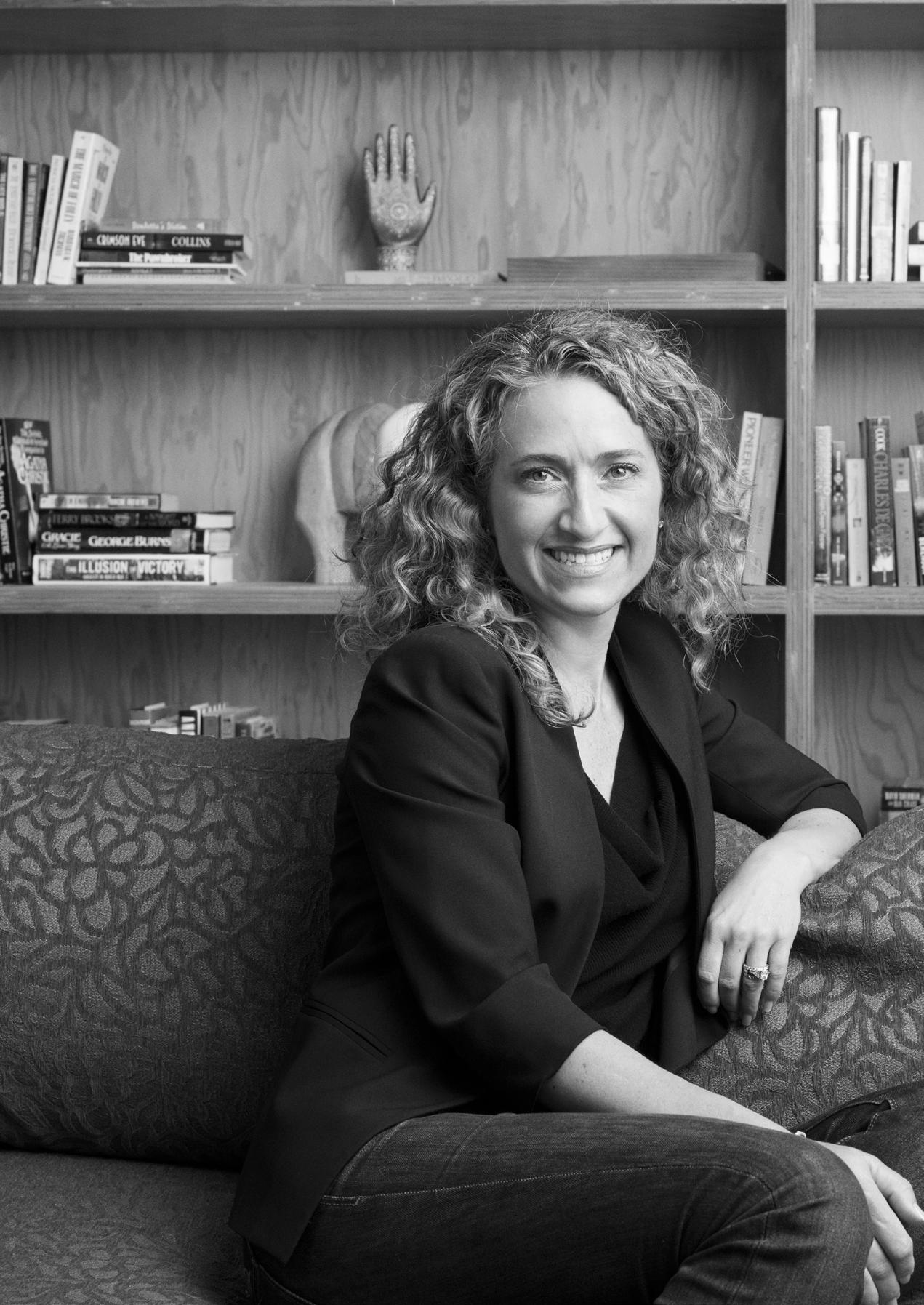

Natalie Naugle and Nikki Stitt Sokol are working to ensure that the diversity of the company’s legal department and the outside counsel it works with is in line with that of its massive user community
By Jacob Winchester
Facebook recently announced that 2.5 billion people use the social network or one of its products, including Messenger, Instagram, WhatsApp, and Oculus. To put that into perspective, the company’s user base is almost one-third of the entire planet’s population. Such reach naturally enriches the social media behemoth with a substantial amount of innate diversity, at least among its users, but Natalie Naugle and Nikki Stitt Sokol are taking it several steps further.
As Facebook’s associate general counsels for its general litigation team in the US and Canada, Naugle and Sokol are using their positions of power to help push the company’s legal department—and the law firms they work with—to be every bit as diverse as its colossal user community.
Nikki Stitt Sokol Associate General Counsel for US and Canada Litigation Facebook
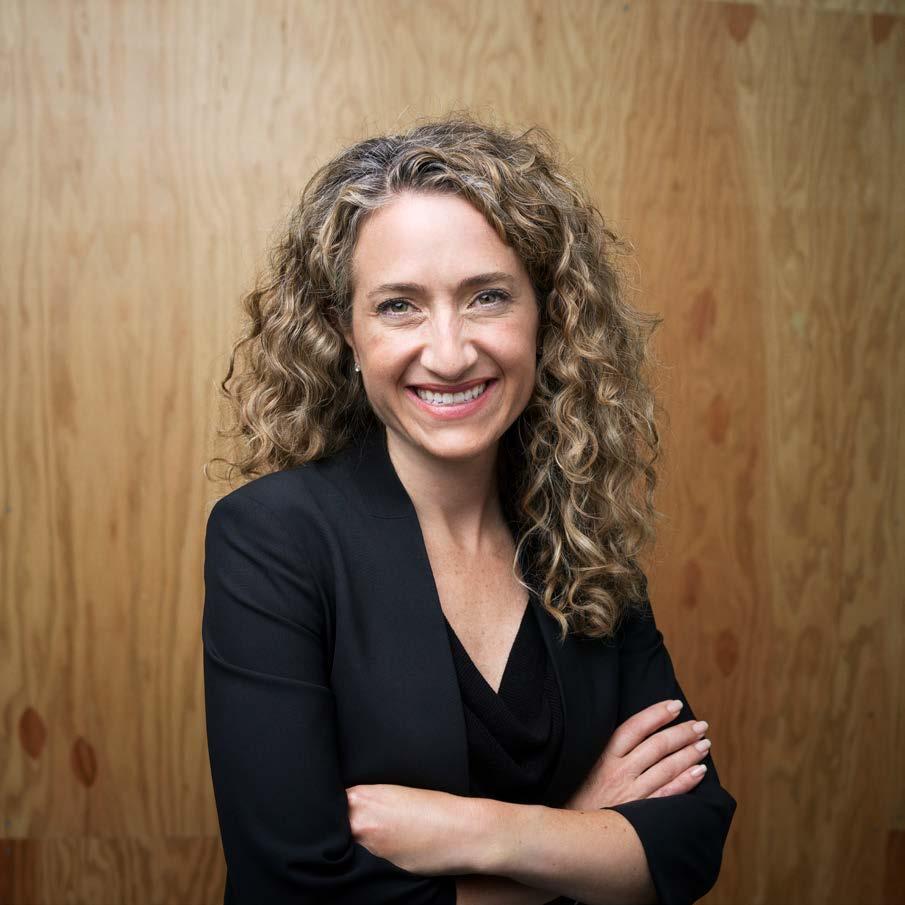
“Facebook is very much a missiondriven company, and that mission has evolved since I’ve been here, from giving people the power to connect to giving people the power to build communities to bring the world closer together,” Naugle says. “We serve over 2.5 billion people all around the world. These are people from all cultures, countries, and life experiences. These obviously can be very different from what I might experience as a white woman living in San Francisco or Menlo Park. Since we have this incredibly diverse user base, we’re going to have to have diverse teams if we’re going to best serve that user base.”
“We fundamentally believe that diverse teams make better decisions,” Sokol adds. “Also, when we’re dealing with complex legal issues, we want the people representing us to truly be a reflection of our values and who we are as a company and a community. It’s good business sense on a number of levels.”
Since Facebook sports a lean litigation team, relative to the global scope of its endeavors, it’s often necessary for it to rely on the support of outside counsel. “When you’re dealing with massive class-action litigation, you really need a big team to help run the litigation,” Sokol says. “There are some small matters we
can handle internally, but on the litigation side, the majority of our work goes to outside counsel.”
In choosing the firms that assist with cases, Sokol and Naugle tend toward those that embody an authentic level of diversity at all levels. “For a while, we had an informal policy of hiring firms that were notably diverse, but early last year we made this a formal and explicit policy,” Sokol says. “In general, we’ve made it clear that we’re looking for teams where people at the senior level are diverse and where women and underrepresented minorities will have real, substantive opportunities to work on our cases. It’s one of the most critical factors in choosing a firm to be our outside counsel.”
“On the formal front, we have billing guidelines that require that any particular team consist of 33 percent women or underrepresented minorities,” Naugle adds. “When a new case comes in, we’ll generally go out and ask three or four firms to pitch the case.”
Naugle and Sokol’s team surveys the various firms with the same set of questions, one of which specifically addresses the makeup of the outside team that would be working on the case. “Quite frankly, firms that we know have a greater amount of diversity are much more likely to be on
Natalie Naugle Associate General Counsel for US and Canada Litigation Facebook
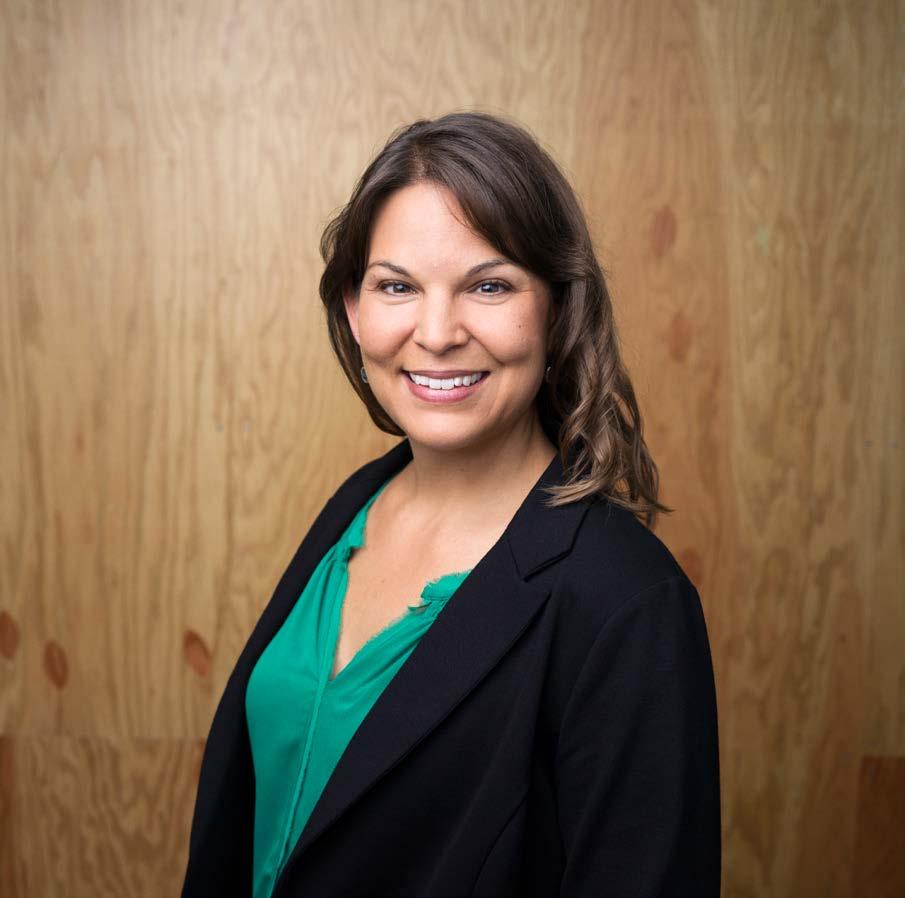
our radar to begin with,” Naugle says. “And we don’t just focus on statistics on a piece of paper. We want to see actual diversity in the room when the firm is pitching the case—we want to know who the specific people of color, women, or underrepresented minorities are and understand what their roles will be in the cases.”
Sokol and Facebook’s legal department have also created a program called Reconnect, which aims to help lawyers who have paused their careers for significant periods of time for personal reasons. “Women disproportionately leave positions at law firms once they have children, so there are all of these brilliant attorneys out there who have so much talent, amazing experience, and stellar credentials, and yet
they have this gap in their résumé,” Sokol says. “We wanted to create an on-ramp for people with a career pause to relaunch their careers. We now have a third lawyer joining us on a permanent basis who came to us through the Reconnect program.”
Such efforts to establish true diversity haven’t been without challenges, however. “One of our biggest struggles has been that our outside counsel can only be as diverse as the law firms are themselves, especially when we’re talking about lawyers at the most senior levels,” Naugle says. “Even if law firms are trying to get better, women, women of color, men of color, and other minorities are way underrepresented at senior levels. That’s why policies with understandable requirements
and numbers—with no squishiness to them—are so important.”
Ultimately, Sokol and Naugle say, focusing on making the Facebook legal department and the outside counsel who represent the company as diverse as possible enhances Facebook’s primary mission of connecting communities. “Large-scale social media offers a space to folks who previously might not have had anywhere to go to voice their concerns,” Naugle says. “It gives people who didn’t historically have a voice the ability to express themselves, share ideas, and come together to effect change. Giving people the ability to connect and share is really giving a sort of power to diversity that, up until now, just didn’t exist.”
Munger, Tolles & Olson LLP:
“Natalie and Nikki make everything they touch better. Their commitment to diversity is real, and they are making a difference. I so admire that and feel grateful to know and work with them.”
—Rosemarie Ring, Partner, Litigation
Mayer Brown:
“Nikki and Natalie are both extraordinarily talented lawyers, strategic thinkers, and strong leaders. It is a privilege to work with them.”
—Lauren Goldman, Partner
Gibson, Dunn & Crutcher LLP:
“It’s a pleasure working with Nikki and Natalie. Fiercely committed to the client, attentive to new developments affecting our matters, and unfailingly professional, they’re the next wave of inspiring women leaders in the profession and the industry!”
—Kristin Linsley, Partner, Litigation
Mayer Brown joins Modern Counsel in congratulating Nikki Stitt Sokol and Natalie Naugle for their many accomplishments at Facebook. It has been an honor to partner with Nikki, Natalie, and the rest of Facebook’s talented legal team.
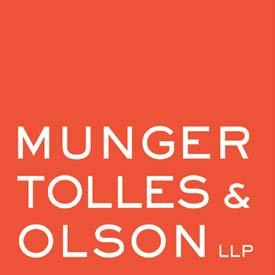
Americas | Asia | Europe | Middle East www.mayerbrown.com
MANY

Through pro bono efforts and UPS’s Women’s Leadership Development group, the company’s global litigation counsel is furthering its culture of giving while helping train its women to be leaders—sometimes doing both at once
UPS has had a strong commitment to volunteer service and charitable giving for decades. That dedication is evident in the 111-year-old company’s culture and its foundation (see the sidebar on p.102). It also extends to UPS’s more than 454,000 employees worldwide. In 2017, in total, they volunteered 2.9 million hours, and they’re nearly 80 percent of the way toward fulfilling the company’s pledge to contribute 20 million service hours by 2020.
The members of the company’s legal department are no exception. The team seems to attract lawyers with an affinity for investing in others and working to make a difference in the communities they serve. This is certainly the case with Stephanie Driggers, UPS’s global litigation counsel. She has a long history of being involved in activities that impact women and children, including trips with the International Justice Mission to Cambodia and Thailand to address
By Jeff Silver
human trafficking issues, pro bono services for victims of domestic violence, and additional pro bono work on juvenile justice issues. She is also a former board member of Quality Care for Children, which addresses nutrition and early childhood education. Within UPS, she’s also a member of the pro bono committee and chairs the company’s Women’s Leadership Development (WLD) business resource group, where she simultaneously encourages others to donate their time and helps support women at the company.
“I’ve always been passionate about helping women achieve their professional potential,” Driggers says. “They’re an integral part of diversity and inclusion efforts in the workplace, but women can also experience unique challenges that need to be addressed.”
She notes, for example, that the corporate environment is different from that found in law firms, where associ-
ates come in with a class of peers who provide a ready-made support network. “At UPS, we built structures that help women find peers, mentors, and sponsors to help champion their careers from inside and outside the company,” Driggers says. “The initiatives help us attract, retain, and promote women in the corporate setting.”
These support networks are rounded out by relationships with other lawyers and partners in various pro bono settings. Driggers and her team members participate in programs such as the Pro Bono Check-Up, delivered through the Pro Bono Partnership of Atlanta. Relying on the expertise of lawyers from law firms and corporate legal teams, the program reviews legal issues for nonprofit organizations so that they can devote their funds to their core missions, not to paying for legal services. Driggers and her team have also volunteered with MedShare, a program
The UPS Foundation was established in 1951 by the company’s founder, Jim Casey. It utilizes employees’ activities, the company’s logistics expertise and assets, and charitable donations to make meaningful differences around the world. This is accomplished through cash grants, in-kind support, and what the company refers to as “passionate volunteers.”
In 2017, the foundation donated $118.3 million in philanthropic contributions and provided another $60.9 million in charitable giving to more than 4,300 organizations in more than 170 countries. It focuses its funding on causes surrounding diversity and inclusion, environmental sustainability, volunteerism, and community safety.
Some of its signature programs in these areas include: the UPS Forestry Initiative, a global network to plant, protect, and preserve trees to offset carbon emissions and reduce air pollution, with a pledge to plant fifteen million trees by 2020; the UPS Humanitarian Relief & Resilience Program, devoted to strengthening global disaster preparedness, emergency response, and post-crisis recovery; and local community investment grants that are determined by each UPS region, district, and business unit.
The company also has a longstanding partnership with the United Way. The foundation participates in the annual fund-raising campaign by matching employee contributions. Since 1982, employees and the foundation have donated more than $1.3 billion.
that collects and sorts donated medical supplies and equipment for communities in need around the world. In addition to providing labor at MedShare’s warehouse, UPS provides logistics and transportation support to deliver donated items.
“There are benefits to all sides from this kind of volunteerism,” Driggers says. “Aside from simply being the right thing to do, we get an opportunity to understand a wide range of global community needs and, simultaneously, do good by connecting with our core competencies as a company.”
Outside partners that Driggers works with have been impressed with how such experiences have informed her day-to-day work, too. “Stephanie is not your everyday litigator,” says Wendy Johnson Lario, a shareholder and the chair of the New Jersey labor and employment practice at Greenberg Traurig, LLP. “She is a change-maker and a force to be reckoned with. She also challenges her teams, internally and externally, to think outside the box and develop creative approaches to litigation, settlement, and ultimately the correction of the underlying circumstances that instigated the litigation in the first place.”
As part of her leadership of WLD, Driggers helped the group celebrate its ten-year anniversary as UPS’s first affinity group by revising its mission statement and developing a five-year plan that will help the company achieve its aspirational goals related to workforce diversity. At the same time, she took the somewhat revolutionary step of increasing men’s involvement with the group. Its leadership team is now 20 percent male, with more men acting as mentors and leading and participating in lean-in circles. One male partic-
ipant, a colleague of Driggers’s named Adam Briggs, chairs a committee on engagement and leads focus groups that help deliver feedback directly to HR regarding employee retention and promotion.
“It’s wonderful to see men with wives and daughters get involved and to hear how passionate they are about women’s issues,” Driggers says. “They genuinely want to make a difference, and we’re able to accomplish more because we’re working together.”
In addition to a natural sensitivity toward injustice and a desire to fight it, Driggers’s activities are highly informed by her mother, who went back to college when Driggers was in middle school. She then taught for years before becoming an elementary school principal. From her example, Driggers learned the importance of women being able to take care of themselves. “My mother inspires me to make sure that women have a seat at the table and that their voices are being heard,” she says.
Driggers now has three daughters of her own. She hopes that the example she sets through her volunteer efforts will inspire similar dedication in her children. “Whenever I volunteer, I’m always impressed by the people who devote their lives to helping others,” Driggers says. “And I always learn something new from the bravery and resilience I see in the communities we’re serving.”
King & Spalding:
“King & Spalding congratulates Stephanie Driggers on her well-deserved recognition from Modern Counsel for her work as global litigation counsel for UPS. Stephanie is an innovative leader who implements cutting-edge but practical strategies in her management of litigation.”
—Ronni Solomon, Partner
UPS partner Greenberg Traurig (GT) has a global labor & employment practice that serves clients from offices throughout the US, Latin America, Europe, and Asia. Members of the practice are frequently called upon to handle complex, bet-the-company, high-stake cases, including class and collective actions, and they have a record of successfully defending and winning numerous trials. GT brings the same level of expertise and efficiency to single-plaintiff litigation and agency actions. Its team’s sophisticated advisors also provide strategic insight on policies, training, and preventative workplace initiatives. GT designs practical, proactive strategies that can be readily implemented by today’s legal departments and human resources professionals. The firm has been recognized by The Legal 500 United States in the areas of labor and employment litigation, labor-management relations, workplace and employment counseling, ERISA litigation, and trade secrets litigation.



It is a privilege to work with our friend, Stephanie Driggers, whose vision and leadership at UPS have made a lasting impression. We applaud your accomplishments and thank you for making us better attorneys.



Profile shares the stories of the modern executive.








Share your story of exceptional leadership with our network of powerful business leaders.




Portraits of today’s top legal executives, the remarkable careers they have cultivated, and the management strategies and best practices they employ to succeed both individually and collaboratively
By Bridgett Novak
Accounting experience isn’t a prerequisite for a general counsel position, but Doug Balyeat of Pratt Industries explains how it helps

“BOTH OF MY PARENTS WERE MATH MAJORS, AND my brother got his PhD in finance,” says Doug Balyeat. So, its not surprising that he majored in accounting, became a CPA, and spent more than three years in the audit division at Ernst & Young (EY) in Atlanta.
But his career path didn’t end there. One day, while picking up documents from law firm and EY client Alston & Bird, he told one of the lawyers that he’d often thought about going to law school. “He told me to do it or stop talking about it,” Balyeat says with a laugh.
Following the lawyer’s advice, he took the LSAT and graduated from Wake Forest School of Law in 1997. “I thought I would go back to a large accounting firm and be a CPA with a law degree,” he says, but after some mentoring from a Wake Forest law professor, Balyeat accepted a position in Alston & Bird’s tax group. However, he soon discovered that “just because you’re good at something doesn’t mean you should be doing it.” When an opportunity opened up in the corporate group at Paul Hastings, it piqued his interest. Impressed with the firm’s international footprint, he made the move.
Though he was based in Atlanta, Balyeat’s work increasingly required him to be in New York. He liked the job but didn’t want to make his home in a different city, so he opened his own firm in Atlanta: Balyeat and Associates. “It afforded me a level of freedom I’d never had before,” he says. “I didn’t have to work the crazy, large law firm hours, but my take home was about the same. It was truly the good life.”
Here is where one discovers an important thing about Doug Balyeat: his infectious positivity. He describes every juncture in his career path as “truly great” and mentions mentors at each stage—Jane Salter at EY and Paul Connell at Paul Hastings, for instance—to whom he will always be grateful.
In 2007, an opening at Pratt Industries presented itself, with the general counsel position on the table. Even though Balyeat wasn’t looking for a change, he couldn’t resist the opportunity. “Taking this job was the best professional decision of my life,” he says. “Not only are we delivering a great product—corrugated boxes made from our own 100 percent recycled paper—we have an extraordinary management team that recognizes the importance of the employee. During the down market, all Pratt executives voluntarily gave up 5 percent of their salaries, which enabled us to protect our hourly workers. That kind of attitude means a lot to me.”
Balyeat believes his financial training has been indispensable. “I don’t see how you could do this job without a good understanding of finance and accounting,” he says. “At the large law firm where I practiced, my CPA credentials got very little use. Here, I use them every day. It takes more than just understanding the numbers, though. You need to recognize how businesses operate and what makes a good decision.”
He admits some issues are best addressed by lawyers, but he adds that “you’re missing something if you only look at things through a legal lens. You have to comprehend the cost-benefit analysis and see how the puzzle comes together.”
The combination of Balyeat’s accounting and legal skills have come in especially handy given Pratt’s growth trajectory. In 2015, the company bought Robert Mann Packaging, Inc., which has more than a dozen facilities in the US and Mexico, for $60 million. And, a year later, Pratt acquired Minnesota Corrugated Box, Inc. and its 250,000-squarefoot plant for $70 million.
“At the large law firm where I practiced, my CPA credentials got very little use. Here, I use them every day.”
Pratt, which is privately held, is also building a 470,000-square-foot recycled-containerboard mill near Wapakoneta, Ohio. The mill was partly financed via $210 million in tax-exempt revenue bonds, as part of the company’s plan to become more vertically integrated and reduce its need for third-party suppliers. The plant is expected to come online in late 2019.
Helping navigate these and many other deals has resulted in numerous honors for Balyeat, including the 2018 Dealmaker Award from the Atlanta Business Chronicle and the Georgia chapter of the Association of Corporate Counsel.
“I am honored, but I definitely don’t do these deals alone,” Balyeat says. “I’m always a bit embarrassed when I see articles that pin the ribbon on my chest. We have an amazing in-house team, made up of legal and business experts, as well as some great outside counsel. I love being able to add value to our company, but everything we do is the result of extraordinary teamwork.”

By Jeff Silver
On
his complicated path to the top at McGraw-Hill Education, David Stafford has faced his challenges head on
LATE ON NEW YEAR’S EVE IN 1987, David Stafford toiled away in a conference room as part of a team that was working on a multibillion-dollar corporate acquisition. He was busy tackling the never-ending duediligence and transactional chores faced by every first-year law firm associate. It was a far cry from the career he had envisioned that would allow him to leverage his critical-thinking skills to develop creative and strategic analysis and provide counsel in a commercial setting. So, soon after, on a whim, he responded to a newspaper ad for a corporate and intellectual property attorney at McGraw-Hill. The decision marked the beginning of an unorthodox career path.
“I ended up being the runner-up for the job,” Stafford says. “But, two months later, I was contacted about a new position with the Standard & Poor’s [S&P] Information Group [a subsidiary of McGraw-Hill] that turned out to be a better position than the one to which I originally applied.”
He became the S&P Information Group’s first on-site attorney, and his stature and responsibilities grew immediately. Still in his twenties, he went from pushing paper at his former law firm to sitting at the table with senior executives of a complex global business with hundreds of millions of dollars in revenue.
Among other responsibilities, Stafford supported S&P’s licensing of its indices to sponsors of financial products. And, with support from outside counsel, he helped lay the legal foundation for index owners being entitled to license fees for the use of their IP. He emerged as a key driver of S&P’s index business. Today, this aspect of S&P’s business generates approximately $700 million in annual revenue. He came to
be perceived by the business executives as a valuable partner who could be looked at for both legal and commercial advice, and it didn’t hurt that he was well-liked and was comfortable in social situations with his colleagues.
Stafford’s success garnered the attention of McGraw-Hill, and in 1996 he was asked to join the parent company’s legal team. He took advantage of the opportunity to expand his areas of expertise and eagerly immersed himself in M&A, antitrust analysis, IP, employment matters, and corporate governance. Through the work, he became one of five young McGraw-Hill executives selected to participate in the Global Leadership 2020 program, run by the Tuck Business School at Dartmouth. Stafford attended one-week executive training programs at Tuck, at Oxford University, and in the city Shanghai. “My selection to participate in the program made me aware of the investment the company was making in me and how seriously it was taking my growth potential,” Stafford says.
The five years after that were characterized by slow movement through the ranks and assurances that Stafford had emerged as a leading candidate to succeed the existing general counsel when he retired. However, this period turned out to be a prelude to an unexpected career twist: Stafford was offered the position of senior vice president of corporate affairs and assistant to the chairman and CEO, Terry McGraw. This nonlegal role involved oversight of corporate affairs, including communications, marketing, government relations, and corporate philanthropy, plus ongoing work with the company’s board of directors.
“I was in a very comfortable environment in the legal department, but
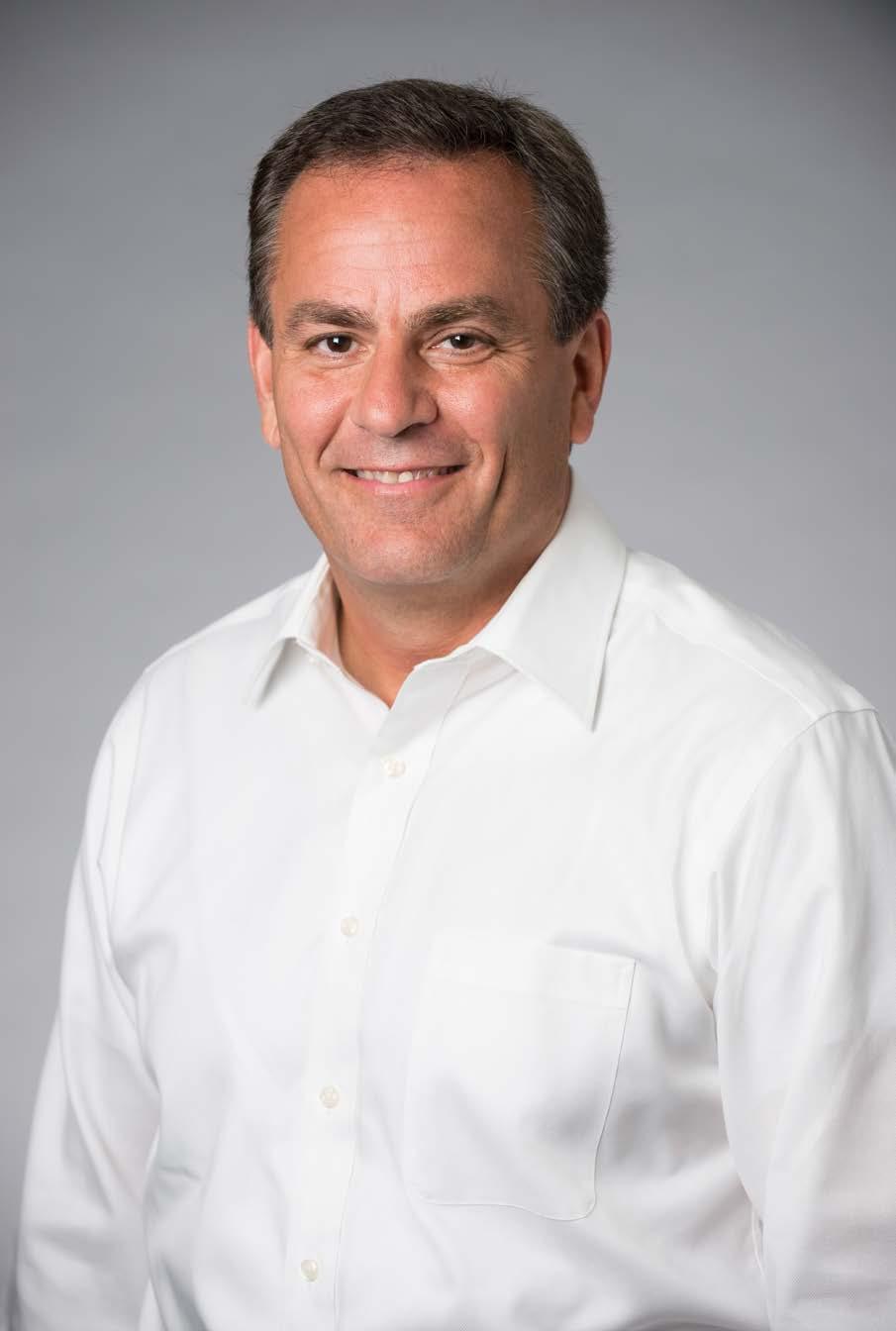
David Stafford SVP and General Counsel McGraw-Hill Education
We congratulate David Stafford, Senior Vice President and General Counsel at McGraw-Hill Education, on his noteworthy accomplishments and recognition by Modern Counsel. We are proud to partner with David in the pursuit of greater learning and excellence.

I decided to accept a stretch position and found myself in unfamiliar territory as chief of staff to Mr. McGraw, who was a high-profile CEO,” Stafford says. “It was a huge career shift with an unknown outcome.”
The move took Stafford from the confines of the legal department directly into the upper tier of the C-suite at a multibillion-dollar public company. It came with a huge office, with a fifteen-foot ceiling, fireplaces, dark paneling, and a view of Rockefeller Center. It also raised his profile by associating him with the company’s largest and most challenging issues.
However, it also unexpectedly put him in the middle of the intensely negative attention the company received thereafter as the US financial crisis hit. The company’s S&P Ratings unit was accused of helping precipitate the crisis by assigning high ratings to a variety of mortgage-backed securities that were impacted by an unprecedented crash in housing prices. The company’s stock price plummeted. Relationships with the board of directors became more difficult. The stress level was high. Stafford ultimately left the chief of staff position, succeeded by someone with more experience in crisis management and communications, and he returned to the legal department.
In a final twist, when McGrawHill Education was sold to a private equity firm, in 2013, at the urging of Mr. McGraw, Stafford was offered his current position of general counsel—a challenge he immediately accepted. Stafford subsequently built a new legal department from scratch and has emerged as a highly respected leader on the senior management team. “I enjoy my role as general counsel of a multibillion-dollar edu-

1/3-page ad for Modern Counsel
Prepared by Visual Language LLC
Irvington, New York
his
ellen@visualanguage.net
by
Counsel
Proskauer is a leading global law firm, providing a wide range of legal services to clients worldwide. To learn more about the firm, visit Proskauer.com.
We are thrilled to congratulate David Sta ord, Senior Vice President and General Counsel of McGraw-Hill Education, for his recognition in Modern Counsel. We celebrate the accomplishments of David and the entire McGraw-Hill Education in-house legal team.
Patterson Belknap Webb & Tyler LLP is a New York City based law firm with more than 200 lawyers. The firm is included on The American Lawyer's 2018 "A-List" of the 20 leading law firms in the United States. Patterson Belknap delivers a full range of services across approximately 20 practice groups in both litigation and commercial law. For more information, please visit www.pbwt.com.
www.pbwt.com
In addition to his work for McGrawHill, David Stafford has served on the board of trustees of YAI Network for more than ten years. The organization provides a variety of support services throughout the New York metropolitan area to people with developmental disabilities. He is currently the board’s vice chairman.
Stafford’s legal and corporate governance experience has been vitally important to YAI on several occasions. Perhaps most significantly, he was part of a team that helped the nonprofit reach a settlement with the State of New York related to irregularities in financial reporting. Stafford and the team’s settlement has led to a renewed energy and vigor in the organization, and Stafford was also instrumental in the selection of a new and highly successful CEO.
“Deciding to jump into the deep end of the pool even before I could swim particularly well has given back more than I could have imagined.”
cation company immensely,” he says. “Our company is in an industry that helps people learn and reach their full potential, and I enjoy close and supportive relationships with my team and my colleagues.”
Looking back on his many rolls, Stafford advises young lawyers to expect twists and turns and not to think their careers will play out exactly as they envision. “Expect the unexpected,” he says. He also tells them that when they face pivotal decisions, they should challenge themselves and not always take the safe road.
“By taking calculated risks, you develop your capabilities and your relationships, personally and professionally, and facilitate personal growth” Stafford says. “Deciding to jump into the deep end of the pool even before I could swim particularly well has given back more than I could possibly have imagined.”
Proskauer Rose LLP:
“David embodies the qualities of an outstanding leader and a highly effective general counsel. He is able to solve complex legal and business issues, and he motivates his team to always do their best work.”
—Elise Bloom and Greg Rasin, Partners
Patterson Belknap:
“We at Patterson Belknap are very proud of our long partnership with David Stafford and McGraw-Hill Education (MHE). We celebrate David and the entire MHE legal team for this well-deserved recognition.”
—Saul B. Shapiro, Chair of Patterson Belknap’s Litigation Department
American Express’s Jon Lutinski discusses what young lawyers need to consider when they aren’t sure which direction to take their career in
By Will Grant
THE PRESSURE TO COMMIT TO A LEGAL path comes on early and strong, according to Jon Lutinski. “I remember an interview I had in law school, with a law firm, and they asked what I wanted to do, litigation or transactional work; You don’t truly know until you experience both,” he says.
The vice president and senior antitrust counsel at American Express speaks from experience. In his more than thirteen years as a practicing attorney, he has managed to amass expertise in antitrust law from virtually every angle, including the public sector, private practice, and in-house work. He began his career at the Federal Trade Commission's (FTC) Bureau of Competition, investigating and litigating
reverse-payment cases in the pharmaceutical industry. Then, he moved to the firm of Wilson Sonsini Goodrich & Rosati in 2009, where he was heavily focused on litigating antitrust cases in pharmaceuticals before extending his skill set into the tech sector.
He joined American Express in 2015 and is part of a team covering antitrust matters for the entire business across the US and the rest of the world (except for Europe), including issues related to transactions, litigation, counseling, and compliance.
Today, Lutinski would be able to answer the question he faced in his interview many years ago, but he understands how difficult such decisions still are for young lawyers just starting out.
Here, he offers some thoughts they might consider when charting their own professional course.
Lutinski interned with the FTC between his second and third year of law school, but he still found himself in the deep end of the pool when he went to work for the organization after graduating. “I think my experience as a young lawyer in the government was critical to my development as an antitrust lawyer,” he says. “I was thrown into situations—running investigations, taking the lead on depositions—that made me grow up fast as a young lawyer and built up my confidence to handle a variety of situations, particularly with respect to litigation. It was a foundational experience.”
While continuing to work for the FTC and as a litigator in private practice, Lutinski branched out into different aspects of antitrust law while still spending a great deal of time litigating. Sampling different roles and functions helped inform his understanding of what kind of lawyer he ultimately wanted to be. “It was critical to my career as an antitrust lawyer to have the ability to do both transactional work and litigation work in private practice—as well as practice substantively in different industries,” Lutinski says. “It’s important to experience both types of work to determine which you like better or whether you like the variety of having both.”
A lot of young lawyers experience outside pressure—as Lutinski did in his early interview—to choose a
“Don’t define yourself too early as a litigator or a transactional lawyer. Wait to make that judgment, or consider whether you even have to.”
focus early. “Don’t define yourself too early as a litigator or a transactional lawyer,” Lutinski says. “Wait to make that judgment, or consider whether you even have to make that judgment. I don’t think it’s a great idea to label yourself too early in your career. You’re pushed earlier and earlier in law to choose, but the truth is you can have both a wide breadth and variety of experiences in law.”
“I really like drafting motions and complaints, and I’ve had some incredible highs in litigation,” Lutinski says. “But, I’ve also had lows, where I’ve been fighting over documents or spending the day in a contentious deposition, fighting with opposing counsel over things that just do not seem critical.”
As his has career progressed, Lutinski has realized that when it comes to litigating, he prefers to act in a more strategic supervisory role and provide client counseling to avoid litigation, as opposed to battling it out with opposing legal teams day after day. “I like doing the counseling piece of the work,” he says. “It’s fun working with the business folks and solving real business problems, understanding what they’re trying to do and helping them achieve those goals while minimizing antitrust risk.”
Lutinski believes one of the most challenging things for lawyers is working well with non-lawyers who don’t have legal expertise. He suggests young lawyers get as much practice with this as possible, particularly if they’re looking to go in-house. “I think having significant client contact in private practice prepares you for working in-house,” Lutinski says. “Take as many opportunities to gain close client contact as possible. As an internal, in-house advisor, counseling is a principal piece of the work, and your clients are all repeat players.”
“Don’t be afraid to try new industries,” Lutinski says. “Prior to American Express, I had never done any work in the payments sector, but that was part of the attraction of the job. I had been doing pharmaceutical work for ten years and wanted to take a deep dive into a new industry. I think that’s why a lot of us go into antitrust as a career; we are interested in how different industries work—who are the players, what’s the emerging competition in the space, the flow of money in the market. So the fact that American Express was in the payments space was a major plus. I’m lucky to be at a company where continuing education about the industry is encouraged and expected.”
Western
Digital’s Sabra Truesdale
explains how focusing on fitness can unite a company
By Will Grant
AS ONE OF THE LARGEST DATAtechnology companies manufacturing flash-storage and hard-disk drives in the world, Western Digital (WD) is finding a way to instill its drive in more than just its products. Through the DRIVE Fitness and DRIVE Wellness Center programs, the company is leading the way in health consciousness and wellness options for all of its employees. Associate general counsel of intellectual property Sabra Truesdale is one of WD’s more shining examples of the benefits of these programs and their capacity to unite and inspire.
Truesdale, who has been at WD since joining the HGST (formerly Hitachi Global Storage Technologies) division in 2015, says that the company’s DRIVE Fitness initiative and its buy-in from the organization was immediately noticeable upon her arrival. Truesdale saw both HGST’s president and general counsel engaged in workouts, and she says it made an impression. “It was
important to see the president participating in the workout and realize I’m not going to get in trouble for exercising,” Truesdale says. “If the president or GC is also taking an hour during the day to be active, I can, too.”
At the Great Oaks campus in San Jose, California, where Truesdale resides, the DRIVE Fitness program offers both yoga and CrossFit-style classes. Truesdale participates in both classes and has been a vocal proponent of the program for more than its health benefits.
When Truesdale first came to WD, she was coming from a firm and had no in-house experience. She suddenly had attorneys reporting to her who had been at the company far longer than she. Truesdale was able to bond with one of her direct reports through the CrossFit classes and says it made an immediate and significant difference in their relationship. “It definitely helped me get to know him better and make
Sabra Truesdale’s drive spills over into commitments to more than just wellness. She has also been instrumental in the development of the US Patent and Trademark Office’s Patent Pro Bono Program. Additionally,, Truesdale was the Fenwick & West Pro Bono Associate of the Year for her cocreation of the California Inventors Assistance Program, which seeks to “help underresourced inventors and small businesses obtain the patents they need to turn their ideas into viable economic opportunities.” Truesdale’s efforts have helped spread what was initially only a Minnesota-based pilot program into a national effort that now ensures that inventors, no matter their location, have patent representation.
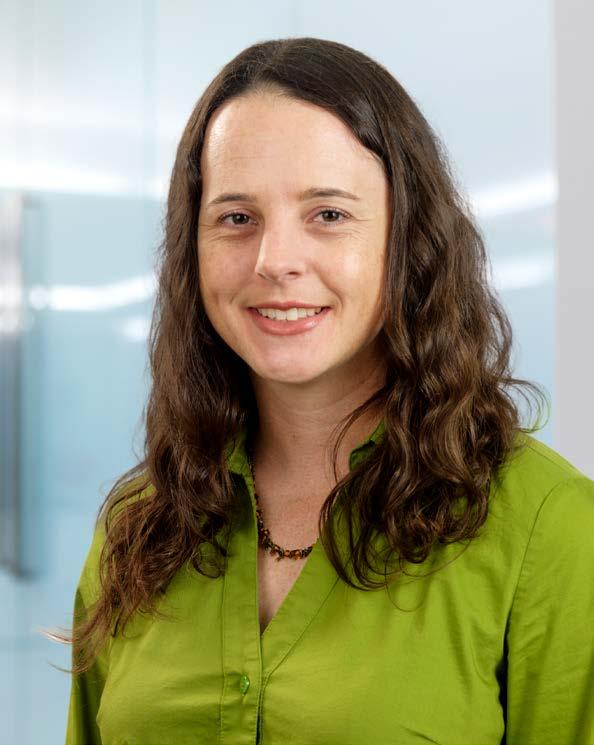
him more comfortable with me, because we had something else to talk about other than work,” she says.
Truesdale is something of an informal ambassador for the health initiatives at WD. She works to publicize events, including the company’s outdoor summer workouts and occasional outdoor yoga. Truesdale, whose athletic endeavors have included gymnastics, running, strength conditioning, tennis, and aerobics at one time or another, says that as a mother of two, being able to have time to be active during the workday is an invaluable time-saver.
At the same time, WD’s recently rolled-out DRIVE Wellness Center program “provides immediate and affordable medical services close by, with no waiting” for WD employees, their spouses, and additional dependents, Truesdale says. Each center’s services include primary care, physical therapy, chiropractic care, health coaching, acupuncture, and behavioral health, among others. The DRIVE Wellness Center debuted at WD’s Irvine, California, campus and subsequently expanded to the company’s other two largest US locations.
Along with their day-to-day services, the programs are partnering to offer joint seminars and trainings for WD employees. These include weight-training tutorials, mindfulness and medita-
Sabra Truesdale Associate General Counsel of IP Western Digital
tion seminars, and mobility and flexibility trainings. Campus-wide health screenings have also been made available through joint partnerships of the wellness and fitness programs.


Truesdale says that along with getting sick less and being able to focus better at work, the health and wellness programs have provided the additional benefit of helping employees get to know other individual members of their massive organization. “WD is something like sixty-five thousand people worldwide,” Truesdale says. “WD classes help you get to know your coworkers, build teamwork, and locate resources within the company.”
The classes offer Truesdale a chance to introduce herself to people from all parts of WD. “As part of the legal department, we’re not the focus of WD,” Truesdale says. “Legal is a service, and in order for us to do our jobs better, people need to know who we are and what we can do for them.” The inclusivity of WD’s classes is what makes them special, Truesdale says, because they are available to everyone from the CEO to the manufacturing operators.
The fitness mantra may be “no pain, no gain,” but WD’s approach to wellness seems to be much more focused on the gains.
Setter Roche LLP, located in the Denver-Boulder metro area, is committed to excellence in intellectual property legal matters. Our firm specializes in domestic and international patent prosecution, strategic intellectual property planning, patent portfolio development, patent analysis and opinions, and trademark matters. We strive to provide high quality and cost effective legal services to clients in high technology fields.
By Valerie Menard
Lauren Thedford Associate General Counsel

Lauren Thedford works with, not against, executives and managers at Highland Capital Management to give sound legal advice
TASKED WITH MAKING SURE COMPAnies comply with laws and regulations, corporate legal teams have developed a reputation for raising a red flag. Corporate culture, however, is changing, inviting departments that used to be kept separate and apart to work more with company managers, executives, and even those in the C-suite. For Lauren Thedford, associate general counsel at Highland Capital Management, LP, such inclusivity is an important part of providing value.
“Unlike the typical legal team that just says no, our legal team is business oriented,” she says. “We try to take a deeper dive when considering the ultimate business goal and how to make it happen. I like to think other teams at Highland view us as a partner rather than a roadblock. We understand the funds and why we may not be able to do something one way but can still reach the ultimate goal by considering other options. We’re a collaborative group, working together to support the business objectives.”
Based in Dallas and founded in 1993, Highland Capital Management is a multibillion-dollar global alternative investment manager with more than $12 billion in assets under man-
agement. Thedford, too, is a Texan, from the Dallas suburb of Carrollton. She’s the younger of two children born to Richard Thedford, an administrator for the Plano Independent School District, and Karen LaCroix, a human resources executive. Thedford considers her mother her earliest mentor, having watched her juggle a full-time position while still caring for her children.
“I saw how she asserted herself and dealt with difficult issues,” Thedford says. “Maybe her HR background helped, but she was a great sounding board as well. When something happened and I needed feedback, she’d let me know if I was out of line.”
Thedford also looked up to her college volleyball coach at West Texas A&M University, Tony Graystone, who not only instilled a respect for the game but also values such as loyalty, pride, discipline, and teamwork—all of which have elevated her work at Highland.
Becoming an in-house lawyer, however, was not her childhood dream but rather a logical choice. She knew she wanted to go to graduate school, and as a political science major (and Spanish minor), she thought studying law made the most sense. So, she applied and was accepted to Southern Methodist Uni-
versity School of Law, from which she graduated cum laude in 2014.
Now at Highland, she helps the company comply with federal regulations for the twenty-five mutual funds on its investment platform and facilitates reporting to the board of directors. In the five years she’s been with the company, she says, she’s been able to improve Highland’s efficiency, assist with its reorganization, and expand its business by helping launch new funds, including a suite of interval funds rolled out this year.
“An interval fund is a type of closedended fund that is not publicly listed,” she says. “Closed-ended funds offer liquidity on a quarterly basis and may invest in longer-term investments. We’ve launched three and have four more funds in registration.”
Working with managers, executives, and board members keeps her on her toes, but it’s also what appeals to her about the work. “While I’m a lawyer, I also have a business hat on,” she says. “The position I’m in has me quarterbacking a number of different providers that all need to come together to have a transaction succeed. I work with administrators, transfer agents, outside counsel, auditors—I get to see things
Highland Capital partner AST is a full-service, tech-enabled professional-services firm that helps companies and shareholders across North America through the use of secure corporate data, analytics, advisory services, and a strategic approach to every interaction.
AST was originally founded as a transfer agent in 1971. Through organic growth and strategic acquisitions, the firm pioneered a new model of integrated services in the industry. Its affiliates now include AST Trust Company (in Canada); D. F. King & Co., Inc.; and Donlin, Recano & Company, Inc. Together, they lead the industry with a comprehensive portfolio that includes transfer-agent and registrar services, corporate-governance and advisory services, issuer and mutual fund proxy services, equity-plan solutions, restructuring services, and class-action and mission-critical services.
AST Fund Solutions is a strategic partner with expert teams that leverage a suite of specialized, end-to-end proxy-advisory services to customize solutions and execute project-management services that include scalable tabulation capabilities and in-house solicitation centers. The group provides tailored solutions for open-end, closedend, BDC, ETF, MLPs, and annual and special meetings and contested events.
AST is also one of the first in the industry to introduce a blockchain-based solution for proxy voting, promising greater security, faster transactions, and enhanced issuer and voter UX.
from a high level, not in the weeds, and that has helped me to succeed at Highland.”
Her outside colleagues are consistently impressed with her broad approach. “From the first time I worked with Lauren, I could tell that she was a no-nonsense attorney who looked for proactive solutions to any challenge,” says Paul J. Torre, president of governance, proxy, and ownership services at AST. “I have enjoyed working with Lauren over the years, and I look forward to working with her for many years to come.”
At the same time, her former college days playing volleyball now inform the way she manages her team, which goes beyond concern for the company’s bottom line. For example, she and her Highland coworkers fund-raise each November as the Hairy Highlanders, a group at the company promoting Men’s Health Awareness Month. Men at Highland grow mustaches for the month, and the best and worst ones are recognized at an annual fundraising party. Highland cofounder Mark Okada matches all employee donations, which allowed the team in 2017 to donate a total of $86,458 to the Movember Foundation, a national organization that raises awareness about men’s health concerns, including prostate and testicular cancer prevention.
“It is exciting to see what we can accomplish if we all work together,” Thedford says. “Mr. Okada found a way to get everyone on board and make it something fun to be part of.”
The cause closest her heart, however, is the fight against Alzheimer’s through organizations such as the Alzheimer’s Association. She helps the Blondes vs. Brunettes (BvB) Dallas foundation, which supports research and awareness of Alzheimer’s. Thedford’s father suffered from the disease before his death last year. In total, BvB Dallas has contributed $4 million to Alzheimer’s research since 2009.
Thedford hopes to get more involved in the nonprofit sector in the future, perhaps by serving on a board or city commission. Meanwhile, she finds fulfillment at her job each day. “I get to do something that I’m excited and passionate about,” she says. ‘It’s challenging, but I enjoy the fast-paced and creative aspects of the job, especially working with a talented group of people to pursue novel transactions that benefit the business.”
Progress relies on movement. And in the world of investment management, forward movement relies on effective investor communications.
We are AST, a tech-enabled professional services firm with over 40 years’ experience driving successful shareholder meetings and proxy outcomes.
AST Fund Solutions is a strategic partner and operational resource for your most critical communications. Our teams leverage a suite of specialized, end-to-end proxy advisory services to customize solutions that achieve your goals, then execute the plans with robust project management services, in-house solicitation centers, and scalable tabulation capabilities.
AST Fund Solutions has long understood the important role of technology and analytics. We offer clients innovative, technology-based solutions that can be tailored to meet their needs.


And, as part of our ongoing investment in technology, we’ve become one of the first in our industry to introduce a blockchain-enabled proxy voting and tabulation service. With an optimal user experience, this IBM-secured solution enhances the efficiency of your campaign while ensuring the accuracy of your results.
We know the right communications can move funds forward.
here to help you manage yours.






Allergan’s Thomas Poché has spent his career learning his field from many angles, and he’s coaching his team to do the same
By Lori Fredrickson

Thomas Poché VP and Assistant General Counsel of IP Allergan
WHEN THOMAS POCHÉ LOOKS BACK on his various achievements over his twenty-three years in the legal field, he attributes them in part to his belief in constant self-improvement. They’re successes that have come from a drive for growth, the current vice president and assistant general counsel of intellectual property at Allergan says—from constantly acquiring knowledge, learning new skills, and cultivating the broad experience that a more specialized attorney might not have.
“We all love the moments when the ball’s in your court,” Poché says. “My driver has been that when those moments come, I’d better know exactly what I’m talking about, because those calls are not a responsibility that I take lightly. Overspecialization is the enemy of informed judgment.”
It’s a philosophy that has shaped his extensive career and pushed him to work in areas ranging from litigation to prosecution to regulatory law. He actually started out with a PhD in biochemistry before attaining his legal degree from Boston University, and he resisted using his science background at first, going to Kirkland & Ellis as a securities and antitrust lawyer. Eventually, though, his technical expertise led him into patent litigation for the firm. There, he had a meeting where a client was asking him questions about prosecution that he couldn’t answer because he didn’t have the experience. “I hated that feeling of ignorance and not knowing how to grapple with the question my client had, so that sent me on this path where I could pick up those skills,” Poché says.
He moved on to a new firm in Washington, DC, where he gained prosecutorial experience for two years. That led him to a new opportunities at Connolly
Bove Lodge & Hutz, where he became partner. Then, later, he became a partner at Cooley Godward and began developing new skills in IP diligence, transactional work, and regulatory law in the biotech and pharmaceutical spheres.
By the time he joined Allergan in 2016, Poché had a full gamut of experiences and skills to rely on in his position. “It’s very hard to be someone who wants to practice across the full scope of intellectual property law; the world wants you to specialize,” he says. “But, that’s how I’ve always wanted to practice. What that gives me—and what I want for my team—is the understanding to perform across the full range of IP law.”
Such understanding, he adds, is an asset in being able to look ahead and anticipate questions. It helps him pay attention to litigation, make sure that claims are commercially useful, and understand how patent claims are going to play out in a regulatory context. It also helps prevent information drop, in which important knowledge in one area of Allergan or within Poché’s group doesn’t make it to where it’s needed, which Poché notes is more likely with a team of overspecialized and siloed lawyers.
Broad understanding also helps Poché and his team communicate better with the company as a whole, translating what they understand about IP into life-cycle projections, guiding development strategies, and clarifying which litagatory issues are most important to the organization. “It’s important that when the company needs guidance, we’re able to speak to them in their own language,” Poché says. “Deal teams need to hear guidance in terms of the deal at hand, and regulatory issues and IP development need
to be addressed within the framework the FDA requires.”
All these matters have come to the fore as part of the biggest initiative Poché has shepherded since joining Allergan, which has involved integrating a number of legacy companies into one dynamic organization. For this, his team has had to look at every aspect of how information flows through the company, taking best practices from each legacy component, improving others where they have seen opportunities, and knowing where they can better capture information for IP development. “It is a rare opportunity to put your fingerprints on how a big company operates,” Poché says, noting that he and his team were able to do so with strong support from Allergan’s leadership. “To me, that starts with the encouragement to not do things the same old way but to constantly improve.”
As a leader, that’s something he frequently encourages within his team,
“It’s very hard to be someone who wants to practice across the full scope of intellectual property law. . . . But, that’s how I’ve always wanted to practice.”
and all its members have strong technical backgrounds. “Every time we do a new acquisition deal, that’s an opportunity for anyone on the team,” Poché says, adding that Allergan’s “Open Science” model provides his team with a rich variety of exciting projects.
The wide variety of technologies that Allergan’s R&D teams work on also gives Poché’s team members significant opportunities for growth, making them better equipped to take on challenges such as policy development at a government level and advocacy with the FDA regarding regulatory standards. It has also helped them secure wins such as a CRISPR deal they oversaw with Editas—a deal that was particularly focused on IP issues and that will hopefully bring a life-changing new gene-therapy technology into the marketplace.
Poché has enjoyed being able to share such successes with his team, and he enjoys knowing that he’ll continue to be able to give them opportunities
to grow and learn, as he has. It’s an approach he likens to being a coach on a team with a lot of talent. “I get scientists from our R&D group telling me all the time how much they value and appreciate the support they get from individual members of our team,” Poché says. “It doesn’t get better than that.”
Covington & Burling LLP:
“Covington commends Tom Poché for his innovative leadership and professional dedication at Allergan.”
Fitzpatrick, Cella, Harper & Scinto:
“Fitzpatrick is proud to work with and serve as counsel for Allergan and applauds Thomas Poché for his creativity, legal acumen, and leadership skills. We’re proud to join Modern Counsel in recognizing his outstanding talents.”
—Dominick A. Conde, Chair of Fitzpatrick’s Pharmaceuticals Practice Group




Mintz Levin is pleased to recognize Tom Poché for his exceptional leadership at Allergan and many contributions to the biotech industry. We are proud to collaborate with Tom and his team to provide Allergan with smart IP and patent prosecution strategies.



Widely acknowledged as one of the premier IP firms in the country, practicing all areas of IP law, including patents, trademarks, trade secrets, and all other forms of Intellectual Property.
mintz.com
Contact us today to see how we can protect and defend your intellectual property.
New York | California | Washington
www.fitzpatrickcella.com
Sandra Leung has helped Bristol-Myers Squibb open its ears and eyes to finding the most diverse set of voices it can put on its team, but she says the work is only just beginning.
By Paul Snyder

Sandra Leung EVP and General Counsel
Bristol-Myers Squibb
IN MORE THAN A QUARTER OF A century with Bristol-Myers Squibb, Sandra Leung says, increasing diversity in the workplace has been an ever-present discussion at the office. For a long time, the dialogue occurred simply because encouraging a diverse workplace was the right thing to do. These days, it’s also good business.
“There is wide recognition that people are our most valuable resource, and to retain and attract the best people, we need to have a more diverse and inclusive environment where people feel empowered to bring their whole self to work,” says Leung, Bristol-Myers Squibb’s executive vice president and general counsel. “It’s imperative to our continued success that we embrace different voices to become a more powerful company.”
In terms of power, it’s hard to argue with the company’s current standing in the pharmaceutical world. With more than twenty thousand employees around the globe and $20.8 billion in revenue in 2017, Bristol-Myers Squibb is one of the largest players in its industry.
That’s in no small part thanks to the diverse workforce that the company has cultivated, Leung says, and maintaining it is an ongoing effort that takes place at the company’s locations around the world. The company pursues initiatives such as the development of People and Business Resource Groups (PBRGs)—including the Black Organization for Leadership Development (BOLD) and the Bristol-Myers Squibb Network of Women (BNOW), just to name a couple—to increase diversity in the workplace and support business objectives, career advancement, and the developmental needs of employees.
Within the eight PBRGs, employees voluntarily work together on a single
dimension of diversity to help drive business results, and members network, learn skills, participate in learningdevelopment events, and contribute to the company’s various business objectives. It’s not always part-time work, either; Leung points out that leadership has taken high-performing employees out of their day jobs so that they can work full-time for at least a couple of years for BOLD and BNOW, and it’s looking to do the same for the other PBRGs.
“We’re one of the few companies where we pull employees out from their full-time regular jobs and focus for years on people and business resources,” Leung says. “From my perspective, it’s made a world of difference and is phenomenally successful for both groups. Membership has increased tremendously, and employees are much more engaged.”
The PBRGs represent an array of diverse groups, from Latinas and Asians to millennials and disabled veterans. Although many companies might say they’re looking out for everyone, it’s much more than lip service at Bristol-Myers Squibb. “We have aspirational goals in our leadership team regarding diversity, inclusion, and increasing representation, and we’re measured by that,” Leung says. “If we don’t meet those goals, it impacts our bonus. We’re incentivized to work on that and promote diversity at the most senior level.”
Leung says it’s also important that the company’s aspirational goals move and change constantly so that it doesn’t become complacent in its hiring practices. Talk about diversity and inclusion is likely to carry on for (at least) another twenty-five years thanks to hiring goals that the company has purposefully left open-ended. “Any company that pats
At Hogan Lovells, diversity and inclusion is at the core of who we are and how we do business. We are a high-performing global team with people from different backgrounds, perspectives, and life experiences. We are at our best when we can be ourselves—working together and delivering for our clients. Our Global Diversity and Inclusion Committee and ten regional diversity teams throughout the world are embracing fundamental change by embedding diversity and inclusion into everything we do. We have conducted mandatory unconscious bias training, and our global agile working policy provides flexibility for working parents and caregivers. We’re widening access to the legal profession for ethnically diverse, traditionally underrepresented, and LGBT students through youth-engagement programs. And, our network and affinity groups give those who are traditionally underrepresented in the legal profession a chance to build relationships that will help them grow professionally. We embrace inclusivity, educate on differences, and celebrate the unique value of each of our people. We applaud Sandra Leung and Bristol-Myers Squibb for their dedication and commitment to improving diversity at their company, and we hope to work together on these efforts in the future.
itself on the back and says, ‘We’re done’— that’s when they’ve failed,” Leung says. “You should never pack up and say, ‘We did it.’ The bar always has to go higher for us, and we have to aspire to that.”
This is why, in addition to its myriad PBRGs, Bristol-Myers Squibb has supported an Inclusion Internship Program for law students for nearly two decades. The program provides career-development opportunities to law students by providing them with client- and customer-focused assignments that they get to carry out under the supervision of members of Bristol-Myers Squibb’s legal staff. Although the company’s website says summer internships are not expected to lead to an offer of full-time employment, Leung says it’s not out of the question either.
“We expose our outside law firms to these interns, and a number of them have been hired right out of law school,” she says. Her outside partners themselves appreciate the arrangement, too. “It is a privilege to work with Sandra Leung, who shares our foundational belief in the power of diversity and inclusion in the modern-day workplace,” says Mitch Lazris, a partner at Hogan Lovells.
“Sandra’s dedication to inclusion is mission critical and an inspiration to law firms like Kirkland, and we are proud to have partnered with Sandra and Bristol-Myers Squibb on many of these diversity initiatives,” says David Fox, a partner at Kirkland & Ellis LLP. “The diverse set of voices Sandra has assembled makes BristolMyers Squibb’s legal team one of the strongest in the industry.”
“We’ve also hired a few former interns after they’ve had some experience with our firms,” Leung adds. “Right now, we can’t compete with the training they can get at law firms, but we’re putting a program together where they can be hired by our law department and also get some training here.”
That program will further the company’s efforts toward building a more inclusive work
“To retain and attract the best people, we need to have a more diverse and inclusive environment where people feel empowered to bring their whole self to work.”
environment, and Leung says the ultimate result will not only be a more diverse workforce but a more diverse leadership team. She says more women have assumed leadership roles at the company already, but there is always more work to do to keep all employees engaged as Bristol-Myers Squibb, like so many companies these days, becomes an increasingly “flat” organization.
“I don’t worry about unfortunate surprises; we’ve had very few crisis situations in the past few years,” Leung says. “The biggest challenge I’ve faced is making sure each member of our legal team is highly engaged, has a clear career path, and feels the company is making investments in his or her development. It’s difficult to give people managerial responsibilities because that usually comes with a promotion and that’s harder to do.”
Although she notes that managers cannot be mind readers when it comes to the kind of career path any given employee seeks, Leung says the onus is on managers to make sure everyone on the team is committed to their work. If that means letting go of someone to make room for another person who would better fit the company’s needs, it’s a move that has to be made.
Bristol-Myers Squibb partner Kirkland & Ellis LLP (www.kirkland.com) is a 2,200-attorney law firm representing global clients in M&A, private equity, and other complex corporate transactions as well as restructuring, litigation and dispute resolution/arbitration, and intellectual property matters. The firm has fourteen offices around the world: Beijing, Boston, Chicago, Dallas, Hong Kong, Houston, London, Los Angeles, Munich, New York, Palo Alto, San Francisco, Shanghai, and Washington, DC.
As a leading adviser to some of the world’s largest public and private companies on their most complex, high-profile mergers and acquisitions, Kirkland’s M&A practice is consistently recognized for innovation, creativity, energy, and, above all, a profound commitment to quality. The firm coordinates globally to bring together best-in-class lawyers across an extensive, cross-border platform that includes renowned tax, finance, antitrust, litigation, intellectual property, regulatory, and executive compensation lawyers (as well as attorneys that focus on related practices areas such as FCPA, environmental, and real estate). The firm’s M&A attorneys guide clients to smooth resolutions across a broad spectrum of industries and complexities, including representing companies and boards of directors under attack by activists and in connection with contested transactions. The firm prides itself on having lawyers—across all practice areas that are essential to sophisticated mergers and acquisitions—work together as an integrated, multidisciplinary team to provide seamless service with a focus on practical, commonsense problem-solving.

King & Spalding’s Life Sciences Group is proud to partner with innovative and business-minded counsel like Sandra Leung, whose leadership has helped keep Bristol-Myers Squibb on the leading edge.
“We need to do a better job of exiting people from the organization who are not going to achieve their career goals here,” Leung says. “We do people a disservice when we keep them in roles when they’re not performing as they should and they know it. Someone who’s not successful here can be successful somewhere else. I care a great deal about the life of employees.”
With the right people in place and a diverse set of voices to consider, the sky is the limit for Bristol-Myers Squibb. It’s that kind of endless opportunity that Leung says not only makes the company better but also keeps her optimistic on her way to the office every morning.
“I’ve been here twenty-six years and I still look forward to coming to work every day,” she says. “I’m excited about everything we do. The issues we face are challenging and intellectually fun to work on. Very few things are black and white—everything is gray, and navigating through the gray is extraordinarily satisfying. The payoff for us is delivering innovative medicines to our patients with serious diseases.”
Covington:
“Sandra is a fantastic partner for outside counsel. She combines a sophisticated understanding of the biopharmaceutical business and a great touch for motivating teams. She is a real leader in the field.”
—Michael S. Labson, Partner

Hogan Lovells has the distinct privilege of working with Sandra Leung and applauds her dedication to diversity and inclusion at Bristol-Myers Squibb.


By David Levine
As magistrate judge for the Northern District of Oklahoma, Lane Wilson thought he had his dream job. He even planned to one day retire as a federal judge. But that was before the Williams Companies came calling.
A Fortune 500 energy-infrastructure company with annual revenue of $8 billion, Williams sought out Wilson right as he was expected to be reappointed to a second eightyear term. It helped that Wilson had worked with and known Williams’s president and CEO, Alan Armstrong, for years. When Armstrong asked Wilson if he would be interested in joining the firm as senior vice president and general counsel, he said yes.
Wilson started work in April 2017 and hasn’t looked back. When speaking with Modern Counsel, he explained why he made the decision, how he’s helping the company engage with local governments, and how his judicial experience informs his work in an industry that relies more and more on permitting.
Why was being a judge once your dream job?
After law school, I worked at the firm Hall Estill from 1994 to 2008. I tried my first case in Oklahoma City in 1995. I walked into the courtroom and immediately thought, if I can ever do what the federal judge is doing, I’m going to do it. Everything in that initial trial confirmed my gut reaction.
Federal courts, probably more so than other courts, are focused on, one, the law, and, two, a fairly pristine presentation of the facts. State court judges have ten times the case load and one third the resources. I liked that a federal judge had plenty of time to consider the arguments and to spend on the trial. It was a sense that the goal here is getting the right result, and that was very appealing to me.
So why did you walk away?
I really had no intention of leaving that job. But I’ve known Alan a long time. I tried a lot of cases for him while I was at Hall Estill and he was working his way up. He liked the way I approached litigation, and I liked the way he approached law from a business standpoint. We met occasionally for lunch to catch up.
When the general counsel at Williams was leaving, he contacted me and said, “Do you have any interest coming over here?” Because it was Alan, and because it was Williams, I did. I wouldn’t have entertained the idea with any other company.
I spoke with Alan, with my wife— it was the most difficult week of my life—and I decided this challenge was not likely to be presented again. This was such a totally different environment than I had ever been in before. It would stretch me in ways I had never been stretched before.
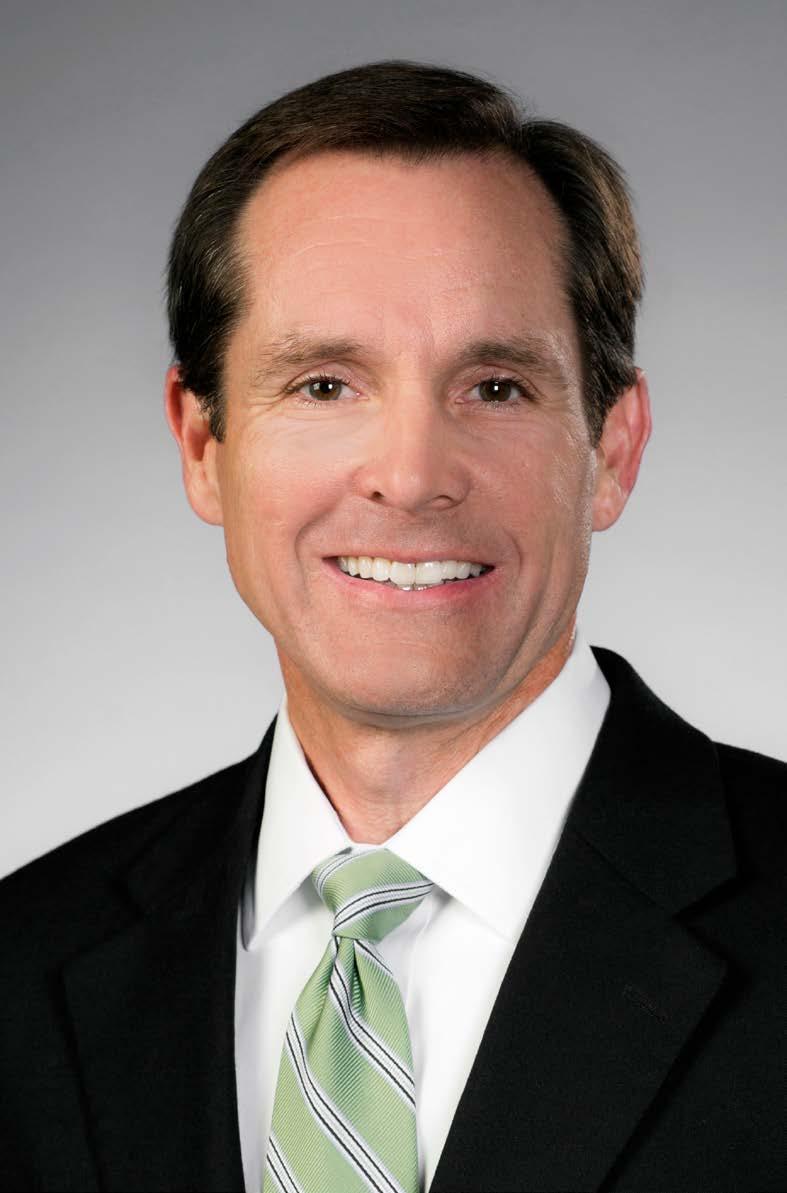
How did your time as a judge prepare you for in-house legal work?
Being a judge hones your decisionmaking. Your only goal as a judge is to get the right answer. You worry at first: are you going to be biased one way or another? The job has a way of stripping that out of you.
The other aspect is, you are dealing with people’s lives, especially on the criminal end of it. Watching legal dramas on TV every day, those decisions may not seem that big, but they’re
Lane Wilson SVP and General Counsel
The Williams Companies
huge. You may be taking someone who has never spent day of his or her life in custody and putting them in jail while they wait for trial. It makes all other decisions a lot less stressful.
Does your time on the bench impact the way you oversee compliance?
In the end, all of these are just disagreements between people. As a judge I handled mediations, and in federal court, those often involve regulatory agencies, state governments and local governments. These mediations were all confidential, so I got a back-seat look at how regulatory agencies and state agencies really operate and make decisions. They invite you in because they want to convince you their position is the right one. I am still coming up to speed on this—I don’t know as much as the really good people working for me—but I did have a good feel coming into this job.
What do you miss the most about being a judge?
The hardest transition has been total and complete loss of control over my time. As a judge, nothing is put on your docket unless you say it’s going on your docket. My calendar was my calendar, and if I needed to miss a hearing, I just moved it. Attorneys don’t call and say, “This is really inconsiderate.” They just say, “Yes, Your Honor, whatever you want.” While doing this interview, I will have had three or four items added to my calendar—none of which I can cancel.
Any regrets?
None. I am having a blast here. Life is full of different opportunities. I miss aspects of being on the bench, but I am challenged every day and couldn’t ask for anything more.
By Kelli Lawrence
The challenges of Elena Branzburg’s immigrant upbringing and the many evolutions of her career have made her an ideal “legal athlete” for PIMCO

ELENA BRANZBURG BEGAN MAKING HER WAY TO the United States from Ukraine (then part of the former Soviet Union) at the age of seven. It was such a complex process—“making our way over to America, country by country, constantly being in unfamiliar territory,” she recalls—that she’d celebrated another birthday before her family finally settled in Salt Lake City, Utah.
Something was gained in the trek, though. Branzburg’s familiarity with the unfamiliar now helps her deal with change better than most, particularly in her career. And, in fact, she loves it. “If a software update is available, I immediately want to get it,” she jokes.
When her interest in international business law took flight, she first landed an internship at a conservative think tank in Washington, DC. She quickly learned, though, just how superficial and sexist such a space could be. In her exit interview with the adviser of the internship program, she received high praise for her writing and research skills, but it came with the advice that she’d have to be far superior to her colleagues if she ever wanted to be remembered for more than her looks.
“We had a lively debate about that,” she says, laughing. “I do think he was trying to be helpful. He wasn’t saying it maliciously; that was the funny part. He actually thought he was giving me good advice. But I decided if that was the reality of the DC world, that wasn’t the world I wanted to be in.”
So, Branzburg set her sights on the West Coast, finding along the way that commercial real estate law piqued her interest, and she studied it further during her time at UCLA School of Law. The only problem was that this new interest came in 2008, as the United States fell into a recession that proved highly discouraging to most aspiring real estate attorneys. Fortunately, Branzburg had accepted an offer to join Paul Hastings LLP (after completing the firm’s summer associate program) just a month before the trouble erupted, allowing her to avoid the layoffs and rescinded offers that plagued some of her peers.
When she joined Paul Hastings at the start of 2010, the recession wasn’t yet over, but Branzburg remained dedicated to her field of choice. “I think it was actually a great time to learn to be a real estate attorney,” she says of those days. “I worked on a lot of workouts
“My ability to be comfortable in a new arena probably comes from having to become comfortable in new arenas so many times in my life.”
and restructurings; I handled multiple settlements between JV partners and lenders. You could see why having the right documentation and the right language mattered when things went bad.”
Her persistence—to say nothing of her experience—paid off five years later, when California-based investment-management firm PIMCO invited her to join its growing legal team in 2015. The opportunity to move into a newly created position appealed to Branzburg, but PIMCO was also looking for attorneys who could be flexible, who could pivot, who could leap into an area of law relatively new to them and make it their own. They call such people their “legal athletes.”
“My ability to be comfortable in a new arena probably comes from having to become comfortable in new arenas so many times in my life, constantly, at a young age,” Branzburg says. “It was about watching my parents thrive in completely foreign places, rising to a challenge rather than shying away from it.”
Still, it doesn’t mean Branzburg hasn’t had some anxious moments. She recalls that her earliest days at PIMCO included a running list of all the new acro -
Elena Branzburg SVP and Senior Counsel PIMCO


Senior Vice President, Senior Counsel, PIMCO
We are honored to work with PIMCO, and we congratulate Elena on being selected for a profile in Modern Counsel.
With respect, your friends and colleagues at Manatt.
Manatt, Phelps & Phillips, llp manatt.com

nyms she was learning (“It came to about forty,” she says), and the job sent her into plenty of situations where she didn’t immediately know the right thing to do.
“The first year here was a little daunting,” she says. “You don’t know what you don’t know, right? But we all work as a team. The head of our group is a phone call away; everyone’s a phone call away, and it’s great to be able to pick up the phone and ask people with more expertise their opinions.”
Since becoming a legal athlete at PIMCO, Branzburg has developed all-new areas of interest and has excelled at her job. She was even promoted to the position of senior vice president and senior counsel last year. In addition to her work with the real estate team, Branzburg has particularly enjoyed working on private equity transactions because each deal provides an opportunity for her to understand the inner workings of an entirely new business. That’s perfect for an attorney as challenge driven and successful as she has become— and the work is a solid rejoinder to what she was told during her first internship.
“I have learned,” Branzburg says, “that I can thrive as a woman in a very male-dominated field and be taken seriously for my abilities and hard work, which is a great feeling.”
Manatt, Phelps & Phillips, LLP:
“It is always a pleasure working with Elena. She is sharp, levelheaded, responsive, and business minded.”
—Steve Edwards, Partner
In conversation with Craig Opperman
By David Levine
Craig Opperman knows rote patent protection is no longer adequate to protect innovation in today’s corporate world. His team’s mission at Lam Research is to design and build business-relevant corporate assets, rather than merely focusing on a by-the-numbers obtaining of legal rights unconnected to the business. It’s a core undertaking for the Fortune 500 semiconductor equipment manufacturer and Opperman is applying his proactive approach as vice president and chief intellectual property officer to ensure protection for the global supplier’s cutting-edge semiconductor wafer-processing technologies.
A native of South Africa, Opperman moved to Silicon Valley in 1991. With guidance from great mentors, he gained valuable experience working at some of the world’s leading technology law firms and in-house, first in the US, then in Europe. He returned to Silicon Valley to join Lam in 2017 and is now applying what he learned to protect IP and manage risk at Lam.
To do so correctly requires a crucial mind-set change within the legal department, according to Opperman. Most companies look to file lots of patents hoping some will be useful for protecting their products from copycats and other infringers; he calls it the “spray and pray” model. Opperman prefers a focused asset-based model, where IP assets’ quality, value, and relevance—not their number—are the primary drivers. Modern Counsel spoke with him about why this asset-centric approach makes more sense for Lam.
You’ve said that patent protection is like building houses. How so?
Think of a patent as a house. The walls define the patented exclusionary zone. Now, in the housing industry, if you are going to develop a tract of land, the first decision to make is whether you are going to plop in lots of cheap houses without much architectural design-input—call them tract houses—or, alternatively, build fewer well-positioned and well-designed houses. That’s the difference between a volume-based patent approach— focused on getting houses built but not necessarily strategically positioned— and an asset-based philosophy, where you need to ask a bunch of questions beyond what clever invention must be protected and have a team with an expanded toolbox of skills.
What are some of the skills you believe are essential?
You have to have people who think like designers and architects. Does this house face in the right direction? Does it have all the right rooms? Is it located correctly? My personal philosophy is that focusing on lots of tract houses is a disservice. Having lots of patents costs a lot in maintenance fees. Think of them as property taxes. Volume patenting drives huge maintenance costs. With fewer and better-positioned patents, you pay more up front, but your portfolio is much more relevant and your back-end costs are much lower.
What do you mean by “relevant”?
Relevant to innovations actually in your products. The standard way of getting a patent is to protect an invention. But, if you don’t protect how that invention makes its way into or evolves in the product, the result is a patent-product

Craig Opperman VP and Chief IP Officer
Lam Research
misalignment. You have a house that doesn’t surround or even put a roof over the invention.
The tech industry has created tens of thousands of such misaligned patents. It’s a result of the patenting process. Typically, it takes a few years after filing for a patent application to be examined. By then, the inventors are on to their fourth, fifth, or more project and aren’t sure whether or in what form their invention has made it into a product. So, when the patent office inevitably rejects the first version of the patent application, the patent attorney and inventor respond with amendments to overcome examiner arguments, often without checking on relevance. In effect, they change the house plans without thinking about positioning.
The asset-based approach is entirely different. At every step of the patenting process, the questions become “Is this valuable?” and “Is this relevant?”
“To build relevant assets, you need people with broad business skills, people with vision, like architects.”
What different skill sets are required for this model of asset protection?
The tract-house model is a commodity model. Price per product and numbers of patents are the primary drivers. In contrast, quality and relevance drive the asset model. In a commodity business, many people do the same task over and over. Efficiency at repetitive tasks is valued. But, to do what we are doing requires much broader skills. Team members have to be creative. They must understand our technology in the context of our business and thus understand the business relevance of our IP. They must interact more with inventors and also with business people. It is easy for tech people to geek out with other tech people about technology. Good patent attorneys love to do that. But, talking about business relevance is difficult. The team needs people with broad communication skills, people with vision and design ability, like architects.


Beyer Law Group LLP is a Silicon Valley based intellectual property law firm specializing in patent and trademark preparation, prosecution, opinion work, advice, and counseling. We are headquartered in Palo Alto, California, with satellite offices located in Minneapolis and Tucson. Each of our practitioners has at least 20 years of patent prosecution experience. Our firm was founded over two decades ago by a group of attorneys with the goal of providing the highest quality services to clients in a collegial work environment. We have been proud to count among our clients numerous Fortune 500 companies, as well as some of the most innovative inventors in Silicon Valley and the world.
PATENT PREPARATION & PROSECUTION
DESIGN PATENTS
REEXAMINATION
LITIGATION & TRIAL SUPPORT
OPINIONS OF COUNSEL
STRATEGIC COUNSELING
DUE DILIGENCE
MPG is honored to serve as a trusted IP partner of Lam Research Corporation for over 20 years. Working with Craig Opperman and his IP team has been a privilege. Craig is a creative legal thinker with an unparalleled ability to communicate and execute big picture IP strategies. Under Craig’s leadership, MPG has continued to form strong working relationships with Lam’s inhouse IP team, which allows us to execute more efficiently and deliver higher value services.
How do you get your team on board with this model?
Our emphasis is business, technology, and law—in that order. Business first. Our challenge— and I must say, the Lam team is really good at this—is how to get everyone to focus on the asset’s value to the business rather than the technology. That takes continually reminding the team, the managers, and engineers that we are here not just to protect an invention but to protect an innovation as it is deployed in the marketplace.
beyerlaw.com
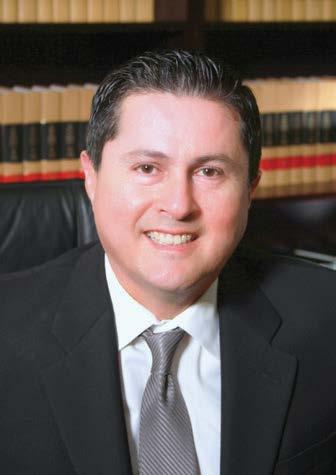
Patent Prosecution Done Right!
Silicon Valley Offices
710 Lakeway Drive, Suite 200 Sunnyvale, California 94085

We merely ask a single question: “Is this valuable or not?” That’s it. Don’t ask a legal question, only a business question: “What is valuable to the market? To the customers?” Sometimes it is clever stuff. Sometimes it is not so clever. When the focus changes from inventiveness to value, the whole way you approach patents changes. Every step of the way, we continually ask, “Is this house positioned to cover something valuable?”
Carlos M. Brown, a civic leader and the top lawyer at Dominion Energy, has transformed his position from one of sound legal counselor to trusted business confidante
By Jeremy Borden
CARLOS M. BROWN AND MANY OTHER
in-house attorneys know the old adage about law departments: “it’s the place where business ideas go to die.”
Brown, vice president and general counsel at Richmond, Virginia-based Dominion Energy, the nation’s third-largest combined energy utility, has worked hard to change that in his ten-year tenure at the company. Part of that transition has been by design and part by necessity, thanks to the company’s acquisition of natural gas transmission and distribution companies, its push into solar and wind generation, and its complex transactions that Brown has had to facilitate.
“We’ve tried to work aggressively to make clear that were not just the ‘No’ department,” Brown says. “If we have to say ‘no,’ we try to add a ‘but’ and attempt to provide alternative solutions. At the end of the day, our clients are never upset when we help them craft a more legally sound solution that achieves their business objective with less risk.”
Dominion’s innovative nature and its expansion of its operations and offerings have pushed the change along. When the company built its solar program; started its smart-grid business, Dominion Voltage; and pushed energy alternatives funded through a venture capital fund, for instance, it turned to Brown for advice. Before Dominion, he’d worked as the company’s outside counsel and in the private equity world, and he found himself drawing on that background as the company expanded and developed these new businesses.
A part of Carlos Brown’s ongoing focus at Dominion Energy is stressing diversity and inclusion. As one of the founders of Dominion’s African American Resource Group and the local Richmond, Virginia, chapter of the American Association of Blacks in Energy, Brown has served as a resource for company leaders, working to ensure that diversity and inclusion are a part of the culture. Brown has contributed to the effort by:
• Involving employee resource groups. ERGs help companies involve more stakeholders in key decisions, including those related to hiring and diversity practices. “ERGs create spaces that allow employees to feel ownership of and in the company,” Brown says. “And in return, that allows the company to harvest their energy, ideas, and ambassadorship.”
• Getting buy-in from the top. Diversity practices have to be put in front of corporate leaders as a top priority. “What we are demonstrating is that we have a level of leadership and institutional commitment from the very highest level,” Brown says. “That means something to our colleagues.”
• Encouraging the use of diverse suppliers. “Diverse suppliers bring diverse perspectives and ideas and allow you to be closer to your customer and/or your stakeholders,” Brown says. He believes that diverse teams produce better outcomes, both in business and in the law.
Ultimately, Brown feels Dominion is making progress on its diversity initiatives. “There are always opportunities for improvement,” he says. “We get better every day.”
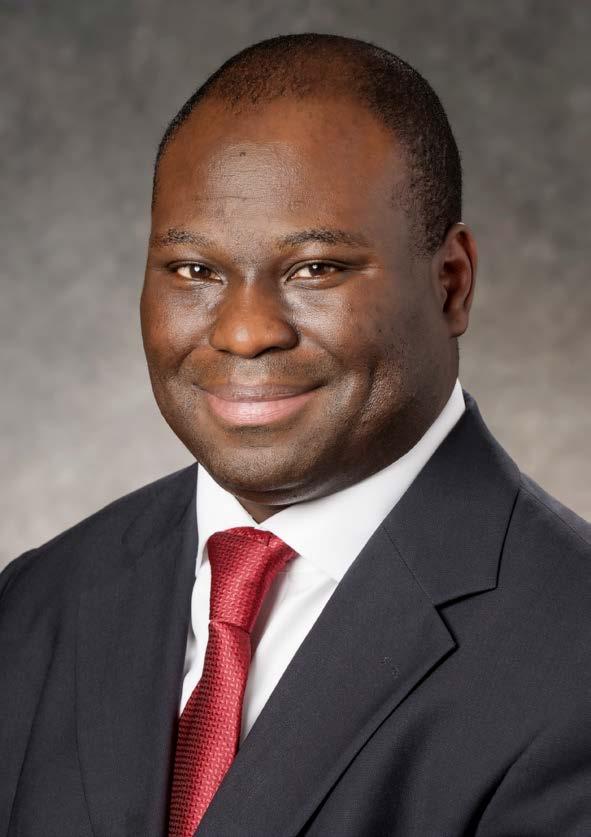
It’s an example of how drastically the role of in-house counsel has changed at Dominion. “Your in-house clients want you to make them feel safe,” Brown says. “When they step into some unknown territory, they want a guide. Even if you don’t know the answer, you can communicate about how you can help them get to an answer. They rely on that. In the past, we may have discouraged the pursuit. In our current culture, it is expected that we be a partner in helping the clients figure it out.”
The ability of Brown and his team to be reliable business partners as well as trusted advisors also came into play when their company developed a portfolio of natural gas midstream assets. One of those assets was the Cove Point Liquefied Natural Gas Plant. Cove Point was the first time that a company had converted an LNG import facility to an export facility. Dominion’s team of lawyers developed a structure and contractual arrangements that had never been used in that space before. “Our team ‘Dominionized’ the LNG business in a way that created tremendous value for our shareholders,” Brown says. “We don’t take anything off the shelf and do it in exactly the same way.
Carlos M. Brown VP and General Counsel Dominion Energy
In that way, we can create value where it might not have existed.”
The approach serves Brown and his team well. “The practice of law is not done in isolation,” he says. “Legal issues and business issues are connected. One of the things I am suspicious of are individuals that want to get a legal answer in isolation. For example, if you file a lawsuit opposing a solar development when you are trumpeting your sustainability initiatives, what does that communicate? The question is not merely ‘Is it legal?’ It’s also ‘Is it right? Is it ethical? Does it support your brand messaging?’”
For Brown, at least, it’s about opportunity. “It’s about understanding the business—here are the opportunities that exist, and here are the options to get there legally,” he says. “We like to participate in that decision-making process.”
Harrell & Chambliss, LLP:
“Carlos is a passionate and bold leader as well as a valued partner. With Carlos as general counsel, Dominion is expertly navigating a myriad of legal issues while providing and effectively managing meaningful opportunities for a diverse and talented team of outside counsel.”
—Nancy Griffin Chambliss & Adam N. Harrell Jr., Co-Managing Partners
Troutman Sanders:
“Carlos runs an efficient law department, and we appreciate that he is able to pull from his extensive experience in both the legal and business worlds to find practical solutions to complex issues.”
—Mason Bayler, Partner
Steptoe & Johnson LLP:
“We are very grateful to work with Carlos and his colleagues. Dominion’s dynamic businesses spawn complex legal, regulatory, and policy issues, and Carlos brings Dominion’s values of leadership, integrity, diligence, and critical and strategic thinking to every matter— and he does so with poise and good humor. We thank Carlos also for his leadership in the broader legal community in advancing diversity and expanding opportunities for lawyers of all backgrounds, genders, races, ethnicities, and sexual orientations.”
—Charles Mills and Steven Ross, on behalf of the Steptoe & Johnson LLP team
H&C has a team of eleven attorneys who have the professional depth and technical support necessary to provide the highest caliber of legal services. Our Firm is engaged in the general practice of law with a diverse client base that includes several large corporations and public sector entities.
AREAS OF PRACTICES
Public Finance & Structured Finance Transactions
Banking
Corporate/Business & Tax Law
Contract, Procurement & Education Services
Commercial Litigation & Insurance Defense
Real Estate
Energy Law
Employment Law
Administrative/Legislative
Creditors’ Rights, Bankruptcy & Foreclosures
Telecommunication & Information Technology Continuing
Richmond, VA
804-643-8401
Newport News, VA 757-926-5350
www.hclaw rm.com
In conversation with Cassandra Gaines
By David Levine
Cassandra Gaines has built her legal career in the transportation industry, so it’s apt that she has recently made some big moves of her own. After spending most of her career in-house, she has packed her files and gone back into private practice.
She has brought with her an abundance of practical knowledge from her various corporate roles. For a time, she was the lead in-house attorney and director of cargo security for Echo Global Logistics, one of the largest transportation brokers in the industry. And after that, as associate general counsel of risk management at Schneider National Inc., one of the nation's largest transportation providers, she oversaw more than two hundred attorneys and was responsible for the outcome of all claims and litigation arising from the transportation of goods.
But, in 2018, she decided to go private, first as a litigator on the transportation and logistics team at the firm Smith Moore Leatherwood, then by opening her own practice, Gaines Law Group, in Atlanta. Here, she speaks on her past experience, her recent transition, and how her former and current work compare.
Why did you want to leave an in-house position and return to private practice?
As in-house counsel for different companies, I managed hundreds of lawsuits and outside counsel across the country. I also gained experience managing various departments engaged in risk-management activities. I love teaching and sharing my knowledge, and now that I am outside counsel, I have the ability to help many companies instead of just one.
What are the key differences between in-house and private practice work?
As in-house counsel, your schedule, working environment, and the substantive work is controlled by one client. As a result, your world can change in a New York minute, depending on who is leading the company. In addition, the majority of your day is spent solving problems, managing people, and being a politician.
In contrast, at a law firm, the majority of your day is spent practicing law and flexing your legal skills. Also, you have more control and consistency in your work environment, the substantive legal work, and your schedule.
Lastly, as a partner at a law firm, you are considered a profit center, whereas in-house you are a cost center and must constantly demonstrate your worth.
What are some of the particular strengths required for in-house work, especially at large companies?
First, you must have strong emotional intelligence. Depending on your position, success arises from understanding the surrounding relationships in your work environment. In addition, you must understand your colleagues’ incentives and the impact that your advice and actions will cause. Second,
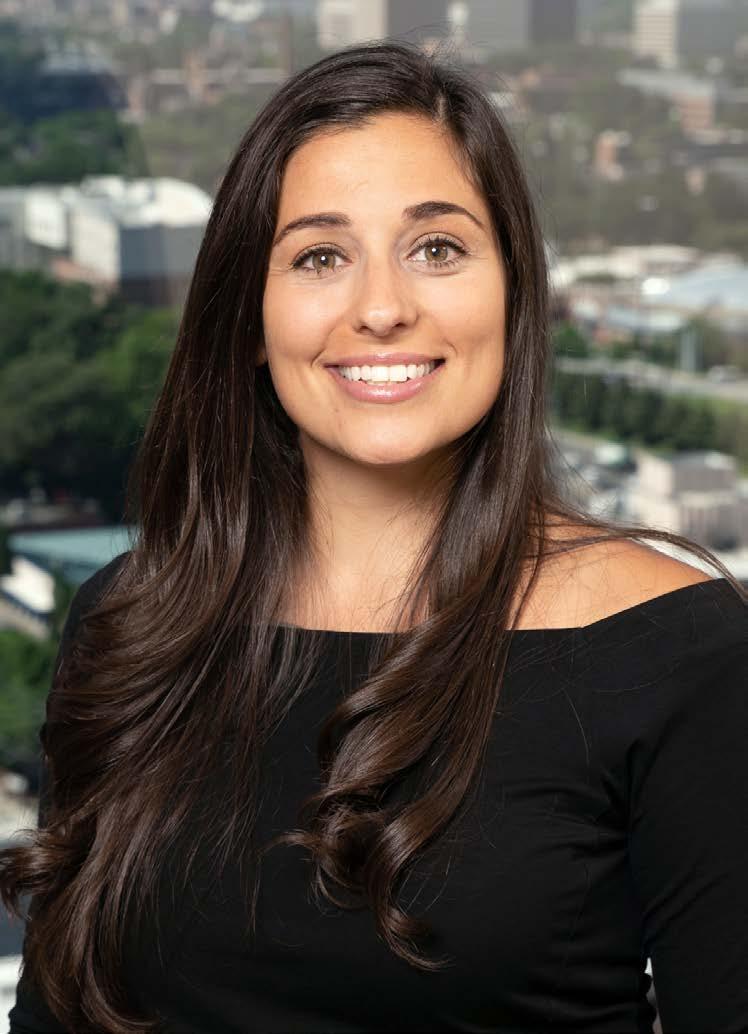
you must also have strong analytical skills and strong substantive legal knowledge. Problems will quickly arise and you must be able to distill complex information, know which issues are truly urgent, understand the politics of the issues, and provide advice and make the right decisions for the company. And, you must be strong in communication. Properly articulating your legal advice in a persuasive manner is important. Your style of communication will change depending on the department and the audience you are working with in the company.
What particular strengths are required in private practice?
First, lawyers at a law firm are often required to retain a lot of information. They don’t have the luxury of calling another attorney and asking for legal advice. Moreover, in-house counsel will call outside counsel out of the blue and ask various legal questions that are urgent. Often, outside counsel do not have the opportunity to research and are expected to know the answer immediately.
Second, outside counsel must constantly monitor time and understand where their efforts are best spent. In-house counsel often can work overtime on an issue, but outside counsel will not get paid for overworking an issue.
Cassandra Gaines Founder Gaines Law Group
How has your past in-house work with multibillion-dollar companies informed your approach to your private practice work?
I provide cost-effective and creative solutions for my clients because of my experience. I take more time to learn about my clients’ business and try to make my clients look good and make their job easier. I am also sensitive about billing practices and understand what angers clients when they receive certain legal invoices.
In your return to private practice, have you found that you prefer it to being in-house with a company?
Yes. I prefer being outside counsel because I can help more than one client. I am lucky in that I have such a unique experience, which makes my law firm unique. I have not met another attorney with my level of experience, and I enjoy using that experience to improve my clients’ business and solve their legal issues.
Why did you start your own law firm?
I want flexibility to provide different services and rates to my clients. Sometimes large or midsize firms have obstacles—such as office politics, certain billing practices, and mandatoryminimum rates—that prevent a lawyer from providing certain rates and unique services. I want the flexibility to offer my clients various services such as claims processing and risk-management consulting.
Marshall Investigative Group: “We at Marshall Investigative Group have had the pleasure working with Cassandra as both an attorney and an executive in the transportation industry. We look forward to our continued relationship.”
—Matt Mills, Vice President


By David Levine
Thorntons’s Shelly Gibson is strengthening the people-first culture at one of the top independent convenience store retailers in the United States
AS THE NATIONAL CONVERSATION spotlights illegal discrimination and sexual harassment more than ever before, leaders of the business world are establishing thoughtful procedures to secure positive employee experiences. One such leader is Shelly Gibson, who is revolutionizing the $2.4 billion convenience store and gas station chain, Thorntons, with a multiyear strategic plan featuring comprehensive workforce training and an entire policy handbook overhaul.
“With the public becoming more educated about their legal rights, and with the #MeToo movement, companies need to focus on making their whole team aware that these issues are important,” says Gibson, chief legal officer and general counsel at Thorntons. “Out in the field, we all need to treat customers with dignity and respect and put biases aside—sometimes we don’t even know we have biases.”
Founder James Thornton established the first Thorntons store in 1971 in Clarksville, Indiana, and today the privately held company spans 192 stores across six states: Florida, Illinois, Indiana, Kentucky, Ohio, and Tennessee. Now based in Louisville, Kentucky, Thorntons has cultivated its people-first culture through the decades to provide on-the-go customers with top-notch food, drinks, and fuel for their journeys.
Gibson’s own journey at Thorntons began in 2007, as its associate general counsel. Prior, she had spent about eight years as a felony state prosecutor and earned her JD at the Indiana University School of Law–Bloomington. “The associate GC, who I knew, was moving to a business role,” Gibson says. “He asked if I was interested in submitting a résumé. I didn’t have any big law firm or corporate experience, and it was
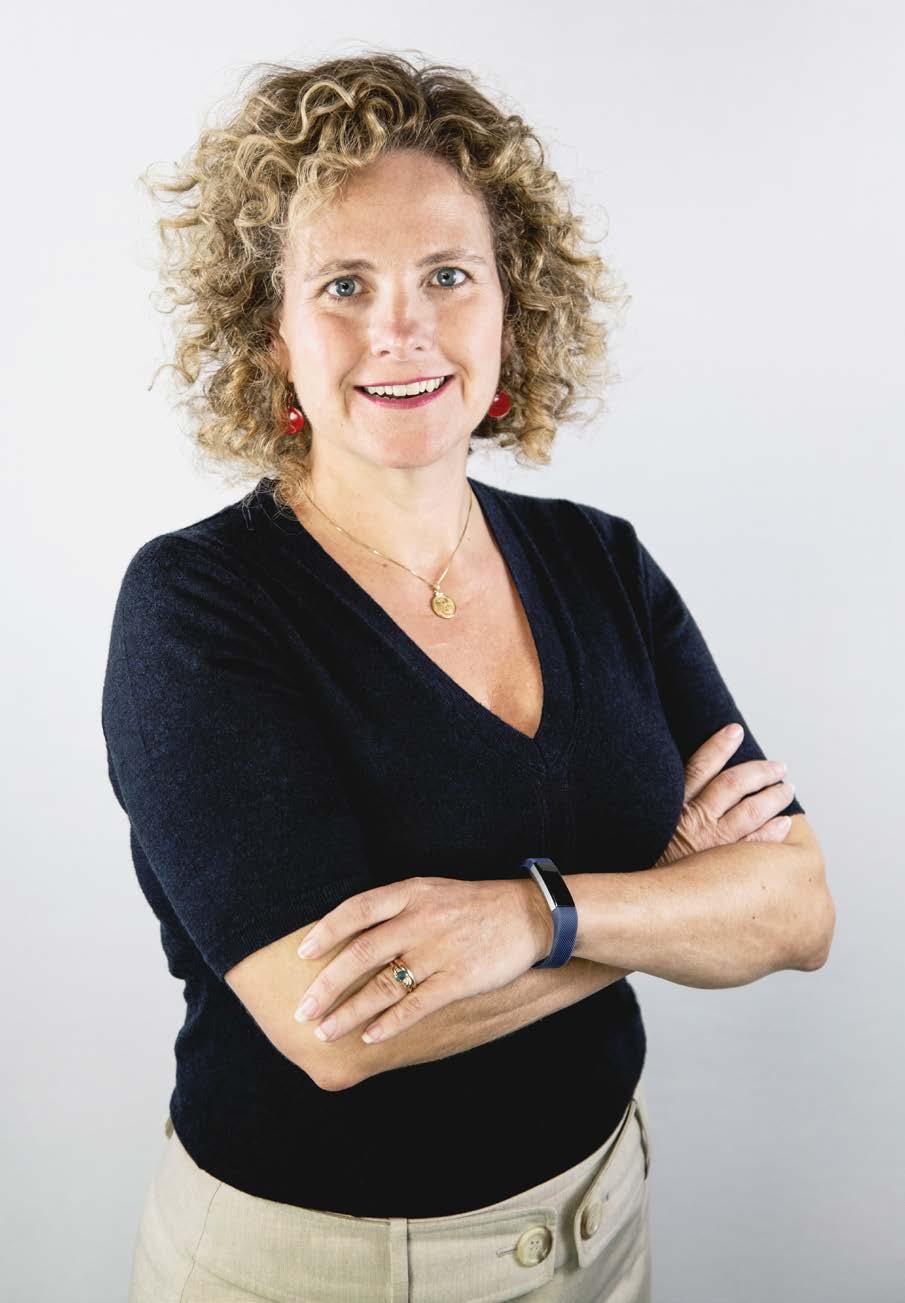
in an industry I knew very little about, but they thought I would be a great fit.” She was named general counsel in 2014.
During her eleven-year tenure, the legal leader observed that new policies had been put in piecemeal, and there was no overall view to see if they conflicted. That’s when the need for a company-wide team member handbook emerged. “They had not been looked at as a whole in at least a decade,” Gibson says. “We want to ensure that everything makes sense, everything flows, and clear out old policies that don’t make any sense anymore. What if someone has dog and you don’t know if it’s a service animal or not? Or, what if the dog is not behaving well, barking, or roaming around the store? Some of our stores sell fresh, hot food, and people worry about the dogs getting into the food. We teach them how to handle those situations.”
Today, attorneys in the legal department teach a three-hour legal seminar in each market once a year. All store managers attend the seminar at least once every two years. “We have an attorney teach the class, spending the first half of the seminar just on illegal discrimination and sexual harassment laws and hypothetical situations,” Gibson says.
A field manager from human resources often attends as well. “They are great at bringing up hypothetical scenarios because they are in the field every day and know our team’s challenges and concerns,” Gibson adds.
Shelly Gibson Chief Legal Officer and General Counsel Thorntons
Having an HR representative also shows that this transformation is a collaborative effort. “We want all those people there so that the managers understand their bosses and HR think this is important, not just the legal department,” Gibson says. The policy

Goldberg Simpson congratulates our friend, Shelly Gibson, on being recognized for her efforts to make Thorntons a great place to work, and for her leadership in steering litigated cases on behalf of the company. 9301 Dayflower St. Prospect, KY 40059 (502) 589-4440 goldbergsimpson.com
transformation is also aligned with the company’s six core values: “Delight Our Guests,” “Passion For Details,” “Restless Dissatisfaction,” “Everyone Counts,” “Cheer For Each Other,” and “Have Fun.”
She points to two values in particular. “We want all our employees to know they count, and we want them to have fun with each other,” Gibson says. “We all try to live up to those values.”
Now Gibson and her team are collaborating with human resources on ways to train the frontline staff on these issues effectively and efficiently. “The hourly team members are, for the most part, the face of our company,” she says. “We are a retail company, dealing with guests every day. The vast majority of our stores are open 24-7.”
Cultivating a culture of respect through these policies is top of mind for Gibson. Her team is also updating in-house policies by tweaking some of the language. The result? Thorntons’s policies cover all the legal bases but also are easier to understand. The goal is to illustrate clear examples of specific behaviors that are not allowed.
“This is also about how team members interact with each other,” Gibson says. “We want every store and office team to enjoy work, and how team members treat each other is huge in creating a well-run workplace with a team-oriented environment. We want them to be proud of who they work with and where they work. That’s a recipe for success.”
Fred Holc is building an award-winning commercial legal team for Abu Dhabi National Oil Company, one of the largest energy producers in the world
By David Levine
ONE OF THE LEGAL MINDS BEHIND A Middle Eastern powerhouse, Fred Holc is helping to shape the future of the oil and gas industry in the Emirate of Abu Dhabi. His employer, the state-owned Abu Dhabi National Oil Company (ADNOC), produces three million barrels of oil and about ten billion cubic feet of natural gas per day, and Holc is spearheading its commercial legal team, responsible for managing its everyday business and adapting its portfolio to the ever-changing global energy landscape.
Born in Switzerland and raised in Poland, Holc attended the American School of Warsaw and studied in New York as part of an exchange program before going to university and law school in England. The opportunity for yet another new destination emerged in 2006, when he was working as an attorney in London for global law firm
Shearman & Sterling. The firm needed an additional lawyer on location in the United Arab Emirates (UAE)—the site of its client, ADNOC.
“Without thinking, I was the first person with my hand up, though I barely knew where Abu Dhabi was on a map,” Holc says. “It sounded like an amazing adventure.”
After Holc landed in the Persian Gulf, that adventure turned into a lasting career. Now, as the general counsel heading up ADNOC’s group corporate and commercial legal department, Holc is responsible for all of the company’s transactional work across the oil and gas value chain, including mergers and acquisitions, capital markets, and concessions. Holc is one of the architects of the current concession model used for all oil and gas concessions across the emirate.
Fred Holc General Counsel, Group Corporate and Commercial Legal Department
Abu Dhabi National Oil Company

ADNOC has been producing and preserving the UAE’s hydrocarbon reserves on behalf of the government since 1971, and it was the first client that Holc worked for upon his arrival in the country, which is not surprising, given that the company had been a client of Shearman & Sterling since its inception. “It was a long relationship that I was fortunate enough to stumble upon, which turned out to be a pillar of my twelveyear career in the UAE,” Holc says.
Holc learned the oil and gas business from his mentor, Philip Dundas, Shearman & Sterling’s former managing partner in Abu Dhabi. “I really liked private practice,” Holc says. “They were amazing guys. I was literally off the plane and immersed in the industry. It was all about oil and gas, and
ADNOC was one of our main clients in the country.”
Within a few years, Holc was spending 95 percent of his time on ADNOC matters and was closely integrated with the company’s management. “At one point, I received an offer that I couldn’t refuse,” Holc says. “The current group chief legal counsel, Salem Al Darei, who had done a twoyear placement with Shearman & Sterling and had just taken over leadership of the legal division, asked me whether I would help him create a world-class legal function and be responsible for developing and managing a transactional legal department—certainly a once-in-a-lifetime opportunity.”
Holc has been building that department for five years. While he is now
managing close to twenty lawyers, he is still searching for talent to support the high amount of work required at the organization. “Everyone is working around the clock,” he says. “I was extremely lucky to find the people we have today. We have an amazing team, but we are not at the end of the road. We need to continue to grow to keep up with the demands of the business.”
Even with a lean department, Holc’s legal team is making a massive impact on the company’s growth trajectory. Recently, GFC Media Group named ADNOC’s $3 billion bond offering for a crude oil pipeline the “Finance Deal of the Year,” and the International Financial Law Review recognized the ADNOC Distribution initial public offering as the 2018 “Equity Deal of the Year.”
Holc’s priority is to make sure every deal is “owned” by a legal team member, who is on top of every element of that deal. “We still need a lot of external legal support, but we need to be the driving force because no one knows ADNOC’s business like we do,” Holc says, adding that he is extremely selective in whom he hires. “The technical expertise is, of course, paramount, but that is not enough. They have to be the kind of person who understands this world and can really help drive the business, instead of being the stereotypical blocking function.”
This philosophy has paid off. The ADNOC legal team recently earned the Association of Corporate Counsel Middle East’s Achievement Award, which recognizes individual excellence as well as the advancement of law in the Middle East and contributions to the society’s social welfare. ADNOC was particularly lauded for its scholarship and training program for young Emirati lawyers.
“We send them to the United States or United Kingdom to do their legal studies, mentor them, and place them in training programs,” Holc says. “My current team largely consists of expats, but we are actively looking for excellent local talent and are very focused on molding the next generation of local lawyers.”
Holc concludes that “none of this would have been possible without Salem Al Darei’s vision and huge support. He has always been very clear as to where he wants the legal function to be at the end of this journey.”
Shearman & Sterling:
“Fred has a powerful combination of sound judgment, strong commercial sense and the ability to lead his team with single-minded focus and vision. He’s also one of the nicest people in the industry.”
—Ben Shorten, Partner
With approximately 900 lawyers in 22 offices globally, we provide our clients the legal advice and industry insight needed to navigate today’s challenges and achieve their future goals.

IT WAS
OF WOODWORKing that got Stuart Gray involved in the construction industry, it was his love of teamwork that ultimately led him to his role as general counsel for Roseburg Forest Products. As a carpenter, his hands-on familiarity with the product and its uses keeps his attention on the business’s prime focus; as a lawyer with an MBA, he’s now helping the venerable wood products manufacturer navigate its way into the next decade.
Based in Springfield, Oregon, Roseburg has grown into a company worth more than $1 billion since its founding in 1936. Started as a single sawmill, the privately held company has taken on nearly 600,000 acres of timberland and more than 3,500 employees in more than 200 communities across North America. One such employee is Gray, who is advancing the company’s legacy into the future through the expertise he’s cultivated throughout his career.
During law school, Gray aspired to be an in-house attorney because he wanted the camaraderie of “building together”—a similar sense of teamwork he experienced as a woodworker. Yet when he learned that new lawyers are rarely an optimal choice as in-house counsel, he accepted a role on the litigation team for a construction law firm. That position afforded him both insights into the nuances of the building industry and a leg up into his next job as corporate counsel for the Home Depot.
By Pam Sornson
Transitioning from a tradesman to a legal leader, Stuart Gray has embedded himself in Roseburg Forest Products’ business to push camaraderie and teamwork that’s spurring new growth
At the Home Depot, Gray litigated construction cases for the first few years, then shifted into a role as the dayto-day business attorney for the Home Services construction business. There, he found the teamwork and collaboration that he was seeking. “I’ve always enjoyed the sociability of being a con-
tributor to a larger project,” Gray says. “Collective wisdom is always better than that of the individual, and outcomes are better when people collaborate to create solutions.”
Gray was promoted to assistant general counsel at the Home Depot, and he soon realized his education wasn’t quite complete. He thoroughly enjoyed the team aspect of participating in executive meetings as a legal adviser, but he knew he could do better if he had as good a grasp on business as he did on the law. So, Gray earned an MBA from the Sloan School of Management at Massachusetts Institute of Technology.
That credential also helped him land a position as vice president and deputy general counsel at Sears Holdings Corporation, according to Gray. There, among a number of other duties, he worked on the business side of the ubiquitous Craftsman brand of woodworking tools. The experience equipped him with a unique combination of construction, legal, business, and teamleadership skills that ultimately brought him to Roseburg. Singled out in a national search, in 2017, Gray moved his family from Illinois to Oregon to not just assume the role of senior vice president and general counsel but also to invent the position in a company that had gone without one for more than eighty years.
So far, the arrangement is working out better than he could have imagined. “This is the highlight of my career,” he says. “After almost twenty years in the construction law business, this has been the most rewarding role I’ve ever had. I love the industry, the company’s team leadership style, its place on the corporate maturation curve, everything.”
The legal leader is particularly impressed with Roseburg’s corporate
Stuart Gray General Counsel Roseburg Forest Products
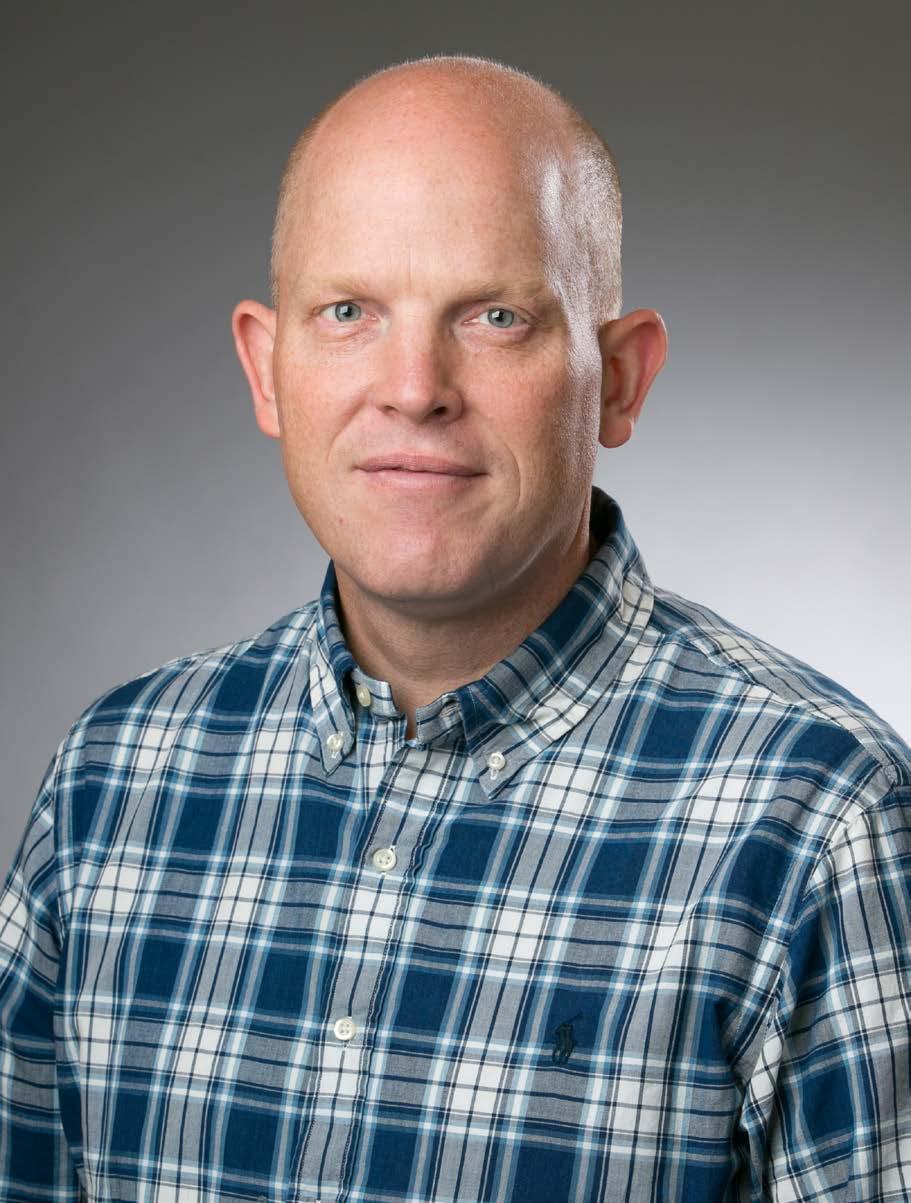
“Collective wisdom is always better than that of the individual, and outcomes are better when people collaborate to create solutions.”
focus on sustainability. “We are tree farmers and manage our farms like other farmers manage theirs,” Gray says. “We harvest 2 percent of our six hundred thousand acres each year, which translates to roughly a fifty-year harvest rotation, and we plant more than five million trees annually. We add more trees than we harvest each year, and our forestry management practices help mitigate the risk of fire losses.”
As for Gray, he’s enjoyed the legal adventure, too. Initially, he focused on integrating with the business while creating a single, reliable legal point of contact for his business team members. His colleagues quickly came to trust him because of his collaborative team-building skills, his sense of urgency, and his swift responses to all inquiries. The resulting ongoing business and legal collaborations have reduced risk and accelerated the resolution of legal issues across the company’s timberland business and its thirteen manufacturing facilities.
Gray has also built a lean team to help him manage the legal details of the company: an environmental attorney, a regulatory professional (for compliance and sustainability concerns), and a highly experienced paralegal. From a business perspective, he also leads the company’s strategic business development, transportation and logistics, and national accounts business teams. And, as a member of the executive team, he has taken an active role in crafting the company’s strategic activities for the next six years.
“What undermines the effectiveness of the traditional in-house counsel role is that it is too often siloed away from the business functions and consulted late in the work process,” Gray says. “This creates an internal disconnect that causes unnecessary surprises, waste, risk, and delays. Collaboration and teamwork throughout the work process reduce risk even as innovation is occurring. And, it speeds the production process by handling legal concerns
as they develop, not after they’ve been embedded in the product.”
With this proactive approach and a track record of successful projects, Gray is creating an ideal blueprint for Roseburg’s future growth. His legal team is partnering up with others across the business to fortify Roseburg’s legacy and future as an industry giant in the realm of wood products. “By being integrated team members from the beginning of strategic initiatives,” he says, “we provide creative, business-focused solutions that facilitate the company’s objectives, reduce risk, and accelerate the pace of business.”
McMillan LLP:
“McMillan commends Stuart Gray on his leadership and congratulates him on this well-deserved tribute by Modern Counsel. We are proud to support the recognition of Stuart’s success.”
—Sandra Knowler, Partner and Cochair, Business Law
McMillan LLP is a leading business law firm committed to serving in key industries across Canada, the United States, and internationally.
How Suzanne Tom’s legal team is refining its processes to facilitate the company’s evolution from a hardware business into a software, cloud, and services business
By David Levine
ADAPTABILITY IS INCREASINGLY KEY
to the survival and success of businesses today, and Calix, a San Jose, Californiabased software, cloud, and services company, is right in the middle of a major transformation. Over the past two decades, Calix has established itself as a top provider of the hardware that connects communications services providers to their subscribers with internet, cable television, telephone, and other wired services. Now the multimillion-dollar organization has evolved to become a software solutions and services company as well, and its legal team, led by Suzanne Tom, vice president and general counsel, has been integral to this strategic shift.
The decision to pioneer software solutions was already in place when Tom joined the company three years ago from Verifone, a multinational paymentsolutions company. She credits the company’s CEO, Carl Russo, with seeing the need for such a transition. “As a
software-platform provider, we can be the catalyst that helps our customers innovate and transform their business models,” Tom says. “We are developing groundbreaking capabilities to help our customers deliver better experiences for each of their subscribers.”
To enhance the customer experience at Calix, Tom has been building her legal team to become strategic partners with the product-development and field-operations sides of the business. “We team closely with product operations and supply chain and are actively involved in key stages of development from initial idea to customer delivery,” she says.
Since its founding in 1999 in Petaluma, California, Calix has shipped more than eight million ports to more than nine hundred customers, comprising more than forty million subscriber lines around the world. In September, Calix moved its global headquarters to San Jose, California, where it intends
to grow as a leading provider of software, cloud, and services in the heart of Silicon Valley.
As the legal head of the public company, Tom also focuses on corporate governance, regulatory compliance, and other such responsibilities. “My background is in public-company representation, governance, and compliance, both at a private law firm and at Verifone,” she says. Tom earned a bachelor’s degree in business administration from the University of California–Berkeley and a JD from the University of California’s Hastings College of the Law, graduating magna cum laude. She launched her career as an audit manager at Ernst & Young and held positions in financial departments prior to joining the prestigious law firm Latham & Watkins after law school. She also clerked for the US District Court for the Northern District of California before spending almost seven years at Verifone and arriving at Calix in 2015.
Of the four attorneys on her staff today, one is dedicated to supporting the company’s compliance and corporatesecurities needs. The other three attorneys are deployed to and embedded in three key operations teams: product development, product operations (supply-chain procurement), and field operations (sales and marketing). “We have aligned the legal team to be dedicated partners at the operating-unit level,” Tom says.
Tom also manages outside counsel, who help in corporate and regulatory matters, intellectual property litigation, patent protection, and commercial litigation. “I don’t want a giant laundry list of firms,” she says. “I want an ecosystem of vendors I consider specialists. The ability to use outside counsel
is worth every penny—if you have the right counsel.”
The legal team is reworking its processes and procedures, from writing new contracts to rethinking its intellectual property portfolio and security risks. “The attorney working with an operating unit is involved in all contracts and business issues and participates as a legal partner in these discussions,” Tom says. “At the end of
Suzanne Tom VP and General Counsel Calix
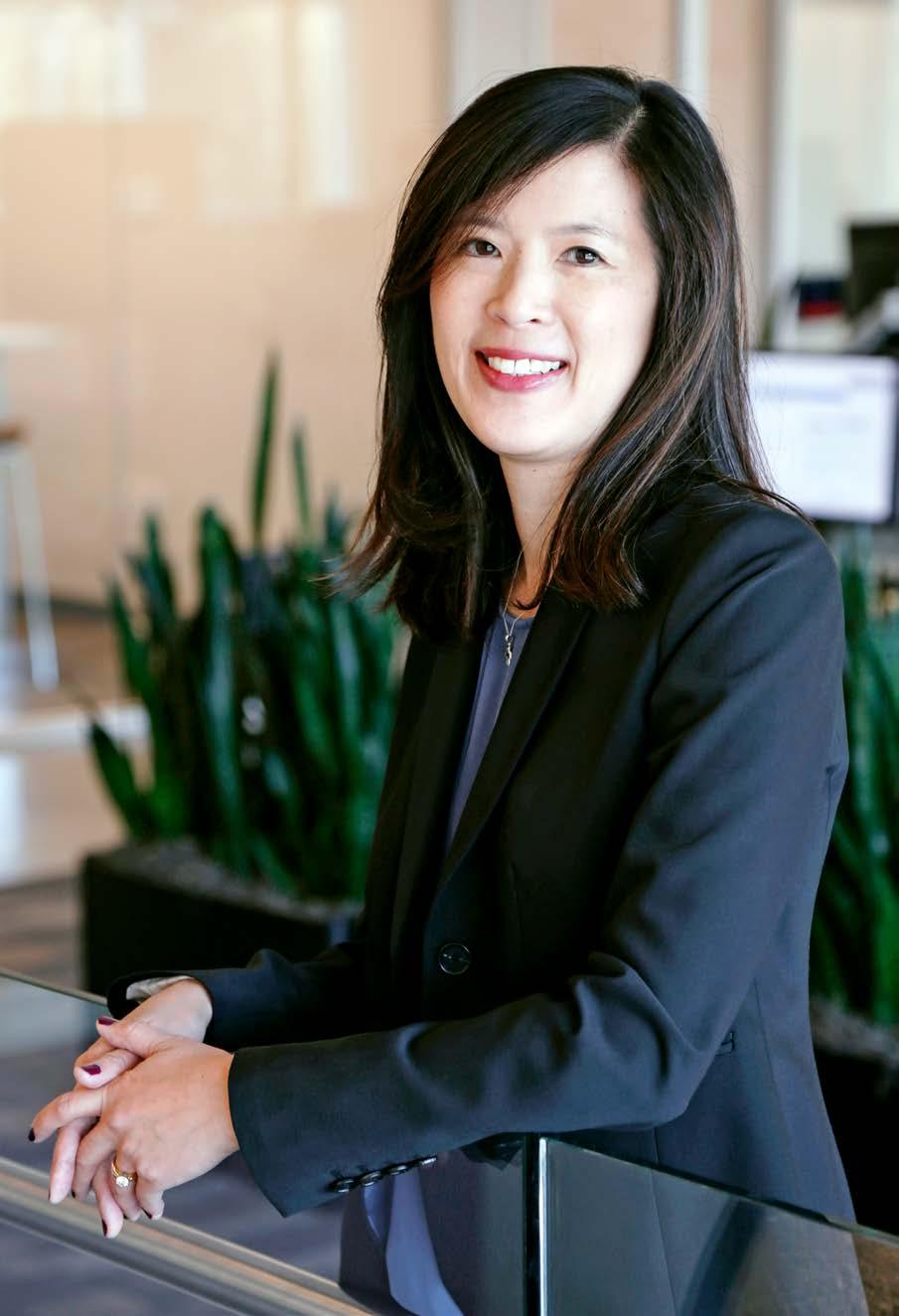

the day, it’s really risk management at the legal level. We consider the business needs alongside classic legal risks.”
For instance, when Calix launched a core operating-system platform, AXOS, it required a new and different customerlicensing agreement. “We spent a lot time with product leadership—they are the central point for new products— talking through what is workable, how we present this to a customer, how we memorialize our requirements in a contract,” Tom says. “Instead of just providing a legal document, we are involved in tweaking that document so that it is practical, workable, and clear enough from a selling standpoint.”
The company reboot is known colloquially as Calix 2.0, so Tom and her team call their reorganization Legal 2.0. She pushes her attorneys to spend a lot of time with internal business partners. “They are in the team meetings, so they hear what the challenges are,” she says. “I want the legal function to take what we hear in the field and incorporate it into legal processes. What needs are driving the company? The legal team collaborates and builds on what everyone is learning from their partners. That determines how we prioritize, how we set goals, and what resources to invest in.”

As her team and its functions continue to evolve, one overarching goal never changes. “We want to have our attorneys serve as business attorneys,” Tom says. “That is a leap from an attorney who is only strong in the law. We want to keep ourselves strong in the law but bring that additional value in being able to adeptly apply the law to business circumstances. Our attorneys are encouraged to have both legal expertise and the ability to make judgment calls in support of the larger purpose.”
By Arianna Stern
Stephanie Russell Assistant General Counsel
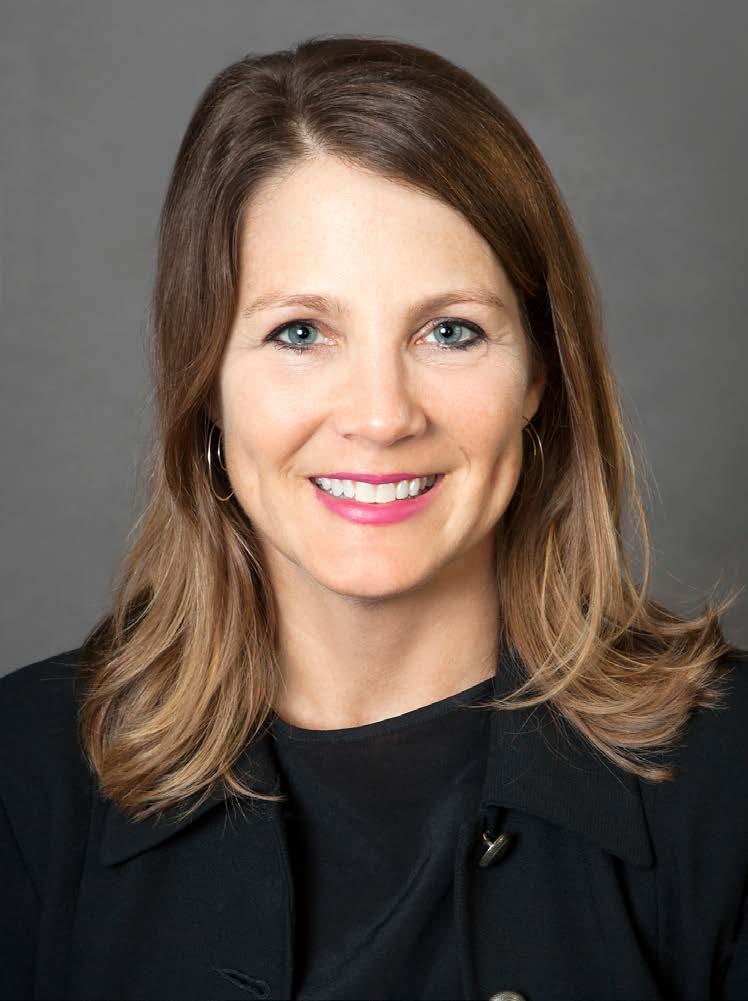
Remaining at SunEdison through its bankruptcy and applying lessons from her MBA program, Stephanie Russell developed a deeper understanding of business that she’s ready to take into the next phase of her career
IN APRIL 2016, STEPHANIE RUSSELL’S life underwent two dramatic shifts. The assistant general counsel at SunEdison kicked off the first week of her executive MBA program at Washington University in St. Louis, thinking it would instill her with the business savvy she needed to spearhead new projects and build a world-class compliance program at her company.
“I felt like if I got my MBA and knew better how to talk the talk, I would be more influential with our C-suite,” she says. “With a nonbusiness background, I thought, ‘I’ve got to learn accounting, I’ve got to learn more about operations management, and I’ve got to learn about finance.’”
That very same week, SunEdison filed for bankruptcy, and Russell’s responsibilities were instantly transformed and brought to focus on the company’s downsizing. In the uncertain climate, Russell made the hard choice to say with SunEdison through the bankruptcy and its wind-down
period, largely because she still saw opportunities to learn.
“I think there are a few different types of people who would decide to stay through a corporate bankruptcy,” she says. “In my case, it was an intellectual curiosity to learn about the bankruptcy process.” The changes at the company still allowed Russell to draw on new skills she was building in her MBA program; there was just a different set of business circumstances, and therefore a different application.
For example, she’d built up experience as a litigation, labor and employment, and compliance expert over twenty years of legal practice, but for the bankruptcy, she had to strengthen her knowledge of financial transactions, mergers and acquisitions, and securities issues so that she could tackle a more diverse set of problems, with the company’s personnel dwindling from about four thousand employees to fewer than forty. She adapted a triage-style workflow that enabled her to liaise efficiently
between outside advisors hired to guide SunEdison through bankruptcy and the company’s management. At the same time, her MBA also helped her analyze her company’s inner workings well enough to answer the advisors’ questions and ask relevant questions of her own.
Russell expected business school to teach her more about core business concepts, but she was surprised how relevant the soft skills she was cultivating as a result of her coursework became during the trying time. The MBA program revealed that Russell has a “people-oriented” management style. “I enjoy working with teams,” she says. “I enjoy giving people opportunities for growth and mentoring, being collaborative, as opposed to being more directive in nature.” Her MBA coursework also helped her identify ways to improve her management style, and the hectic pace of the bankruptcy allowed her to practice those changes in real time.
Cohen & Gresser is an international law firm with offices in New York, Seoul, Paris, Washington, DC, and London. It has an outstanding record of success in high-stakes and high-profile litigation, investigations, and transactional work throughout the world. Its clients include major international financial institutions and Fortune 500 companies across a broad spectrum of industries. The firm serve its clients in a number of practice areas, including corporate, employment, intellectual property and technology, litigation and arbitration, privacy and data security, real estate, tax, and white-collar defense. The firm’s attorneys are graduates of internationally renowned law schools and received their initial training at some of the finest law firms in the world. It is committed to providing the efficiency and personal service of a boutique law firm and the quality and attention to detail that are the hallmarks of the top firms where its lawyers received their training. The firm has been recognized in a wide range of publications, including Chambers, Legal 500, Managing IP, U.S. News & World Report ’s “Best Law Firms”, Décideurs, and Benchmark Litigation It has also been named to The National Law Journal ’s “Midsize Hot List” and the BTI Client Service A-Team.
“In the process of dismantling a company, you learn what’s at the core—good and bad. And, from that, you learn how to build something up stronger next time.”
Outside counsel that Russell worked with were particularly taken with her collaborative approach. “Stephanie has an excellent blend of great legal skills and a highly effective management style,” says Mark S. Cohen, a partner at Cohen & Gresser LLP. “It is hard to think of a more difficult situation than the one that confronted SunEdison, with each day presenting new and time-sensitive crises. Stephanie handled all these challenges—from business, legal, and personnel—with skill and grace and was instrumental in helping guide the company through such a difficult period.”
Though the bankruptcy was a financial and emotional challenge for the organization’s employees, Russell included, she took away some valuable lessons that she’ll use in furthering her career. For instance, she now has a deeper and more nuanced understanding of the concept of legal risk. “People may think the process of going through a bankruptcy would make a lawyer more risk adverse going forward,” she says. “Actually, I think it teaches you to
identify the true organizational risks— the things that could sink the ship—and focus on those.”
Ultimately, Russell feels optimistic about the future, noting that her experience at SunEdison and her MBA together have allowed her to develop new skills and pursue new opportunities. From a networking perspective, the downsizing and wind-down period pushed thousands of former SunEdison employees to find work in new companies, expanding Russell’s (and other SunEdison employees’) professional connections. “I’ve joked with others that we now know people in almost every company in the United States—and quite a few across the world—because four thousand employees have scattered across organizations and geographies,” she says.
The setbacks she has encountered haven’t dampened her ambition. “In the process of dismantling a company, you learn what’s at the core—good and bad,” she says. “And, from that, you learn how to build something up stronger next time.”
www.cohengresser.com proudly supports: Stephanie Russell
We congratulate her for her many achievements at SunEdison.
By Chris Gigley
Antony Haynes Associate Dean for Strategic Initiatives & Information Systems and Assistant Professor
Albany Law School
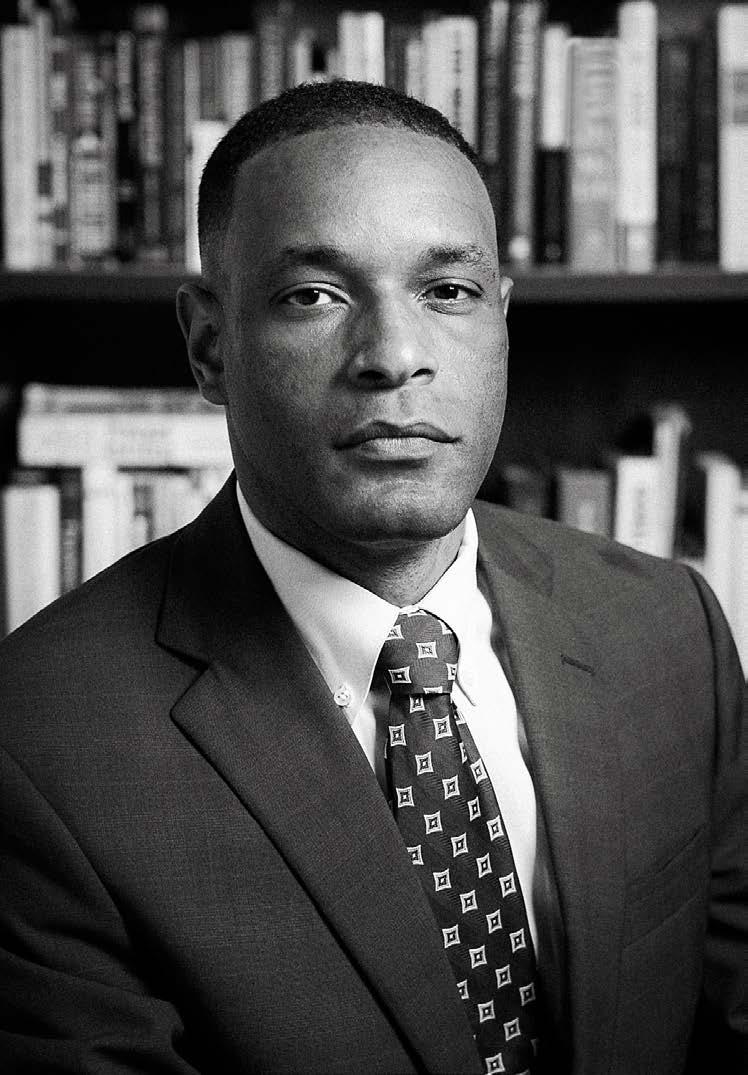
Albany Law School’s Antony Haynes is combining skills from his diverse career with state-of-the-art technology to best prepare students to succeed in a competitive job market
ANTONY HAYNES BRINGS A BROADER base of knowledge than usual to his work as an associate dean and assistant professor at Albany Law School, drawing upon his diverse background in the military and in entrepreneurship to inform his current leadership role at the nation’s oldest independent law school. Haynes says his unique career path has granted him great insight, experience, and flexibility, allowing him to return to the world of higher education—this time in the legal academy—where he’s now shaping the minds of future law and policy leaders.
The son of two educators, Haynes says he took after them early in life. As an Eagle Scout at age sixteen, Haynes was the only teenage director of a department at Boy Scout Camp. He also taught Sunday school at his church. Now, he’s ushering in a new era of learning at Albany Law School, a renowned institution founded in 1851 and accredited by American Bar Association.
“I have always thought the pursuit of knowledge and truth is fundamen-
tal and that in our human development, the pursuit of knowledge and wisdom may be the highest calling,” Haynes says. “If you go back to the great philosophers, they will tell you the quality that distinguishes humans from other animals is our ability to self-reflect.”
This mind-set motivated Haynes to pursue a bachelor’s degree in computer science at the US Air Force Academy, followed by a master’s in computer science at the University of Illinois at Urbana-Champaign. He then earned his certification as a signals intelligence officer and information operations planner, led an intelligence team in the Ninth Air Force as the chief of air defense threat analysis, and conducted information operations targeting.
He returned to the academy in 2000, this time in a faculty position. As an assistant professor of computer science, Haynes taught courses in software programming and cybersecurity for three years while developing the academy’s information assurance concentration and creating the Intercollegiate Cyber Defense Exercise.
After leaving the academy, Haynes entered the financial world, serving as an associate at Chatham Financial Corporation, Capital Markets, where he led a company-wide software effort, wrote financial accounting software, and coordinated technical developers— in addition to directly advising CFOs, treasurers, and controllers on the use of financial derivatives to hedge their interest-rate and currency-exchange risks and manage their balance sheets.
“Although I learned to write computer code in grade school, my military training and experience as an intelligence officer have led me to think about technology from a security perspective,” Haynes says. “I want to help organizations focus on how to use technology appropriately, effectively, and securely.”
Haynes felt pulled to private law, which he says is one area of society in desperate need of security. “Law firms contain client secrets,” Haynes says. “But, cybersecurity is an afterthought, if it’s thought about at all.” After earning his JD at Georgetown University, Haynes spent several years
as an associate at the Washington, DC, firm Williams & Connolly and at Quinn Emanuel Urquhart & Sullivan, tackling complex commercial, financial, and patent litigation.
In December 2015, Haynes arrived at Albany Law, in his newly created position. By then, he had extensive experience as a successful entrepreneur. He had previously started his own consulting business, leveraging his expertise in computer technology, business, and the law to advise startups, and he had also spent time helping acquire and grow companies.
Highly adaptable and versatile, Haynes is once again in his element. A primary focus of his current job is cybersecurity, teaching courses on cybersecurity law and finding ways to reach as many students as possible. He has launched an online MS in legal studies degree program, with specialization in cybersecurity and data privacy, an LLM in cybersecurity and data-privacy law, and a JD concentration in cybersecurity and the law.
As a teacher, Haynes is training new generations of lawyers to be more vigilant about cybersecurity. And, as associate dean and an assistant professor, he is aligning that training with the practical needs of law firms and other employers. “A lot of firms want graduates with practical skills, and our cybersecurity and privacy law program is a way to give them those skills,” Haynes says. “It’s a credential they can use when they’re looking for a job with a firm.”
An emphasis on cybersecurity education is also practical for graduate students who already have jobs, according to Haynes. He explains that students in his cybersecurity and privacy law and policy classes spend time conducting high-level policy assessments of their
employers. They leave Albany Law School having already applied what they learned in the real world.
Haynes’s forward-thinking perspective has him looking at challenges beyond cybersecurity, too. His latest research focuses on machine learning—the technology driving innovations such as self-driving cars and face-recognition software—and, in particular, how machine learning embeds human bias. He also notes how robotic technology has already displaced blue-collar workers around the world and says it won’t stop there. “We thought it could never happen to white-collar jobs like accountants and lawyers, but it is,” he says.
One example of machine learning invading the legal profession is the automated legal research software ROSS Intelligence. A number of the world’s largest law firms use ROSS to sift through thousands of documents, a job once tackled by hundreds of humans at a time. Haynes also points to TurboTax and LegalZoom as software programs ably tackling white-collar work.
Ultimately, Haynes says, lawyers will need to focus on skills difficult for computer algorithms to emulate—skills such as empathy and creativity and understanding a client’s overall business. In class, he encourages students to seek out creative solutions to legal problems. He also prompts them to think more creatively about their futures in law and policy. Automation has reduced demand for new attorneys at law firms and in industry, according to Haynes. Lawyers serving low- and middle-class citizens, however, are in high demand.
While massive student-loan debt prompts many graduates to ignore that demand, Haynes and his team at Albany Law School are focusing on
“I want to help organizations focus on how to use technology appropriately, effectively, and securely.”
solutions. If humans don’t figure out a creative solution, Haynes says, software programmers will. He says his team is asking, “How can a graduate degree from Albany Law School better apply to careers, pursuits, and industries that graduates may not have considered or even imagined?”
Answering this type of question is part of the big thinking that is changing the brand and culture of Albany Law School, an institution with a legacy spanning more than a century and a half. And, Haynes suggests that further innovation could potentially result in half the student body being purely online students. Already, in under two years, a new learning management system has become a critical tool for all faculty, staff, and students. Albany Law School is continuing to implement technological solutions to evolve with the ever-changing professional landscape, largely thanks to Haynes—and he’s just getting started.


Congratulations
We are pleased to support the in-house leaders featured by Modern Counsel with whom we are honored to work.
A look at the logistical challenges, evolving regulations, industry shifts, and cultural concerns outside the office that lawyers must analyze and navigate to manage their impact inside the office
By Arianna Stern
Sanjana Sharma protects UL’s proprietary Mark and its other intellectual property against imitators and fakes

Sanjana Sharma Associate General Counsel
WHEN UL, ALSO KNOWN AS UNDERWRITERS Laboratories, allows a product to bear its famous Mark (a proper term at the company), millions of consumers around the world can expect that product to meet certain safety, performance, and sustainability standards—thanks in part to Sanjana Sharma. As the associate general counsel for the global safety science company, Sharma maintains the brand integrity and public confidence that UL has cultivated for more than a century. “We hold our Mark in trust for use by our customers,” Sharma says. “We have a duty to protect it.” That’s why she’s ushering in a new era of brand expansion and renewed focus on protecting UL’s intellectual property at the largest independent testing laboratory in the world.
To do so, her legal team is ensuring the UL Mark effectively signals the safety and performance evaluation conducted by the company. Sharma collaborates with a global legal team of more than forty attorneys, paralegals, investigators, and administrators to safeguard the integrity of the UL Mark and brand. Together, they ensure that the Mark—which appears on twenty-two billion products—is used only by those who can pass the UL test. Sharma’s triedand-true methods for protecting the brand include sending warning letters to anyone imitating the Mark and bringing impostors to court if attempts at an amicable resolution fail.
“Because our Mark is synonymous with safety and quality, we don't want counterfeit UL marks out in the marketplace,” Sharma says. “That's a public-safety issue.” Her team also tackles other IP issues, including the licensing, distribution, and sale of more than 1,600 UL Standards for Safety and Sustainability. Plus, the team relentlessly protects proprietary information and testing methodologies that reflect UL’s technical rigor and expertise. “It’s a full-time job,” Sharma says with a laugh.
It’s also a role that’s changed over the decades as UL itself has evolved to keep pace with innovation from the machine age to the digital age. When UL first went into business in 1894, consumers worried about dangers associated with light bulbs and electrical appliances, including electrocution and house fires. Today, more than a hundred years later, Sharma says, consumers have different worries.


“We hold our Mark in trust for use by our customers. We have a duty to protect it.”
“Now, we're looking at batteries on planes, cybersecurity, and transaction security,” she explains. “Now, you're worried about, ‘When I go to the ATM and I want to take money out of my account, is my financial and other private information going to be stolen?’”
UL quells those safety concerns by working with credit card issuers to develop credit card processing requirements that keep pace with current technology. One example is chip and pin technology that consumers now see embedded in their credit cards and which is used to secure financial information. UL then uses its custom test tools to confirm that a credit card terminal meets the platform requirements. Sharma works with UL business leaders to help protect and appropriately commercialize the IP rights to those custom tools so that they can be available to all stakeholders in that market space.
Another growing area for UL is food safety—or, more specifically, verifying the claims that retailers make about their food. UL might lend its Mark to a honey brand to show that the honey isn’t actually corn syrup in disguise (a growing problem in the food world). Or, UL could allow its Mark to appear on the packaging for wild-caught fish to prove that the seller accurately represented where the fish were caught. Sharma and her team facilitate these uses of the UL Mark by creating contracts and guides for the Mark’s use. In this way, they help consumers better understand what they’re eating.
The financial services and food safety examples point to a larger trend: in the modern era, UL’s safety solutions are touching more and more industries. The enormous scope of the company’s products and services means that Sharma has to get creative in managing all the moving parts. Fortunately, she and her colleagues can count on collaboration from customs agents and code authorities across the globe. If a customs officer in a port of entry sees a product with a suspicious-looking mark, the officer can go straight to the UL experts—Sharma’s team—to determine whether the mark on the item is genuine.
“Generally, if we tell customs, ‘This mark is not authorized,’ they'll seize those products,” Sharma says.
Meanwhile, state code officials can assist Sharma in sniffing out specific bad actors. For example, recently, a solar-panel manufacturer using counterfeit marks attempted to sell its wares in California. Instead of pursuing a lawsuit against the manufacturer, Sharma called on the California fire marshal and code authorities to collaborate. Together, they effectively stopped the manufacturer from selling the goods with the fake mark and protected consumer safety.
Ultimately, helping customers innovate safely is still UL’s reason for being, even after more than a century of growth and social transformation. That legacy of excellence continues to motivate the UL legal team, and Sharma takes pride in how all her work serves the company’s timeless mission: “Working for a safer world.”

We applaud the outstanding achievements and leadership of Sanjana Sharma, Associate General Counsel, Intellectual Property at UL LLC.
We are proud of our partnership with UL and we look forward to continuing our work with Sanjana and the company.
By Lori Fredrickson
Sandra Redding General Counsel
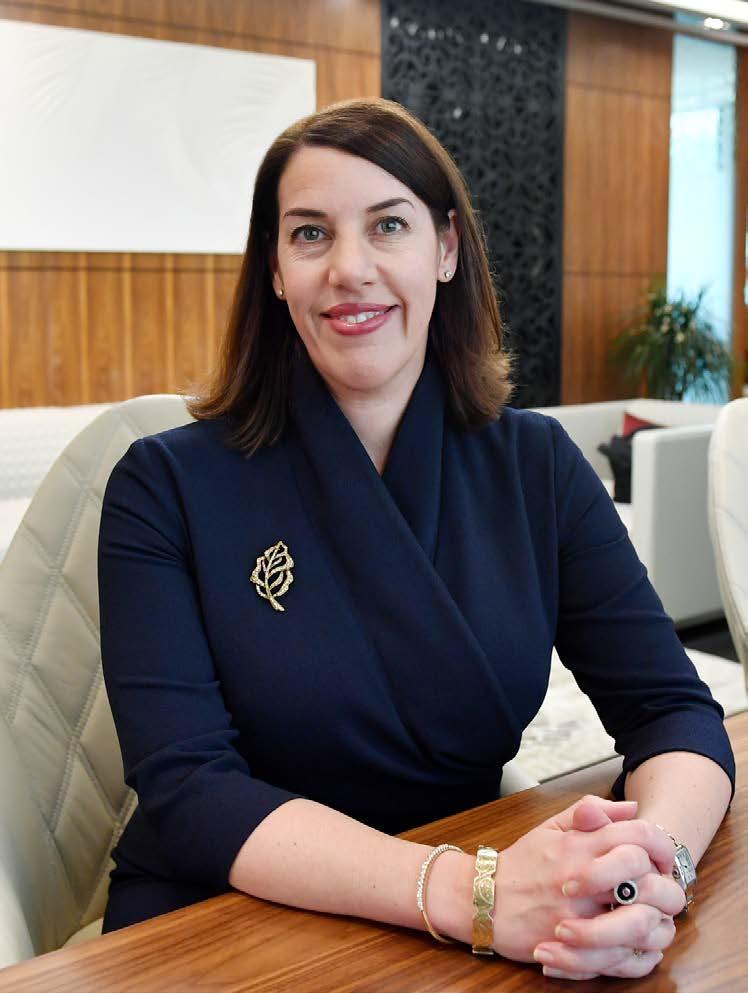
At the Dubai-based oil and gas company, exposure to new worlds, new cultures, and new perspectives has been a uniquely rewarding experience for Sandra Redding
memories of first moving to Dubai to work for Dragon Oil was learning how to drive on the wrong side of the road. Redding, a New Zealand-born Australian, had never before driven in right-hand traffic, and her new path to work took her down Sheikh Zayed Road, the main artery of the city, which has up to eight lanes running in either direction. “It hit me straight away: I’m going to have to deal with this every day,” Redding recalls, laughing. “But, it’s amazing what you can learn to do.”
Learning new things is hardly daunting at this point for Redding, whose curiosity early on led her to London after she earned her law degree in Australia. In Britain, she swiftly built a career as in-house counsel at companies such as Gaz de France and RWE. When she was contacted by Dragon Oil, an independent oil and gas company based in the Middle East, she jumped at the chance to join because “I could see that it was going to present a huge range of chal-
lenges and opportunities to push the skill sets that I had developed,” she says.
At the time, the company was looking for additional legal support from someone experienced in upstream oil and gas, and Redding’s background and skills were a match.
But, unlike the companies she had worked for in London, Dragon Oil had operations in Turkmenistan, Algeria, Iraq, Egypt, and Afghanistan. So, from the outset, it became important for her to travel to the different areas of operation with other members of the company, in order to learn their cultural and political landscapes as well as their unique legal hurdles.
“Finding people to build relationships with was pretty critical straightaway,” Redding says. “What was challenging was having to build advisers in countries I hadn’t been to, and it’s a constant learning process.”
It was also a challenge to work for a newer and more dynamic company, which was then undergoing significant
growth and looking to expand into new territories. “Multinationals have a very structured, rigid, practice-driven organization,” Redding says. “When you come to an environment that operates in a different way and see how it works in a different country, you can take that learning and apply it.”
Dragon Oil was bought by the government of Dubai, and Redding was given a new opportunity in 2017: a promotion to general counsel from her previous position as senior venture management lawyer. The move allowed her to expand her team, and she looked for people who shared her flexibility, adaptability, and curiosity regarding Dragon Oil’s business and the countries it operates in. “I’m very impressed by people who question what Dragon Oil’s commercial challenges are, as opposed to people who just want to talk to me about the history of their legal careers,” Redding says.
She also looked for diversity, particularly when it came to the different
“People who have worked in different countries, who have grown up in different cultures and societies, have different solutions.”
cultures that her team members have worked in. Today, she has attorneys from New Zealand, Turkmenistan, Canada, the Philippines, and Britain. And, in support of Dubai’s Emiratisation Program, aimed at expanding the number of Emiratis in the workforce, Redding is hoping to add to her pool of talent with an Emirati attorney. “The real value of being in-house counsel when a company is as diverse as Dragon Oil is always your ability to understand commercial problems and be willing to be a problem-solving adviser,” Redding says. “People who have worked in different countries, who have grown up in different cultures and societies, have different solutions and offer a range of things that might not occur to me. It’s hugely valuable because the best problem-solving in a business is collaborative.”
As the company has continued to expand into new territories, Redding has worked to establish a new office in Algeria, navigate the company’s first crude oil sales from Iraq, and build up a joint venture in Afghanistan. It’s
been a challenge, overseeing things remotely from Dubai while working to solve last-minute problems in new areas. “It’s a bit like you’re MacGyver at times,” Redding says.
And, meanwhile, she’s also had to tackle concerns arising from Dragon Oil’s already existing operations— including new venture opportunities, M&A work, and oversight of trade compliance—while keeping an eye on new regulations and sanctions coming out of different countries, particularly the US. “The key thing to being able to work in this kind of role is learning the importance of listening to the business at a commercial level and learning how to be timely in giving advice,” Redding says. “A lot of the countries we work in can be quite bureaucratic; being timely means knowing when to be fast, when to be patient, and how to read political and commercial environments.”
Redding has also worked hard to mentor her team members—something that she’s valued highly from mentors she’s had in her own career, including
Dragon Oil’s CEO, Ali Al Jarwan. “I have some very talented young lawyers on my team, with a strong potential to contribute,” Redding says. “They just need to have exposure to senior leaders and be allowed to engage and have room to grow.”
When she looks back on her time with Dragon Oil, Redding is impressed by how much she herself has been able to grow—on a professional level as well as on a personal one. She and her family travel frequently, often to Nepal, and she recently trekked to Everest Base Camp to raise money for a cancer charity, something she’d never thought she’d be capable of.
“When I think about some of the friendships I now have in my life, particularly with people from different backgrounds, it has supported how I approach my professional life more than I ever knew,” Redding says. “I could not have seen it was going to turn out like this; it was a blind adventure.”
We congratulate SANDRA REDDING, General Counsel at Dragon Oil , for her special recognition in Modern Counsel and for her impressive accomplishments. Morgan Lewis is proud to be a trusted counsel to Dragon Oil.
CMS:
“We congratulate Sandra for her outstanding contribution to the legal and energy sectors. She is an inspiring female general counsel. CMS is proud to support Dragon Oil and the future of women in law.”
—Matthew Culver, Partner, Oil & Gas
Quinn Emanuel Urquhart & Sullivan, LLP:
“I have had the opportunity to work with Sandra on a number of matters over the past few years, both arbitrations and transactions. Sandra is a highly effective general counsel who quickly grasps the legal issues while remaining very commercial and focused on achieving the best outcome for Dragon Oil. In addition to being a strong technical lawyer, Sandra has a highly developed cultural awareness of doing business in the Middle East and knows how to get things done. These attributes, taken together, set her apart as one of the region’s mosttalented general counsel.”
—James Bremen, Partner, Chair of the Construction and Engineering Practice

© 2018 Morgan, Lewis & Bockius LLP

can say they’ve performed the same workload of the employees they represent, but one lawyer at Fleur de Lis Energy, LLC can personally attest to the fieldwork. Blake Pickett has been involved in the oil and gas industry since he was a teenager, when he would work twelve-hour shifts for twenty-one days straight in the oil fields of central Wyoming.
The lessons he learned there, he says, still resonate with him in his current role as general counsel of FDL, based in Irving, Texas.
“One of the big lessons in my early days was if you make a mistake, we’re all here working together,” Pickett recalls. “You have to be safe around each other when drilling, make sure no one gets hurt. As long as you own up to the shortcomings you have, the people around you are going to fix it.”
Now as the legal leader for the $2 billion private energy firm, Pickett maintains those same basic principles. “As a general counsel, when I talk to my clients, I say, ‘You need to tell me exactly where we’re standing right now,’” Pickett says. “I’m not here to blame anyone or do anything but fix the problem. I need to understand the entire picture.”
By Paul Snyder
Blake Pickett’s introduction to the oil and gas industry came in the Wyoming fields when he was a teenager. Today, he’s applying the lessons he learned there to Fleur de Lis Energy’s legal work on a daily basis.
Growing up in Casper, Wyoming, Pickett says his introduction to the oil and gas industry was born out of necessity. He needed to pay for his own education, and the easiest way to make a good amount of money in a short amount of time was to “roughneck,” or work in the oil fields. Although he concedes he didn’t enjoy the work at first, it wasn’t long until he began taking pride in his work and reaping its financial rewards. He finished his undergraduate work—a bachelor’s
degree in finance at the University of Wyoming—with no debt and debated whether to pursue a higher business degree or go to law school.
“I decided to give law school a chance,” says Pickett, who earned his JD at Gonzaga University. “I didn’t know a lot about it, but I knew I wanted to stay in the industry, and it’s an industry that requires legal talent.”
The world of oil and gas is also heavily regulated, and even the most seasoned general counsel can find himself or herself mired in details. From land-use regulations to permitting, land abatements, project completion, and more, sometimes even the most seemingly insignificant detail can hang an entire project in the balance.
For Pickett, that means working as proactively as possible to identify and avoid potential conflicts in advance, thereby ensuring his company proceeds safely with any of its work.
“But after that, it’s a reactive process,” says Pickett, who adds that in an industry where rules and regulations can change tomorrow, legal leaders must be flexible enough to change plans and strategies on a dime.
Yet that dynamic doesn’t limit itself to oil-and-gas projects. While Pickett’s early work was clearly defined in the field, every issue that comes through FDL winds up on his desk, such as employment, accidents, insurance, contract management, and much more. Prioritization of these issues is a
Blake Pickett General Counsel Fleur de Lis Energy, LLC
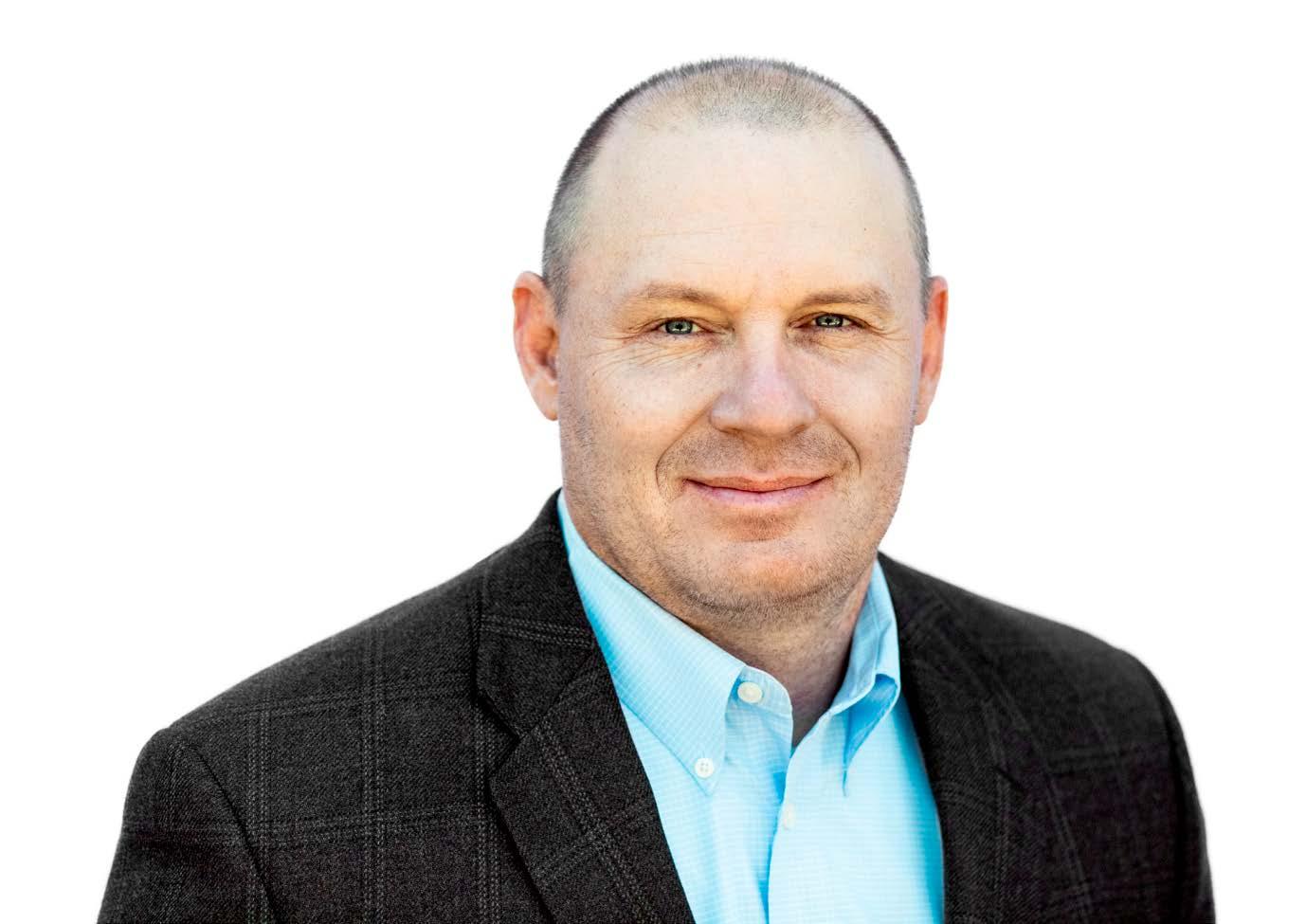

crucial balance, especially given the fact that Pickett works alone, to ensure the company’s clients don’t feel overlooked. He notes that he can rely on outside counsel on questions, but the torrent of issues and questions doesn’t offer much relief. Relationships with employees and vendors have to be maintained, deals can advance or crumble depending on his legal decision, and everybody wants to be the number one priority.
“It’s a fact that it’s going to be overwhelming,” Pickett says. “As long as you keep focused on the fact that there are answers and there are ways to get help— kind of like when I was roughnecking— the job can get done. It has to.”
Although the parallels between the two ends of his career are always there, FDL’s legal leader says he doesn’t find himself reminiscing about the good old days too much.
“There are definitely days where it’s minus-fifteen degrees in Wyoming and I’m glad I’m in this office,” Pickett says with a laugh. “Conversely, there are days where I think it’d be really nice to walk back out on that rig with a pipe wrench and sledgehammer, and only have to worry about that.”
Fortunately for FDL, the knowledge that Pickett acquired on the rig can continue to serve the company well into the future.
Kirkland & Ellis LLP:
“We’ve been privileged to work with Blake. He does an excellent job handling complicated transactions for Fleur de Lis and is consistently accessible and responsive. We are proud to call Blake our client and friend.”
—Christopher Heasley, Associate
By Peter Fabris
Merrick Bank’s Brian W. Jones fulfills the mission of the Community Reinvestment Act by advancing financial education in his community
IN THE HIGHLY REGULATED BANKING industry, it takes a coordinated effort throughout the organization to ensure compliance with myriad rules that not only require technical expertise, but also a philanthropic investment. The Utahbased Merrick Bank houses the example of this versatile compliance department as well as multiple corporate officers who dedicate time to both the financial institution and the local community. And for one of its legal leaders, Brian W. Jones, a personally fulfilling aspect of this work includes teaching kindergartners about financial principles.
“My mom was a kindergarten teacher for thirty years,” says Jones, general counsel at Merrick Bank. “Maybe it’s in my blood.” Since his arrival at Merrick Bank in 2005, Jones
has applied his expertise in banking, consumer lending, payment systems, and litigation management to grow the nationwide bank—a top twenty-five issuer of Visa branded credit cards and a top thirty merchant acquiring bank in the United States.
His involvement in the classroom stems from Merrick Bank’s efforts to support its community under the Community Reinvestment Act of 1977. The law mandates a certain percentage of a bank’s assets be invested in CRAqualified investments such as certain Government National Mortgage Association (GNMA) bonds. That’s a job for specialists, but another requirement— to donate time for charitable causes— provides bank employees opportunities to exercise their altruistic impulse.
Merrick Bank goes above and beyond to fulfill this second CRA requirement. Last year, it partnered with the nonprofit organization Youthlinc to create a curriculum and provide teaching aids and instructors to teach junior high children personal financial management principles. Jones was one of dozens of Merrick Bank employees who participated in the effort. Merrick Bank has also partnered for several years with Junior Achievement to teach its Money Basics program in a local elementary school. The program includes topics such as savings and budgeting.
As part of its community involvement initiatives, Merrick Bank contributes to community programs such as Utah Microenterprise Loan Fund and First Step House. The bank also donates hundreds of thousands of dollars to various nonprofit organizations each year. Jones views this work as an essential component of the $3 billion bank’s role in the Salt Lake City area. Merrick Bank, which was founded in 1997, specializes in providing credit cards and boat and RV loans to customers looking to rebuild their credit.
Jones says he has enjoyed spending one hour per week for five weeks teaching a local kindergarten class. The curriculum is focused on essential principles for managing money. “It may seem basic to many of us,” Jones says. “But, for kids who have parents from a different country or those with two working parents, it is super helpful.”
The Merrick Bank program has been highly successful, based on the feedback from educators. “The local school where we conduct the program has invited us back for the last ten years or so,” Jones says. “It’s been a great partnership.”
“It can be difficult to get people to take an hour out of their day for a month to teach, but we get great participation.”
The company’s efforts have also impressed its outside counsel. External partner firm Satterlee Stephens, in New York City, is a regular funder of scholarships to the local Cristo Rey national network of schools and applauds Jones and Merrick Bank’s community commitment. “Grassroots involvement enriches equally those that give and those that receive,” says Satterlee Stephens partner Daniel Gurfein.
The Federal Deposit Insurance Corporation (FDIC) rates banks’ performance regarding the CRA as either “outstanding,” “satisfactory,” “needs to improve,” or “substantial noncompliance.” Merrick Bank aims for “outstanding,” Jones says. Yet achieving that goal requires extensive employee participation. The hourly donation to reach an “outstanding” status translates into three hours per year per employee for CRA-qualified community service, according to Jones.
“It can be difficult to get people to take an hour out of their day for a month to teach, but we get great participation,” Jones says. “We make big efforts to get everyone in the bank involved.”
The CRA was enacted to ensure that banks meet the needs of borrowers in all segments of their communities, including those in low- and moderate-income neighborhoods, and many see it as a law focused on housing-related lending. Even though Merrick Bank’s business is
focused on issuing credit cards, making loans for recreational vehicles, and servicing the payment processing needs of merchants, ”There’s a lot about CRA that doesn’t really have anything to do with housing,” Jones says.
To ensure the CRA mandate receives appropriate attention, Merrick Bank has a leadership committee focused on the regulation. Today, the committee consists of Jones, the chief compliance officer, the bank president, and the chief financial officer. This group vets all proposals for CRA initiatives and is responsible for creating the bank’s strategic CRA plan, a 150-page document that is revised and presented to the FDIC for approval every five years.
The plan must also be made available for public comment before Merrick Bank submits it to the FDIC. External nonprofit organizations are encouraged to weigh in and shape its development. “Outside groups have great insights,” Jones says. “They have a different perspective on the world than a typical banker or lawyer might have.”
For example, Jones recalls how one commenter noted that financial literacy is an important tool to help low-income people break out of the cycle of poverty. “Many of the individuals who use our services do not have a basic understanding of budgets, checking accounts, car loans, or long-term financial planning,” the commentator added. Feedback like
Brian W. Jones General Counsel
Bank

Satterlee Stephens is a full-service law firm with substantial expertise in counseling and litigation for financial institutions. The firm takes great pride in the longevity and breadth of its client relationships, and its staff believes its success is best measured by the strength of its relationships with industry leaders in the credit card, credit rating, and investment banking sectors. Satterlee Stephens’s clients demand the best and count on the firm not just to win the case or close the deal but to know their business and help navigate emergent risks.
that, along with Merrick Bank’s own research, has inspired its financial literacy initiative.
Jones notes that his CRA compliance work is one example of how having in-house counsel to proactively apply the law to the bank’s business is beneficial. Jones says an in-house counsel’s primary “value-add” is their intimate knowledge of the client’s business and how that business interacts with law. So, getting in-house counsel involved early in the decision-making process—rather than merely in the review process, after a business decision has been made—is critical. And, to the extent businesses fail to do that, they’re not fully utilizing the skill set of their in-house counsel. With Merrick Bank’s strategic CRA plan, the proactive review process empowered by the bank allows Jones to flag points in the text that the regulators might find problematic. “I’m involved with the strategic plan before it goes to the FDIC, not just after it comes back,” he says. “It’s better to ask your lawyer about issues before you make a decision rather than merely seek a critique after decisions have already been made.”
Today, Jones is a 2019 candidate for an LLM degree in Litigation Management from Baylor Law School, but he’s also continuing to monitor new developments in how the FDIC interprets regulations as he keeps Merrick Bank on track to meet its “outstanding” CRA goals. An important aspect of his role, he adds, includes evaluating the effectiveness of the charitable programs. “We want to make sure the donations we make are being used in the way we expect,” he says, “and we are always looking for other ways we can provide support to our communities.”

Satterlee Stephens LLP provides the highest quality legal services to businesses, public and private institutions and individuals. Since 1894, we have been building a history of success, helping clients solve challenging legal problems and achieve their commercial and personal goals. We offer clients a value proposition second to none. We are nimble, innovative and efficient, tailoring the team to fit the matter at hand. www.ssbb.com
By Jenny Draper
Olam’s Ligia Bernardo shares how guidance from and of others has had a positive impact on her career and her current work for one of the largest agribusinesses in the world
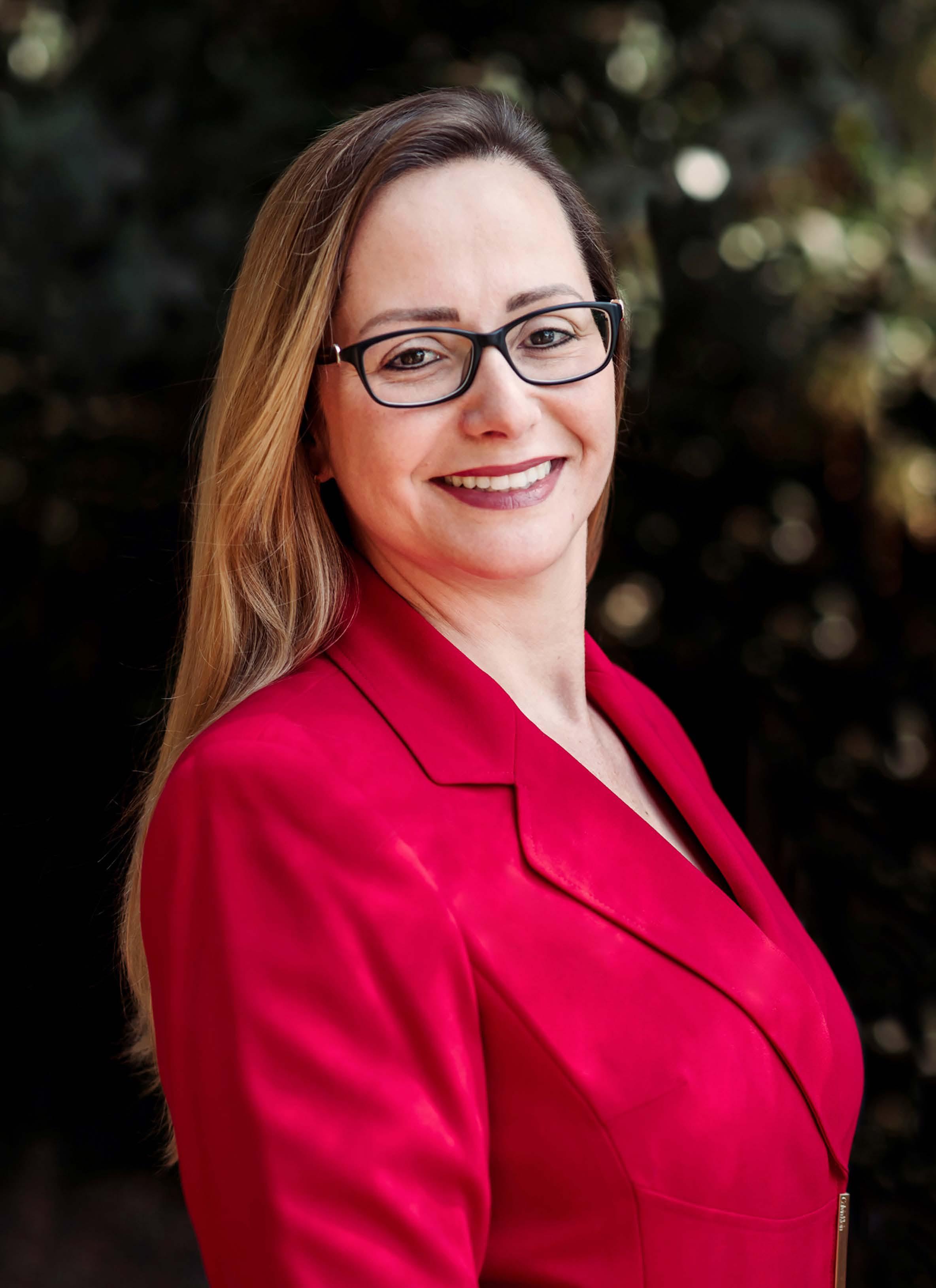
GROWING UP IN SÃO PAULO, BRAZIL, LIGIA BERNARDO remembers playing with the kids at an orphanage in the countryside, near her grandparents’ ranch. Her parents took her there often to deliver toys and clothes, and Bernardo says that to this day, the experience continues to inform her desire to give back as head of legal for Olam Americas, Inc. There, she serves as a mentor to many others, but to get there, she also relied on the advice of mentors of her own.
When talking about the mentors that have shaped her success, she points to her parents first. “My parents always told me to never wait to get prepared but to get prepared and the opportunity will come,” Bernardo says.
She credits her father, a sales executive, and her mother, who held various jobs, including executive secretary, public relations associate, and estate manager, for instilling in her curiosity and a strong work ethic. Such traits propelled her to work during the day and attend classes at night to finish law school and complete two master’s degrees in law in Brazil. And, they also empowered her to seek professional mentors at esteemed firms such as DLA Piper, in the US, and KPMG, in Brazil, to cultivate the legal career she has always wanted. “My mentors have never given me the answers; they have challenged me to find them,” she says. “They have provoked my thinking.”
In fact, it was one of her mentors who suggested she look for an opportunity to use her fifteen years of experience in civil law in a common law environment after she earned her LLM at the University of Michigan. That’s when the opportunity to build her own legal function on the West Coast, at Olam, caught her eye.
In the three years since her arrival in Fresno, California, Bernardo has counseled the company regarding its strategic US partnerships with food clients and suppliers around the world, from Egyptian onion processors to Mexican cocoa manufactures—helping Olam add to and enhance its resource network of 4.7 million farmers and their communities. Bernardo has also designed the company’s legal function as more of an entrepreneurial arm. “When I came, nobody could tell me how many law firms we were working with,” says Bernardo, who got support from management to develop a guideline. “I challenged the service
“My mentors have never given me the answers; they have challenged me to find them.”
providers to interact with each other to be creative on how to support our business better.”
Since emerging in Nigeria in 1989, Olam has evolved into a giant of contemporary food production around the world. From seed to shelf, the $20 billion agribusiness employs seventy-two thousand people in sixty-six countries to deliver food and industrial raw materials (such as nuts, coffee, cocoa, spices, and cotton) to more than twenty-two thousand international customers. “When I was hired, I thought I would be working for one company,” Bernardo says. “However, we have eighteen entities in our group in the US today.”
With Olam continuing to add new business units to its portfolio—including cocoa, grains, rice, and superfoods—while expanding other units such as spices and peanuts, the company’s US revenue has almost doubled during Bernardo’s tenure. At the same time, though, she has cut its legal expenditures in half while creating its legal function from scratch and supporting finance, IT, and HR functions, among others. She also champions the antibribery and anticorruption policy for the company in thirteen countries in the Americas.
Amid all these efforts, Bernardo rediscovered her passion for pro bono and charity work, in part thanks to her friend and mentor Bradley Gayton. This led her to support the Instituto Pro Bono, which provides legal pro bono services in São Paulo, and to work as outside legal counsel for the Global FoodBanking Network during her time in Chicago and Michigan.
“Growing up in a developing country, I saw people struggling with the ability to put food on the table,” Bernardo says. “Now, working for the food industry, it is even closer. I could not help but set the entire company on fire to really participate.” With her support, Olam takes part in an annual rally for the local Fresno food bank.
And, last year, Bernardo completed the ninemonth Leadership Fresno program. It partners with the local chamber of commerce to make a positive impact on the community through projects such a learning garden and a library for a local elementary school in need.
Today, Bernardo continues to serve others—at her church, as part of the San Joaquin College of

Ligia Bernardo Head of Legal
Olam Americas, Inc.
DLA Piper congratulates our friend, alumna and client Ligia Bernardo of Olam, on her recognition by Modern Counsel magazine as a thought leader.

Law Board of Trustees, and at Olam, where she counsels other women through an alliance program that matches mentors and mentees. She advises them to put aside destructive competitiveness. “If you don't want to be vulnerable, it’s hard to grow,” she says. “The beauty of mentorship is that it tells you that no matter how smart, talented, hard-working, or experienced you are, there is always value to counsel.”
Her own track record proves her point. For example, while attending the law school Faculdade de Direito de São Bernardo do Campo, in São Paulo, Bernardo interned at HP Enterprise Services (formerly Electronic Data Systems do Brasil). There, her mentor Firmino Campos, an engineer and sales executive, taught her how to navigate the corporate world. Later, she worked for Stuart Berkson, at DLA Piper, who encouraged her to reinvent herself after more than a decade in the field by earning a master’s degree in law from the University of Michigan.
“Every day is an opportunity to learn and grow as a professional and be creative and apply the rich experience my background allowed me to have to deal with the multitude of matters that come to me,” Bernardo says. “It really inspires me to see, support, and experience the dynamic development of Olam.”
Jeffrey Medeiros and USAA Bank always make its members—military personnel, veterans, and their families—their top priority
By Jeff Silver CUSTOMER SERVICE AND EXPERIENCE
make or break organizations in the business world today. When Jeffrey Medeiros arrived at USAA Bank in 2016, he quickly realized it was a company that went above and beyond to deliver service excellence. That’s when he accepted the financial services innovator’s unique mission: to facilitate the financial security of its members, associates, and their families through highly competitive financial products and services.
“Today, USAA has more than twelve million members, and their best interests are ingrained in everything we do,” says Medeiros, senior vice president, general counsel, and corporate secretary at USAA Bank. “The first priority is always how we facilitate their financial security and provide the best products for them. Equally important is the success of our employees and providing a workplace environment that is both positive and
supportive. Those two things must go hand in hand.” In recent years, several organizations such as Forbes, Fortune, and the Council for Corporate Responsibility have repeatedly recognized the Texas-based company for its values by designating it as a best place to work.
That dedication is apparent even in how the award-winning company runs its legal function and how it approaches facilitating the business’s strategic goals. Medeiros says that the company’s mission “is certainly a very easy and very motivating one to get behind. Everyone in the company recognizes that singular mission, so using that as the driving force makes it easier for a true partnership between legal and business partners.”
When it comes to staying connected to its membership, Medeiros explains, USAA leverages its long-standing and deep understanding of the military experience as well as industry-leading
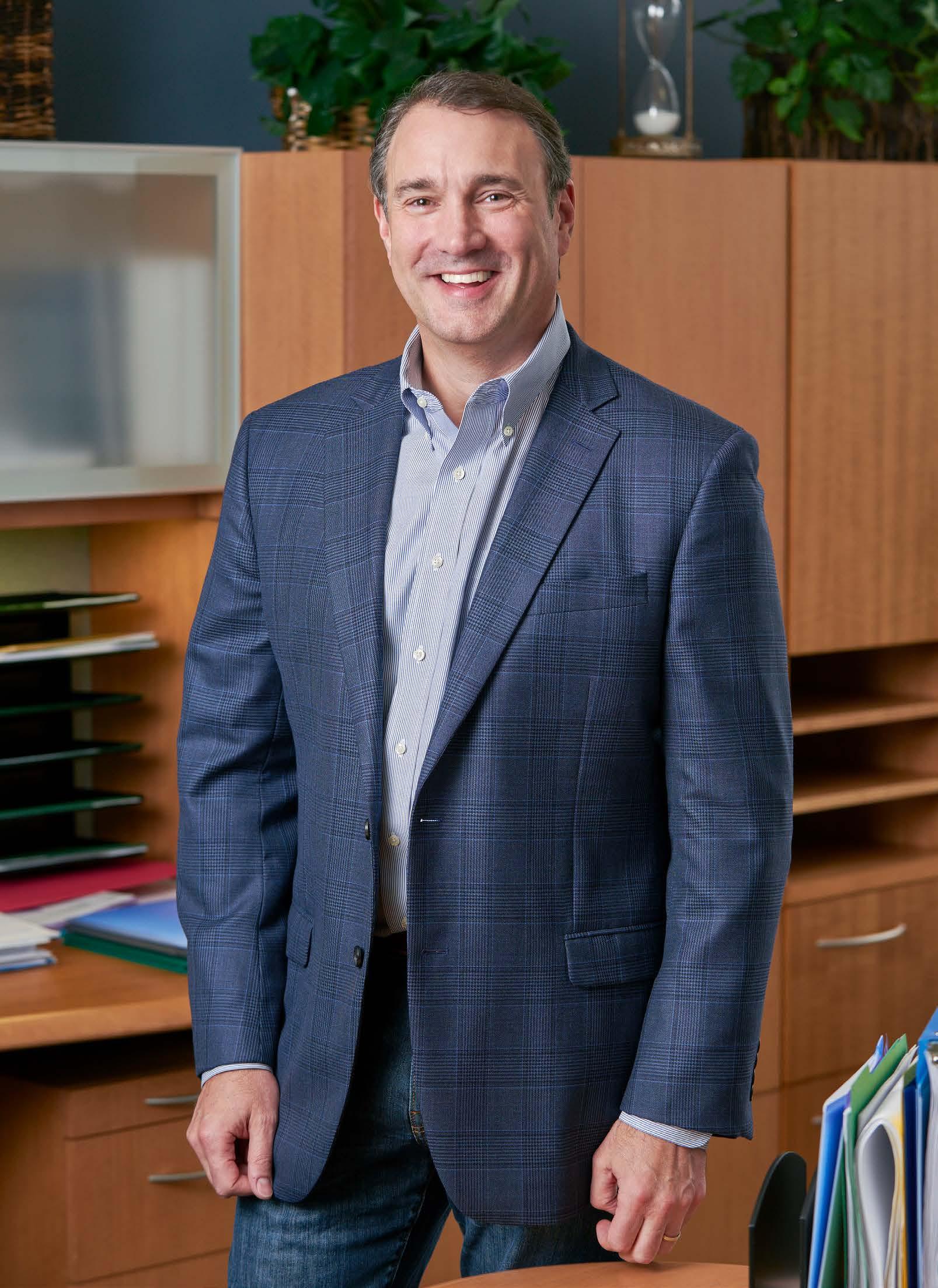
“I am there to serve my team and create an environment where they can be as successful as they possibly can.”
Jeffrey Medeiros SVP, General Counsel, and Corporate Secretary USAA Bank
technology to help fulfill its mission. USAA’s military affairs team, for example, is charged with keeping pace with military families’ evolving needs and is extremely active as an advocate in the military community, building relationships and strengthening ties through ongoing engagements and sponsorships.
Even closer to home, nearly 25 percent of the bank’s employees are former military members or their spouses, and they are a rich source of information and innovation. In 2017, they submitted more than nine thousand ideas for new products and services to USAA Labs, which assesses suggestions from members and employees and develops the most promising ones. “The fact that our bank is virtually branchless and our members use the bank primarily through digital technologies is a reflection of that kind of innovation on behalf of members,” Medeiros says.
In fact, 80 percent of USAA’s members access services through its digital apps—which means the legal department helps the bank navigate technology issues as well as banking issues. The team is involved in the development of all USAA banking apps, which present challenges such as how to maintain regulatory compliance for digital disclosures and digital signatures. As a result, the company’s lawyers—many of whom are recruited from tech giants such as Google and Microsoft—must be experts in banking law and technology.
“Our lawyers are integral participants on every committee throughout the organization,” Medeiros says. “The goal is to not only ensure regulatory and governance compliance of all new products and services but to ensure our lawyers are providing high-quality business advice in order to reach our strategic goals in the most efficient and compliant way possible.”
Medeiros also acts as the company secretary for USAA’s banking operations and regularly interfaces with the company’s two bank boards. He is responsible for identifying and distilling key management, strategy, and governance issues into coherent, manageable content that allows board members to effectively fulfill their responsibilities. “That is always a challenge with financial services companies because the interaction with the board is so important,” Medeiros says. “You don’t want to leave out crucial information but you also don’t want to inundate boards with massive amounts of material. Our priority with respect to our boards is to provide the right information at the right time so that the board can discharge its responsibilities to ensure the banks are always operating in a safe and

sound manner, within appropriate risk parameters and consistently with its stated strategy.”
Medeiros ensures that information is always accessible to board members, who each have their own areas of expertise, and he puts great effort into developing trusting relationships so that challenges from board members can be handled constructively.
When it comes to leading a large legal function, Medeiros says, “servant leadership is the most important component. I am there to serve my team and create an environment where they can be as successful as they possibly can.” He tries to foster an environment where his people learn, grow, and thrive. “Creating a function where people feel free to think and act autonomously while serving our members and our business is our goal. We encourage speaking up and challenging authority and the status quo. Counterarguments are always welcome, encouraged, listened to, and, importantly, never attacked or filled with ramifications for disagreements. I had mentors who encouraged challenges and listened to those challenges that usually went well beyond pure legal advice. There was no guarantee they’d accept my position, but they welcomed my input for the good of the business. That’s what I try to do here.”
After two years, Medeiros still considers it a privilege to be working at USAA. “At other companies, leadership and strategies change,” he says. “At USAA, even if leadership may change, we’re always clear about our strategy and our mission. We provide the best possible products and services to serve military members and their families, and that makes it a great place to get up to go to work every day.”
In conversation with Yen Chu
By Arianna Stern
As senior vice president and general counsel at Equinox, Yen Chu channels her extensive governance expertise into strategic insights for the high-end fitness company’s C-suite and board of directors, which helps them make smart decisions surrounding transactions, litigation, intellectual property, and privacy, among other concerns. These days, though, there’s another key issue that is consistently on her mind: ethics.
Chu estimates that ethics matters started to become a bigger concern about seven years ago, as company stakeholders, including those at Equinox, started examining corporate social responsibility more closely. Luckily, the rise of public interest in corporate ethics fits with Chu’s personal interest in ethics as a Vietnamese immigrant. She’s passionate about examining matters from multiple viewpoints and lifting up underrepresented members of the business community. Modern Counsel caught up with Chu to talk about how she developed her interest in governance, compliance, and social responsibility and how it impacts her mentorship and volunteer work.
You have a pretty unique background. What are some of the significant experiences in your life that inform your work today?
I spent my formative career years as a securities lawyer at a large law firm here in New York. As my career progressed, I found myself drawn to the disclosure piece and then to the governance components of securities law. I went from the law firm to a large public company, where I worked closely with the board and senior management on key governance and compliance issues. That experience has really informed a lot of my work.
On a personal level, my family and I immigrated to the United States after the Vietnam War, and seeking to understand international relations and governance has always been an interest of mine.
What drives your interest in both corporate governance and corporate social responsibility?
Corporate governance, to me, is about balancing the interests of a company’s many stakeholders. The objectives of those individuals could be transparency, full disclosure, increasing shareholder value, or accountability. In the past few years, these stakeholders
have expanded their interest into how a product is made or how a service is provided. They care about a company’s global footprint, and for me, that’s been fantastic. I love being reminded that we are all one component of a very big picture.
How does your approach to corporate social responsibility help benefit business objectives?
Taking account of social, environmental, philanthropic, or economic impact improves the company’s trustworthiness. And, as a result, that improves your reputation with your stakeholders. If there’s a business case for corporate social responsibility, that’s it. It builds that trust, and it makes sure that your stakeholders know what your values are.
Given that you’re a board member and mentor at Columbia Law School, what role has mentorship played in your own career journey?
Well, I came to Columbia Law as a first-generation law student. My parents were not well-versed in the legal pro -
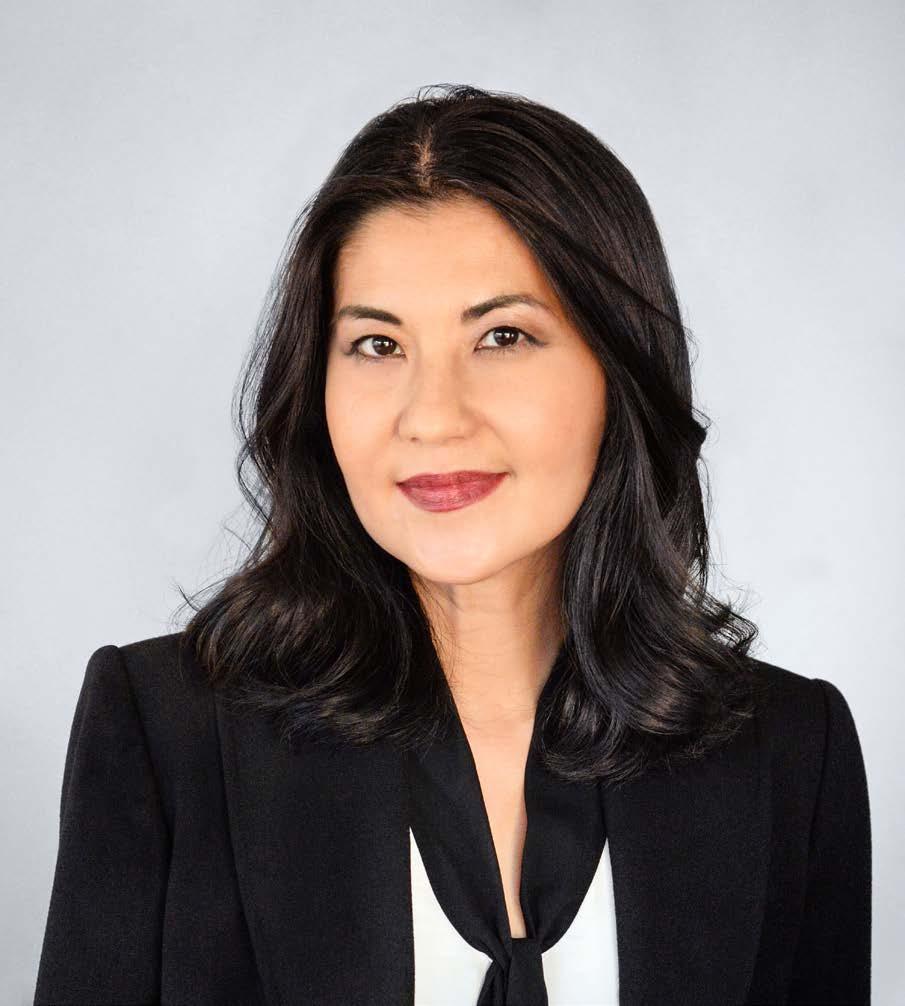
Chu SVP and General Counsel
“As an immigrant, I am always grateful for the opportunities I had as a result of someone’s investment in my development or education. I am always looking to give back.”
fessional community, and there was so much I did not know: How does our legal system work? How does our professional community work?
The board of the Columbia Law School Association, which I’m on, had a student come talk to us about the activities of this fantastic group: the firstgeneration law student group. It prompted several of us on the board to create a mentorship program, which allowed for one-on-one coaching. We also had panel discussions where several of us spoke to the group and had workshops afterward. We let them ask all sorts of questions—anything from “What should I wear?” to “How do I address this issue in my background?” to “What if I don’t have anything to say when they ask me about this?”
When you were a first-generation law student, did you have any mentors of your own?
I had a couple of professors that took an interest in helping me transition and giving me that extra guidance. Throughout my life, I’ve had a lot of good guidance and mentors. I don’t like to use capital-M Mentors because
I think that’s a lot of pressure for people. But, I like to think of it as my personal board of directors—people I call upon for advice, or people that have given me great advice and didn’t know that they were mentoring me but who did contribute to who I am.
You also do some extracurricular work for nonprofits such as PENCIL and the Grace Institute? What motivates that work?
As an immigrant, I am always deeply grateful for the opportunities I had and continue to have that were a result of someone’s investment in my development or education. I am always looking to give back because I know I wouldn’t be where I am without those people or organizations.
At PENCIL, we had high schoolers and talked to them about building a business case. We helped women reenter the workforce at the Grace Institute. We sat with them, did mock interviews and elevator pitches, and helped them present themselves— because some of those skills had gotten rusty. I’m always looking for those types of opportunities.

Personal Capital helps people make well-informed, holistic financial decisions, and Allison Amadia ensures its legal and compliance teams provide impactful insights and counsel to support that mission.
By Stephanie Zeilenga
General Counsel
Capital

ALLISON AMADIA, A VETERAN ATTORNEY WHO HAS worked in the high-tech industry for nearly three decades, has provided legal services for dozens of technology companies, including traditional hardware manufacturers, electronic-commerce providers, software-as-a-service providers, networking, big data, payments, and more. “While every business I have represented has provided value to its customers, Personal Capital is the first company where I have been able to appreciate that value on a personal level,” says Amadia, Personal Capital’s first in-house general counsel. “I joined the team for that very reason.”
Personal Capital, sitting firmly in the fintech space, is both a technology company and registered investment advisor, with personalized solutions and services that are uniquely suited to the current age of financial complexity. There’s a lot for Americans to consider, not only in terms of piecing a financial life together but also in planning effectively for the future: monthly bills, mortgages, assets, retirement savings. With easyto-use technology, Personal Capital delivers a holistic, clear view of people’s finances that empowers them to make strategic decisions on their own or with the help of a financial advisor.
“Our purpose is to bring clarity and confidence to financial lives,” Amadia says. “We do that in a way that’s truly transformative for our customers. We give our users and clients a whole new way to see, understand, and manage their money with online tools and insight-driven guidance from advisors.”
In addition to selecting Personal Capital because of its transformational technology and talented people, Amadia joined the company because of how each of its core values resonated with her. The foundation of Personal Capital is built on five core values: being up-front, working hard to make things simple, making business personal, building on a legacy of trust, and teaming up to break down challenges. These values, embodied by current CEO Jay Shah, are ones Amadia has subscribed to in her work for decades— and to which she attributes much of her success as a legal executive. “It’s not just experience that makes us good at what we do; it’s the way we choose to work that truly matters,” she says.
Amadia began her legal career as an associate in the business group at Morrison & Foerster, then spent
more than a decade as in-house counsel for large technology companies, including HP, Verifone, and Seagate. Amadia has also served as a general counsel to many privately held companies. She even founded and managed her own independent law firm for more than a decade and taught technology law at University of Santa Clara School of Law. While her career path has taken her in many different directions, she has never veered from her value system. “I believe that outstanding executives, including outstanding lawyers, value integrity, transparency, hard work, ownership, trust, and collaboration,” she says. “They incorporate those values into their leadership and work product every day.” Amadia’s strengths earned her recognition as a finalist for Public Company General Counsel of the Year in 2015, from the Silicon Valley Business Journal and the San Francisco Business Times.
Amadia is a particularly strong believer in cross-functional collaboration, which fits perfectly with Personal Capital’s emphasis on teaming up to solve problems. The company’s cross-functional teams collaborate on dozens of day-to-day initiatives, from driving core business metrics to strategizing about privacy and security.
Simplicity is also highly valued by Amadia, who believes it’s important to do the heavy work up front to set up internal processes in a way that maximizes business performance. “My teams focus on executing strategic planning that sets the company up for success rather than taking a reactive approach,” she says. “It’s a lot more effective to get in front of issues and challenges by thinking ahead strategically rather than sweeping up after the mess. It’s the difference between bringing in a caterer
“Personal Capital gives users and clients a whole new way to see, understand, and manage their money with digital tools and insight-driven guidance from our advisors.”
ahead of time to plan an elegant meal for a big event versus a run to Costco minutes before the first guest arrives.”
In the coming months and years, Amadia will help the executive team steer Personal Capital’s growth and maturity while relying on her core values as her North Star. She will also focus on fine-tuning her nimble and strategic legal and compliance team to scale with the company’s high-growth trajectory. “Hiring the right people is critical,” she says. “Although that can take time, it is time well spent. Once you find a fit, empowering your employees to make decisions is critical to growing a successful organization.”
And, Amadia is looking forward to her own continued growth and transformation as a legal executive, even after more than twenty-five years of experience. “At this point in my career, I am more focused on meaningful rela-
tionships at work than ever before, on building a strong company culture of respect, diversity, and inclusion, and on personal quality of life,” she says. “We give so much of our lives and ourselves to our work. It’s imperative that we take the time to get to know our colleagues, support one another with a strong mentoring culture, and encourage personal time to recharge.”
Given Amadia’s experience, talent, and commitment, it’s safe to assume Personal Capital will continue to be transformative for its customers as well as nurture a culture of success.
Orrick:
“Allison brings a strong portfolio of varied skills and depth to Personal Capital. She’s business oriented, an innovator, and a team builder. Allison has invaluable experience in public and private company settings that I’m confident will help enable Personal Capital to realize the company’s vision.”
—Ed Batts, Global Head of Orrick’s M&A and Private Equity Practice

Morrison & Foerster congratulates Allison Amadia for her recognition in Modern Counsel.
At Morrison & Foerster, our commitment to excellence begins with the understanding that our clients’ needs are unique. We are dedicated to finding creative solutions that ensure our clients achieve their business goals.
mofo.com

Allison, you are a proven leader who we know will help guide Personal Capital to great success in the months and years ahead. We look forward to celebrating those achievements and to cheering you and Personal Capital on.
– Your friends at Orrick
By Kathy Kantorski
Genel Energy’s associate general counsel has built a career on learning new cultures

PARAGLIDING, WINDSURFING, SKIING, AND horseback riding are Nilufer Ozder’s favorite hobbies.
But she’s not a thrill seeker. She enjoys activities that require her to handle complex issues—the weather, the parachute, coordinating a landing, or interacting with an animal to achieve a mutual understanding.
The same is true in her professional life. “Being a lawyer is not only related to laws and regulations,” she explains to her class of newly educated young lawyers at the Turkish Bar Association. “It’s more related to using information in a complex situation to create the right solution for the client.”
Ozder is the associate general counsel of Genel Energy, one of the largest independent oil producers traded on the London Stock Exchange and the largest holder of reserves and resources in the Kurdistan Region of Iraq. Working from the company’s office in Ankara, Turkey, she is centrally located between Genel’s London office, where she travels frequently, and its operations.
Her business travels and personal background coalesce in her role. Born in Germany, she moved to Turkey as a child. “Here in Turkey, we have a mixture of European and Eastern cultures,” she says. “From my childhood, I have learned how to adapt to different cultures and respect them.”
She describes this cultural adaptability as “being a bridge.” She says, “Besides all my legal responsibilities, the ability to understand the differences between cultures helps me to adapt to the worldwide regulations with which the international companies have to comply. Therefore, having a cross-cultural background is a valuable asset within an oil and gas business on our sphere of influence.”
In addition to knowing each government’s laws, she must also understand the ethics of the region’s lawyers and how the laws are being implemented in different territories—what she calls “the cycle behind the regulations.”
Acting as a bridge between diverse cultures and international companies can be compared to horseback riding, a pastime Ozder has enjoyed since childhood. She describes the activity as interacting with a common goal of understanding one another to be safe and enjoy the experience. Practicing this in both her personal and professional lives indicates


“Facing a new culture is a kind of adventure.”
Ozder Associate General Counsel
Energy
Nilufer Ozder works in law (a maledominated field) for an energy company (a male-dominated industry), and she works with local governments in regions such as the Middle East (a culture of male dominance).
How does she do it? With confidence. “Knowing what you are doing is very important,” she says. “When I was a young lawyer, if I showed a little bit of hesitation on what I was advising, the gender difference became apparent. I am still working in the same industry and still working in risky areas, but I never act like I am female and the others are male. We are all professionals. If you don’t feel the difference, it disappears.”
it is a true passion for Ozder. “I always feel that my job and my personal life are completing each other,” she says.
A self-described lifelong learner, Ozder always knew she wanted to practice international law, and she saw the energy industry as the perfect opportunity. “Facing a new culture is a kind of adventure,” she explains. “This is why I like the oil and gas industry so much, because every new operation and new region is opening new challenges, new things to learn, new cultures to meet.”
Her professional career has spanned more than eighteen years—all of which have been in the energy sector and for the last fifteen years in the oil and gas sector. “It started with the first company I worked for, an electric energy company, where I worked with Italians,” she says. “Then I worked for an American company, then a French company, which has operations in twelve regions around the world.” It was this last company, Perenco, where Ozder was working when a recruiter approached her about an opportunity with Genel.
She wasn’t interested in leaving Perenco; she was happy to be a part of its legal team and saw exciting opportunities for her future career. But, the recruiter persisted, and she met with and received an offer from Genel. She decided to decline that offer, but the recruiter continued to keep in contact, and nearly seven months later, he had an enticing proposition: a meeting with Tony Hayward, the former CEO of BP, who was chairman of Genel at the time. “We had a one-and-a-half-hour chat over coffee,” she says.
Hayward shared with Ozder the vision of a highgrowth international company, newly listed on the London Stock Exchange, for which she would be one of the first employees and would therefore make a large impact. She was sold. In total, Genel spent almost a year recruiting Ozder, and the entire experience exemplifies her secret to success in the legal field: work hard and build good relationships.
Relationships also drive her leadership style, which she practices both in her role at Genel and as an instructor with the Turkish Bar Association. “I am teaching international and local oil and gas law to passionate and idealistic young lawyers,” she says, emphasizing how much she listens to her class instead

of only speaking to them. “I like brainstorming, discussing, and producing an outcome together.” Her style is to be transparent and collaborative, sharing information and research in order to work together on the path to progress.
“I am teaching young lawyers not to be afraid,” she says, “to pursue their desires, their dreams.” Just as she has done.
Herbert Smith Freehills LLP:
“As a legal adviser to Genel Energy, I have worked alongside Nilufer for a number of years, and I admire very much the unique blend of legal, commercial, and cultural skills she displays when dealing with the knotty issues that can arise in the oil sector in developing jurisdictions, making her an asset to Genel’s business and a pleasure to work with.”
—Paula Hodges QC, Partner and Head of Global Arbitration
We can help you thrive in the global economy. With 27 offices spanning Africa, Asia, Australia, Europe, the Middle East and the US, we deliver the expertise you need, wherever you need it.
Taking the time to understand your business and combining this with deep sector expertise we can bring a new perspective to your operations and work with you to identify opportunities and manage risk in today´s uncertain marketplace.
When disputes arise, we can help you achieve the optimum outcome on complex, high value and often multi-jurisdictional disputes.

Philip Morris International’s J. B. Simko discusses the company’s commitment to a post-cigarette world and the skill and experience PMI’s legal team has to carry out the mission
By Will Grant Photos by Peter Garritano
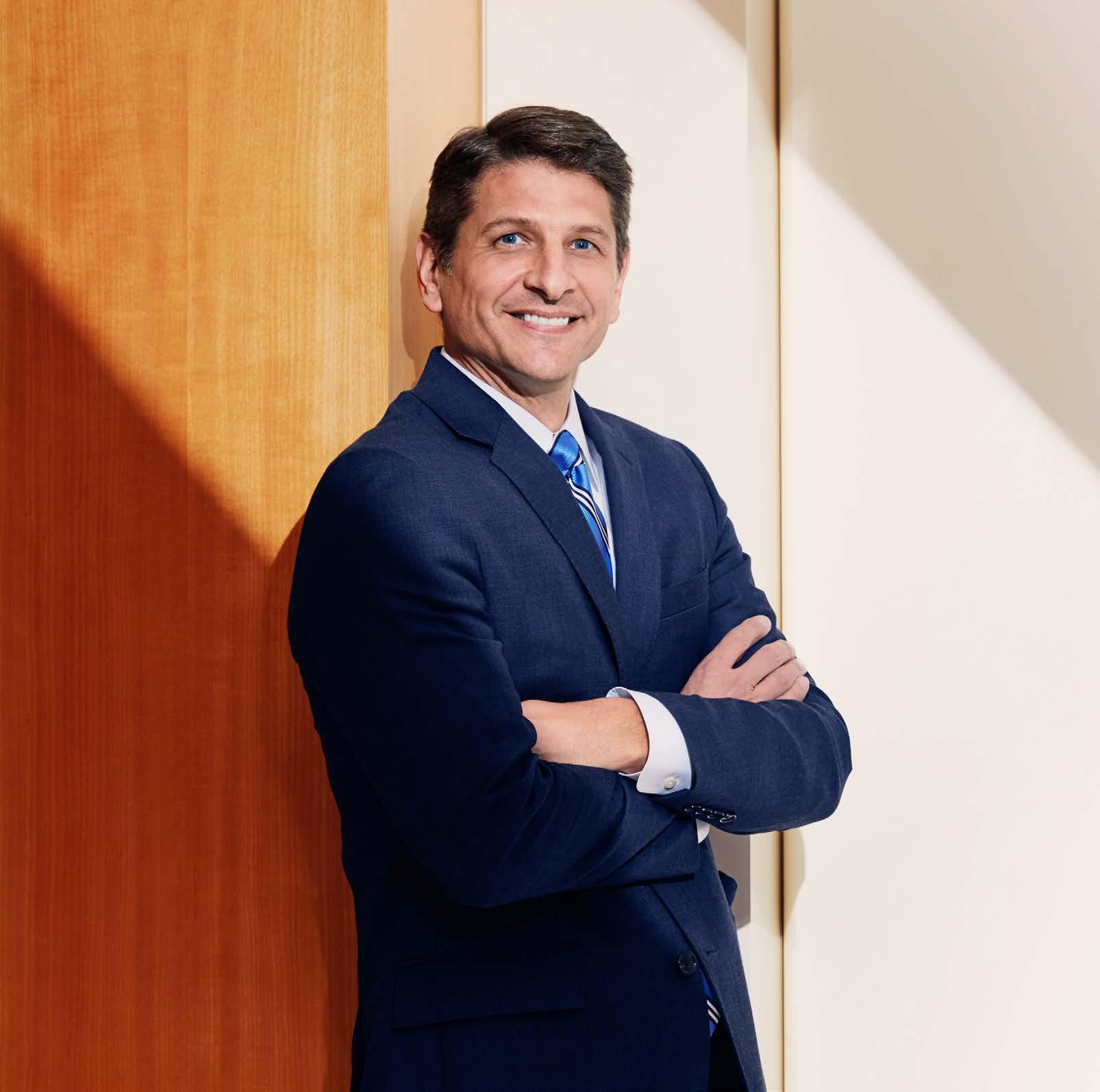
J. B. SIMKO AND PMI’S LITIGATION TEAM HAVE THEIR work cut out for them. The vice president and associate general counsel and his colleagues at Philip Morris International (PMI), home to some of the most well-known cigarette brands on earth (including Marlboro), have been tasked with making a 2017 company-wide commitment a reality: “We’re building PMI’s future on smoke-free products that are a much better choice than cigarette smoking,” reads an excerpt from PMI’s website, titled “Building a Smoke-Free Future.” “Indeed, our vision—for all of us at PMI—is that these products will one day replace cigarettes.”
PMI is relying on Simko’s extensive experience in almost every facet of the company’s legal affairs—as well as that of his colleagues in the law department— to help usher in a new era of what PMI calls “smokefree products.” These products include e-cigarettes and PMI’s patented IQOS technology, which uses electronics to heat (but not burn) tobacco in order to release flavors and nicotine. To take on the challenge, Simko is making sure the company has the right litigation team in place with the right skills.
PMI products are sold in more than 180 countries outside the US, yet the company’s worldwide litigation team is a lean eight lawyers deep, based in New York City and Lausanne, Switzerland. “The strength of the team itself is the depth of litigation experience here,” Simko says. “Most of the people have been working in litigation—specifically representing the company as outside counsel—before they’ve come in. It gives a realistic perspective. There’s a depth of analysis and an ability to communicate and relate that is key to advising the business.”
Simko has been doing litigation for PMI since 2008 but has also assisted the company legally in the areas of compliance, anticounterfeiting, trade issues, marketing, market research, next-generation products, and sales. “All these experiences enabled me to get to know the business very well and, more importantly, be able to expand my network within the business,” Simko says. “We are so international, it really gave me time to develop relationships that I draw upon every day.”
Simko says that all-around experience is extraordinarily valuable. “We want to broaden the team’s
“What we’re doing makes sense and is definitely the right thing to do.”
exposure and experiences with different functions and within regions,” he explains.
For such a small team to manage matters globally, Simko says, the company employs a “one-team” approach, teaming up with outside counsel. “Our approach may be a bit different than some other companies’,” Simko says. “We develop long-term relationships with our outside firms. We work very closely with two international firms and national counsel in each jurisdiction. We invest in these relationships and want our outside lawyers to understand our business. One of the most common things you hear is ‘That’s not how we do it here.’ You have to work through that together to find solutions.” It’s the team’s unique historical knowledge and broad experience, he believes, that make it capable of taking on so many new issues as the company pivots.
J. B. Simko VP and Associate General Counsel
Philip Morris International
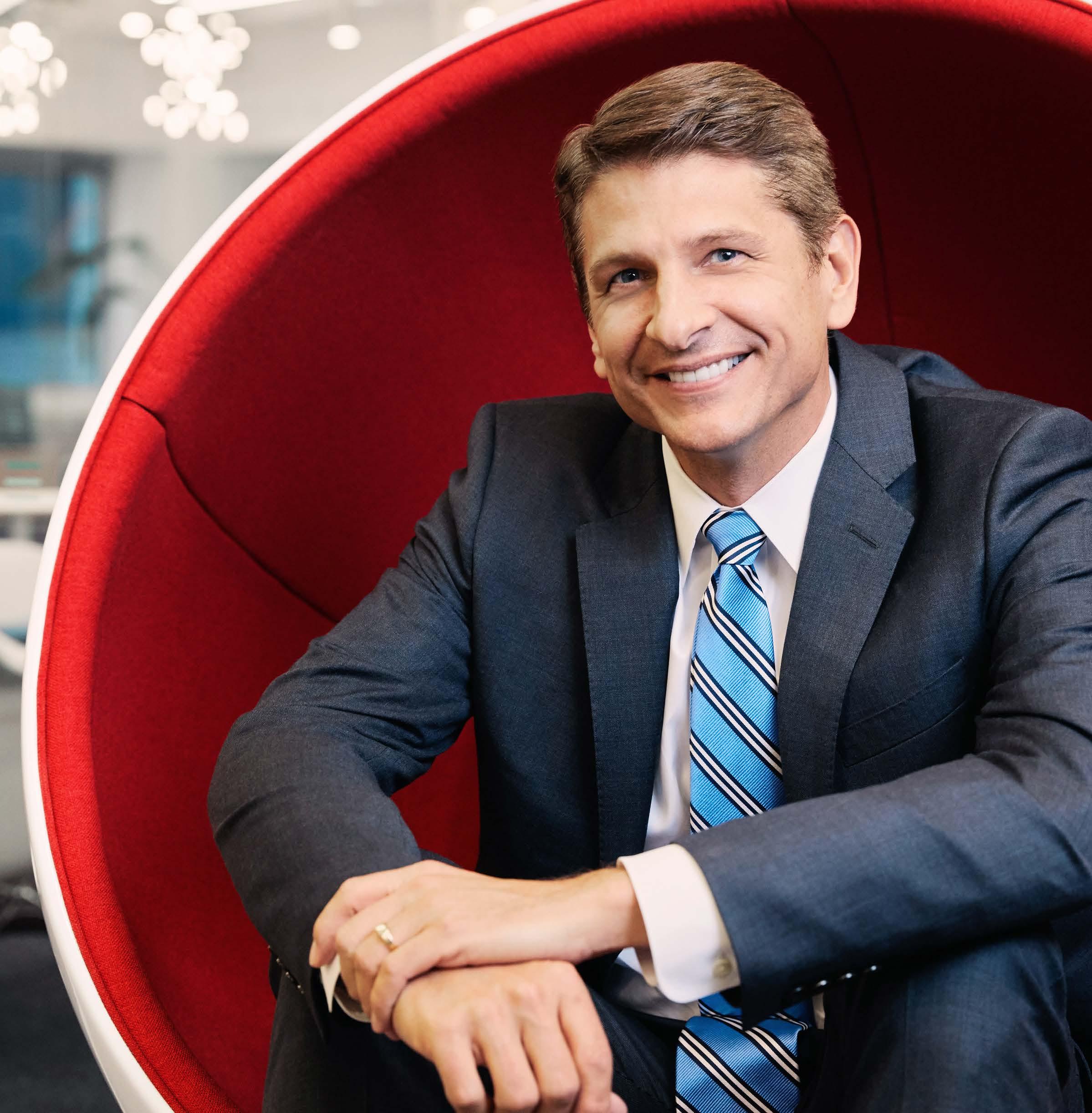
We congratulate J.B. Simko on this well-deserved recognition as a leader in his field. We are proud to join Modern Counsel in spotlighting you and your professional accomplishments.

When it comes to outside counsel at both the national and international level, Simko says, PMI is particularly dedicated to diversity and inclusion. “We discuss succession planning with our firms and look at team diversity every year,” he adds. According to Simko, diversity of viewpoints and voices is critical for strategic thinking and matching up to any circumstance.
While much of PMI’s litigation work is comparable to that at other international companies, it’s the business’s commitment to smoke-free products that truly makes Simko and his team’s work unique and challenging. Simko says working to convince regulators to allow information and access to better products is a tremendous challenge. “You need to be creative, persuasive, and get people to base their decisions on sound science and common sense,” he adds.
In order to convince adult smokers to move to smoke-free products, PMI needs to communicate with its customers, but regulations and laws aimed at reducing cigarette smoking can make it very difficult to let them know about better alternatives.
“It’s a tough road,” Simko says. “From a litigation perspective, you continue to have challenges relating to product liability, securities litigation, and general skepticism from regulators. But, I do think we are up to the challenge, and offering consumers better products is definitely the right thing to do.”
After two decades at financial-services firm Edward Jones, Kimberly Gannon reflects on the roles that have equipped her to overhaul policies and adopt new technological trends
By Bridgett Novak
WHEN KIMBERLY GANNON WAS A child, her mother foresaw potential in a specific career path. “My mother told me I should be an attorney, because I didn’t like taking no for an answer,” Gannon recalls. Following her advice, Gannon majored in finance and prelaw, earned her JD from Widener University, clerked for a superior court judge in Delaware, and worked as a litigation associate at two Philadelphia law firms.
Litigation wasn’t her passion, though. “I liked the blending of finance and law that you find in corporate transactional work,” Gannon explains. “So when an opportunity opened up for a compliance attorney at Edward Jones, I jumped at it.” She arrived at the trillion-dollar financial services firm in June 1997, and has been there ever since.
“The work attracted me, but the culture is why I’ve stayed,” Gannon says. The Fortune 400 firm is a partnership—i.e., owned by current and former employees. Today Edward Jones comprises about forty-five thousand employees in the United States and Canada and serves more than seven million clients—primarily individual investors and business owners.
“We don’t have the pressure of quarterly earnings or shareholder concerns,” Gannon explains. “We focus on our clients and emphasize long-term relationships, both internally and externally. It’s so different from most other corporate environments. I loved it as soon as I got here.”
She’s not the only one. The company earned the fifth spot on the 2018 Best Places to Work list and the third spot on the 2017 Best Workplaces for Women
Kimberly Gannon Principal and Senior Associate General Counsel
Edward Jones
list. The surveys, by Fortune and the Great Place to Work organization, are based on employee ratings of top executives, compensation, fairness, camaraderie, and innovation.
For the past ten years, the firm has also received the highest ranking in J.D. Power’s annual survey that asks financial advisors to rate their firms in terms of client support, leadership, professional development, and technology.
Cultivating a high level of employee satisfaction certainly has contributed to the firm’s enduring success. Based in Des Peres, Missouri, Edward Jones was founded in 1922 and has since grown into an industry leader of

retirement, wealth management, and insurance solutions.
One of the ways the firm puts professional development into action is through the frequent reassignment of employees. “The firm sees this as a great way for us to learn about and contribute to different areas of the organization,” Gannon says. “It works beautifully and makes us more conscious and respectful of what our teammates do.”
Gannon’s first position at the firm was in the compliance division, where, she says, her Series 7, 8, 63, 24, and 55 certifications turned out to be more important than her legal degree. Four years later, she was asked to manage client litigation. “That moved me into the legal department, where I worked on a little bit of everything,” she says. Gannon was named senior associate general counsel and partner in 2006, when she was tasked with establishing a regulatory team.
In 2009, Gannon became responsible for the employee and benefits team, where she oversees three other attorneys. They have helped the HR department update policies and programs in light of the #MeToo movement and greatly expanded parental leave (to sixteen weeks of paid leave for the primary caregiver and two weeks for the secondary caregiver).
Her team is also educating the firm on legal risks related to the use of artificial intelligence in digital interviews. A 2017 Deloitte report found 33 percent of surveyed companies use AI in the hiring process. Though designed to save time and reduce human bias, Gannon says, there are several potential pitfalls. “For example, if a company uses AI to assess word choices or tone of voice and only reviews candidates who attain a certain score based on a predetermined algo-
Family History Inspires Volunteer Commitment
One of Gannon’s biggest passions outside her job is her role as a board member for Lydia’s House, which hopes to end domestic violence via the provision of transitional housing, education, training, and job opportunities to abuse victims. Gannon says the group has a waiting list for its services.
“This is such a sad situation, but I have great motivation for the work,” Gannon says. “My grandmother was married to a local athlete who owned a bar in town. Unfortunately, he was physically abusive, once knocking her unconscious.”
Gannon’s grandmother divorced him, raised two daughters, worked full-time, won two terms to the City Council in Canton, Ohio, and was a member of the Board of Elections from 1956 to 1981. Her name was Vera Elliott, and she was named, along with John Glenn, as a lifetime contributor to the Democratic Party of Ohio.
“I keep a photo of her campaigning with John F. Kennedy on my desk,” Gannon says, “as a stimulus to be a strong woman and to keep supporting the programs at Lydia’s House.”
“The industry has become increasingly complex and dynamic. . . . Instead of just meeting the requirements, we try to exceed them.”
SR. ASSOCIATE
GENERAL COUNSEL
EDWARD JONES
rithm, it could end up being discriminatory,” she explains.
At press time, Gannon was preparing for another move. “I will be back in compliance by year-end 2018,” she says. “The biggest difference since I last worked in that department is how much we have grown.” In 2001, the team comprised about fifty associates in the compliance division (compared to six hundred today) and four thousand financial advisors throughout the firm (versus seventeen thousand).
Yet the firm’s laser focus on compliance hasn’t changed, according to Gannon. “The industry has become increasingly complex and dynamic,” she says. “As a result, compliance is more important than ever. Instead of just meeting the requirements, we try to exceed them.” The firm established a new position called the culture of compliance leader in each of its 260 regions, to reinforce its core values, behaviors, and commitment to compliance.
“It’s another example of why I love Edward Jones,” Gannon says. “We provide all the resources required for everyone to succeed.”
Essilor’s adjoining charitable foundation just welcomed a new leader, Becky Palm, who has big plans to create sustainable models for the distribution of corrective lenses to those in need
By Randall Colburn
Becky Palm, for example, unearthed her love for philanthropy when, as a child, her father took her to the annual Jerry Lewis MDA Labor Day Telethon, where she’d play behind the scenes with the children directly benefiting from donations.
“My parents were very mindful of how we can help others,” she says, noting that she was raised with the adage that “gifts you receive should be given.”
It was an ideal pairing, then, when Palm found herself working first as a corporate counsel and, eventually, a senior counsel at Essilor, the multinational eyeglass lens manufacturer. The company, which boasts a massive footprint and an annual revenue of $7 billion, takes its charitable work seriously, providing, among other things, its employees with days off to volunteer their time at the Essilor Vision
Foundation. The organization’s mission is simple yet multifaceted: break down the barriers that prevent those in need of eye care from getting the help they require. Since 2007, the foundation has distributed more than 750,000 pairs of glasses to those in need in the US, partnering along the way with 500 eye-care professionals, more than 140 nonprofits, and a large number of schools, which recently kicked off a collaborative program with Scholastic.
“I was immediately struck by the commitment to Essilor’s mission of improving lives by improving sight,” Palm says. “I really appreciated that it encouraged employees to learn about how its products can correct, protect, and/or prevent vision impairment, and I respected how the company was helping others better their lives as a result. Because it’s important to Essilor, it became important to each of us.”

models that will directly address what the foundation refers to as the “large gap between the need for and access to vision care.”
“Finding a sustainable model is very important to me,” Palm says. “I want to make sure parents and educators put vision in the same space as hunger, dental care, and physical health because vision is the largest disability that goes undetected. Vision is not self-detected with children. Children will tell you if their stomachs are growling, but they don’t tell you if they can’t see the chalkboard at school. We develop our programs to overcome these barriers to vision care so that there are fewer and fewer children who slip through those cracks.”
The Scholastic program, called “Your Amazing Eyes,” is one of the sustainable-model initiatives. Launched in 2018, the program delivers educational kits with information for both students and parents to strategically targeted leaders, who can then disseminate them to the appropriate parties. The hope, Palm says, is to create a self-sustaining, self-detecting community resource.
Becky Palm President and Executive Director
Essilor Vision Foundation
In 2018, Palm began her transition from Essilor’s legal team to a new role serving as the head of the foundation’s US arm. It’s been a natural fit; Palm, after all, has been heavily involved with the organization since she started in 2012. Her devotion to it crystallized during a mission trip to India on the foundation’s behalf, and she’s since continued to do mission work while also donating her legal expertise. Today, in her full-time position, she’s working to develop more sustainable
There’s also Changing Life through Lenses, a new program enabling eye doctors to give back in their own communities. “This program empowers philanthropic eye doctors and nonprofits to help those in need with a complete pair of glasses, including no-cost lenses, lab services, and frames,” Palm explains. “Changing Life through Lenses provides free eyeglasses to patients who are at or below the poverty level and do not have insurance for the pair of glasses they receive through the program.”
The program has seen hundreds of adopters since it launched in the middle of 2018, and Palm says the challenge is

in how to “strategically source and scale it.” “It’s really allowed us to have a lean internal team and leverage local resources and community engagement,” she adds.
The move from being an individual contributor to managing an entire operation has been a huge development opportunity for Palm, and her passion for the foundation’s mission, her legal expertise, and her background working with nonprofits are certainly strengths she leverages when tackling new challenges in her new role. Also, it helps that she has a company as robust as Essilor backing her up. “It’s nice to be in a role where, directly or indirectly, you have an entire organization of huge magnitude that is making a point to support and celebrate what you’re doing,” she says. “That’s a pretty powerful message.”
recognition of Becky Palm, Senior Counsel at Essilor on her impressive career, work ethic, and commitment to philanthropy. We at Dentons salute your great accomplishments, Becky.
Now the world's largest global elite law firm.*
encies is not only a hallmark of Patrick Quinn’s position at New York Community Bancorp, but also of the corporate organizational structure of the twentyfirst century. “The old model of the corporation as the sole need to further the profit motive is dead now,” Quinn says. “The new paradigm is about these multiple constituencies and we have to accept that.” Now as executive vice president, chief corporate governance officer, corporate secretary, and counsel for the $50.5 billion public company, Quinn and his legal team are positioning one of the largest banks in the United States for even more growth.
With about 160 years of experience in commercial banking, NYCB has evolved into a network of 225 branches across New York, New Jersey, Arizona, Florida, and Ohio since its emergence in 1859. The holding company for New York Community Bank and New York Commercial bank, NYCB’s portfolio specializes in multifamily and real estate loans and represents about 75 percent of total held-for-investment loans.
Quinn arrived at NYCB in 2003 during the Roslyn Bancorp merger, and today, he navigates the new paradigm of multiple constituencies and constantly competing interests. He also advises other in-house lawyers who feel pulled in multiple directions to consider their primary purpose first. “You came here to be a lawyer,” he explains.
By Will Grant
How Patrick Quinn ensures his legal team best serves New York Community Bancorp as an active partner in the company’s strategic plan
In-house counsel often focus too much on the role of business partner, according to Quinn, who adds that the title is sometimes poorly defined. “That’s not meant to say that all we’re supposed to do is tell the business where the lines are drawn,” Quinn says. “We have to work collaboratively with them, but it’s fundamental. You play a role that is con-
Patrick Quinn EVP, Chief Corporate Governance Officer, Corporate Secretary, and Counsel New York Community Bancorp
nected to the law and your job is to help our colleagues interpret and apply it.”
Quinn knows that to optimize his team members as business partners, he must strengthen their primary purpose: legal expertise. So, when it comes to overseeing his own team, Quinn points to a paternal analogy.
“When I think about the department, I think of golfing with my son,” Quinn says. “I think my approach there was to let him play and not to get too much in his head. I wanted to let him come into his own and realize the goal, remind him of the rules, and help him along in that way.”
He views his leadership at NYCB in a similar way, encouraging his department to realize their potential. Yet he also expects his team to take a proactive approach in their understanding of the domain itself.
“In my day-to-day with my team, I will often say, ‘What is the law?’” Quinn says. “It can catch people off guard sometimes, but it’s your job to know the rules. Know the goal.”

As a leader at NYCB tasked with supporting multiple shareholders, Quinn says he must rely on his team to do their jobs well and free of micromanagement. He leads his team meetings accordingly, providing a platform for team members to operate independently—and thus, more effectively, he explains.
“They speak quickly, efficiently to the right priorities and they recognize a shared experience for the department to function as a whole,” Quinn says. “Each one of them does different things, but it’s supposed to be a time to catch up, be accountable, and also to develop as a legal team.”
Autonomy is a method that Quinn applies often in his own work and champions at all levels, from the frequent update meetings with his department to the boardroom.
“Best practices here are helping everybody to exercise their independent thinking,” Quinn says. “That doesn’t mean everyone has to ignore collegiality and dig in on their own positions, but to really recognize their role when they’re called upon to operate independently.”
Quinn explains that fostering that higher level of independence can be tricky, although ideal for the team’s value to the business. He thinks establishing best practices always requires a dialectical tension of not wanting to overly complicate or interrupt, but also needing to challenge preconceived notions of how things have always been done.
“To have that at the board level, it’s absolutely critical,” Quinn says. “In fact, it really applies to all management levels.”
The legal leader has cultivated his knack for getting to the point through-
White & Case congratulates R. Patrick Quinn, Executive Vice President, Chief Corporate Governance Officer, and Corporate Secretary at New York Community Bancorp, Inc., on his accomplishments and recognition by Modern Counsel
As a pioneering international law firm, we help our clients achieve their ambitions across the world’s developed and emerging markets.
whitecase.com
out his career—and it makes sense to do so at NYCB, where he’s interacting with the multiple stakeholders he’s counseling, often concurrently.
Maintaining a proper balance at work also applies to communication, he adds. Making sure that those at the highest levels of NYCB understand the implications of how their decisions affect those further down the line, and vice versa, is one of Quinn’s highest priorities.
Clear channels of communication are essential for successful outcomes, according to Quinn, and he also cites strategic focus as a driver of his success at NYCB.
“That’s my job description: to be good at communicating and understanding the issues,” Quinn says. “And being selective about how we share that information to motivate, align, and ensure that we’re on the right track.”
In fact, that superior communication style established in the NYCB culture is what Quinn says initially intrigued him about the company.
“From early on it was clear to me that this was a place where senior management—the CEO, the CFO, and the COO in particular—were really tuned in to shareholders,” Quinn says. “It was immediately apparent here that these people were focused on being a public company and satisfying that particular constituency. Being tuned into shareholder interests, employees, communities, and regulators has been a longstanding part of my experience here.”
Farber, Rosen & Kaufman, PC: “Pat is deserving of this recognition. He is an exceptional attorney who defines what in-house counsel should be.”
—Joseph Farber, Esq.
From copyrighted and trademarked content to illegal speech and symbolism in countries all over the world, Twitter’s legal team has its hands full on a daily basis, making sure users don’t overstep their boundaries
By Roland Archer
REGULATING THE FLOW OF INFORMA-
tion on the internet is a challenging task in itself, but trying to regulate it on a daily basis on the social media network Twitter—which, as of the second quarter of 2018, had more than 335 million users—is a never-ending task for the company’s legal team.
That’s because even on a platform where one can sound off with their own thoughts, opinions, and even general non sequitur (covfefe, anyone?), there’s still plenty of trademarked and copyrighted content being shared without authorization, not to mention a myriad of laws to navigate in countries throughout the world where particular content is simply illegal to share (e.g., sharing Nazi symbols is illegal in Germany).
On a platform where even users who are suspended for violating the network’s terms of service can use a different email address to open another account, the battle that the company’s legal team fights is ongoing. Michele Lee, director, associate general counsel, and head of litigation and competition, and the rest of the team must therefore remain ever vigilant. From July to December 2017, the network noted that reports of alleged trademark policy violations dropped 18 percent from the previous six-month reporting period. However, in that same period, reports of alleged copyright infringement, including the total number of Digital Millennium Copyright Act takedown notices, increased 38 percent over the previous six-month reporting period.
When it comes to the aforementioned country-by-country removal requests, the challenges only get stickier. On its website, Twitter notes that governments (and their lawenforcement agencies), organizations chartered to combat discrimination, and lawyers representing individuals are among the complainants that submit legal requests. Twitter may, for example, receive a court order requiring removal of defamatory statements in one country, or law enforcement might ask the company to remove prohibited content in another.
In December 2017, the social networking site updated in-product messaging about withheld content in an attempt to better explain why certain content is withheld. That led to better differentiation between legal demands and reports based on local laws.
“The more that we can share about our actions, the better the public can understand the various challenges— legal or otherwise—that we face and how we handle them,” said Jeremy Kessel, Twitter’s global policy director, in a statement. “We are pleased to be able to share this step, but there is more to be done.”
Outside counsel partners such as Simpson Thacher are pleased to be working with Lee and Twitter on such matters. “As outside counsel, we have had the pleasure of working closely with Michele Lee,” says Jon Youngwood, cochair of the litigation department. “She is very talented, deeply committed, and an excellent leader,” adds partner Jim Kreissman.
Twitter has shared its transparency reports since 2012, but despite making that information public, the platform has come under more scrutiny over how it handles controversial content—due in no small part to public outcry over
white-supremacist accounts and even tweets from President Donald Trump’s account, which some have argued violate the company’s usage terms related to hate speech and the possibility of inciting violence.
Nevertheless, the legal arguments and challenges made in the United States are just a piece of the puzzle that Twitter’s legal team has to manage. Both France and Germany submit high numbers of legal demands (based on reporting content that can be considered illegal hate speech under local European law), and according to Twitter, nearly 85 percent of the total global volume of legal demands has so far come from Russia and Turkey.
During the July to December 2017 reporting period, seventy-nine accounts of verified journalists and news outlets were the subject of legal demands (fiftyeight of them in Turkey), although Twitter ultimately only withheld one account due to violations of Turkey’s anti-terror law. In several cases, Twitter filed legal objections to court orders involving Turkish news media, though none of its objections succeeded.
According to Kessel, as Twitter continues to evolve, it is working on improving its use of in-app notifications to alert affected users when it receives legal requests about their accounts. As technology evolves exponentially, on a daily basis, Twitter’s efforts to increase transparency will have to continue evolving with it.
Simpson Thacher:
Simpson Thacher’s global litigation department represents a wide range of sophisticated clients— including corporations, financial institutions, boards, audit and special committees, and senior executives— in their most significant matters. The firm offers a substantial bench of talent to effectively handle litigations, government and internal investigations, arbitrations, and cross-border disputes in North and South America, Asia, and Europe.
WilmerHale: “Michele is a world-class inside counsel. She has an extraordinary grasp of the rapidly changing issues facing tech companies. Her judgment is superb. She brings out the very best from both her team and outside counsel.“
—Patrick Carome, Partner

By David Levine
The Howard Hughes Corporation flies fast, and associate general counsel Aaron Grodin pilots the real estate developer’s litigation

Aaron Grodin Associate General Counsel of Litigation
THE NAME HOWARD HUGHES CONJURES A WIDE variety of images: pioneering aviator, movie mogul, playboy, billionaire recluse. But, he also was a wise investor, especially in real estate. His name lives on in the Howard Hughes Corporation, a developer of master-planned communities and other real estate assets that were spun out of General Growth Properties during its bankruptcy in 2010. As corporate employee number nine of the fledging company, Aaron Grodin, now the associate general counsel of litigation, has been integral in varying roles in and out of the legal department since the day after the company’s emergence as a publicly traded company. “I even designed the company’s letterhead on day one,” Grodin says.
Grodin’s “litigation shop” pays its own way, at least in most years. “The joke is that I have run a ‘profitable shop,’” he says. “Of course, litigation is a cost center, but I track every penny we spend on lawyers and experts and every penny we bring in. With the amount of money I bring in from pursuing claims, I have had five of eight years in the black.”
For example, in a major case for the company in the Woodlands, one of the company’s master-planned communities and developments north of Houston, involving dozens of plaintiffs, “we spent a lot of money on experts and attorneys and a lot of time doing investigations, which ultimately showed conclusively that the plaintiffs’ claims lacked merit,” Grodin says. The case was dismissed, and the company recovered about 75 percent of its fees and costs from its insurance company.
Grodin has also been very successful in risk transfer for the company. “As soon as a new claim comes in, I immediately seek to tender our defense and indemnity to every party that might be responsible, and we aggressively hold them to their contractual agreement to defend and indemnify us,” he says. “This saves the company significant dollars every year.”
Grodin grew up in El Paso, Texas, attended the University of Texas at Austin, and earned his JD at Southern Methodist University’s Dedman School of Law. Not long after graduation, he got a call from a lawyer at a firm in Dallas who was putting together an in-house legal department for a company that was on the verge of emerging as a new publicly traded company. “I met the leadership team, and they
“With the amount of money I bring in from pursuing claims, I have had five of eight years in the black.”
offered me a job, even though they were not sure what my role would be yet,” he says. “I jumped at the opportunity.”
First, he learned the company’s backstory. Hughes’s entrepreneurial empire included a lot of land in Nevada. After Hughes passed away in 1976, his empire went through several acquisitions, mergers, and spin-offs until it arrived at its current iteration. Today, the Howard Hughes Corporation is a publicly traded company with more than one thousand employees and a market capitalization of more than $5 billion.
But, in 2010, after it emerged as a standalone publicly traded corporation, its corporate office consisted of nine employees in a small office. “It was very entrepreneurial,” Grodin says.
One of its most valuable assets was the name itself. “We owned Howard Hughes’s name, signature, and likeness,” Grodin says. “The executive team believed the name symbolizes unique, exceptional, high-quality products and experiences. Hughes was on an endless pursuit to achieve excellence, and that is what the Howard Hughes Corporation is all about today.”
Grodin’s primary first task was to prepare for the company’s assumption—as part of its spin-off and emergence as a standalone company—of preexisting liabilities and litigation. “In the first month, all those issues and matters came to me,” he says. “I immediately had a docket of about fifty lawsuits—about ten were material—and I was the sole litigator. The first six months or so was a crazy schedule. We all had all kinds of roles, long hours, late nights; it was a true start-up.”
Eventually, the company found its legs. A general counsel was hired to lead the legal department, which grew to include a corporate lawyer, seven real estate lawyers, one construction lawyer, and “one litigator: me,” Grodin says. He handles all litigation across the country—“from Waikiki to Wall Street, we like to say,” he says—managing sixty to one hundred cases at any time. He is also the ad hoc IP lawyer, employment lawyer, and political contributions lawyer, among other roles, and he writes about two hundred contracts a year. “It is an ever-expanding role,” he says. “I like it; the pace never stops, never slows. Our executives are the smartest guys I’ve ever worked with, and they are nonstop, go, go, go. I get calls in the middle of the night because our executives travel internationally, and when something has to get done, it has to get done.”
Grodin did find time to pursue an outside calling, however. He joined the US Army Judge Advocate General’s Corps as a reservist, with his company leaders’ blessings. “I wasn’t sure I could do both, because I had to be away for six months for military law school and basic training,” he says. “My boss said, ‘You’ve got to do it. Service to our country is a great thing, and being a judge advocate will only further your development as a lawyer.’ I was blown away.”
He comes from a family with a history of service. “My grandfathers served and fought during WWII,” he says. “I had two uncles who served. One of them, a doctor, joined on Sept. 12, 2001, at age 52. He deployed two times. That stuck with me. I always wanted to serve in some form or fashion. I love helping soldiers, advising commanders on operational law, and being a soldier myself.” He intends to continue serving as a judge advocate for years to come.
He says his attention to detail at the Howard Hughes Corporation comes in large part from his time serving in the military. “In the army, if commanders are spending time trying to figure out what they need to know, they aren’t able to do their job,” he says. “It’s just, ‘Tell me what I need to know.’ I try to run my litigation shop as efficiently as I can. I make sure those outside the company follow what I expect, and I will call them on it if they don’t. You have to be decisive, too. You get options and recommendations, and then you have to be decisive.”

Karim Adatia, P10
Associate General Counsel and Director of Legal
Insight Enterprises
Allison Amadia, P216
General Counsel
Personal Capital
L. Scott Askins, P45
Head of Legal & Compliance Kabbage, Inc.
Doug Balyeat, P108
General Counsel
Pratt Industries
Ligia Bernardo, P200
Head of Legal
Olam Americas, Inc.
Elena Branzburg, P142
SVP and Senior Counsel
PIMCO
Carlos M. Brown, P153
VP and General Counsel
Dominion Energy
Mark Camero, P20
VP of Legal and General Counsel
HID Global
Kendall Cammermeyer, P58
Director and Assistant General Counsel
Puget Sound Energy
Yen Chu, P210
SVP and General Counsel
Equinox
Christy DeMott, P42
Associate General Counsel and Vice President
BMO Harris Bank
Stephanie Driggers, P100 Global Litigation Counsel UPS
Wendy Johnson Lario Shareholder; Chair, New Jersey
Labor & Employment Practice
Greenberg Traurig, LLP
973.443.3274
lariow@gtlaw.com
Wendy Johnson Lario is a trusted advisor and advocate for employers nationwide in complex employment litigation, investigations, and training.
Daniel Duval, P16
General Counsel, Chief Compliance Officer, and Managing Director
Jefferies Finance LLC
Kevin Fritz, P33
Labor & Employment Attorney
Seyfarth Shaw
Cassandra Gaines, P156 Founder Gaines Law Group
Kimberly Gannon, P231
Principal and Senior Associate General Counsel
Edward Jones
Shelly Gibson, P160
Chief Legal Officer and General Counsel Thorntons
Stuart Gray, P166
General Counsel
Roseburg Forest Products
Aaron Grodin, P244
Associate General Counsel of Litigation
The Howard Hughes Corporation
Antony Haynes, P176
Associate Dean for Strategic Initiatives & Information Systems and Assistant Professor Albany Law School
Fred Holc, P163
General Counsel, Group Corporate and Commercial Legal Department
Abu Dhabi National Oil Company
Brian W. Jones, P195
General Counsel
Merrick Bank
Daniel Gurfein Partner
Satterlee Stephens LLP
212.818.9200
dgurfein@ssbb.com
Daniel Gurfein regularly represents parties in credit card portfolio purchase and sale transactions (securitized and otherwise) and payment industry litigation.
Thomas Kiernan, P36
VP and General Counsel
VSE Corporation
Michele Lee, P241
Director, Associate General Counsel, and Head of Litigation & Competition
James G. Kreissman
Partner
Simpson Thacher & Bartlett LLP
650.251.5080
jkreissman@stblaw.com
Chair of the Asia Litigation Practice and senior West Coast litigator, Jim focuses on securities and M&A litigation as well as government and internal investigations.
Jonathan K. Youngwood
Partner
Simpson Thacher & Bartlett LLP
212.455.3539
jyoungwood@stblaw.com
Cochair of the firm’s litigation department, Jon represents clients in high-profile, complex commercial litigation and regulatory matters, including securities, corporate control, antitrust, and ERISA disputes.
Sandra Leung, P130
EVP and General Counsel
Bristol-Myers Squibb
David Fox Partner
Kirkland & Ellis LLP
212.446.4994
david.fox@kirkland.com
David Fox is a corporate partner in the New York office of Kirkland & Ellis, where he focuses on mergers and acquisitions in a variety of domestic and international transactions.
Mitch Lazris Partner
Hogan Lovells 202.637.5863
mitch.lazris@hoganlovells.com
Mitch Lazris is a partner in the Washington, DC, office of Hogan Lovells. He is a member of the firm’s Life Science Industry Sector team and the firm’s White Collar and Fraud Steering Committee.
Hannah Lim-Johnson, P33
SVP and Chief Legal Officer
Kelly Services
Jon Lutinski, P117
VP and Senior Antitrust Counsel
American Express
Jeffrey Medeiros, P205
SVP, General Counsel, and Corporate Secretary
USAA Bank
Lauren Mutti, P26
VP of Labor and Employment Counsel
Southern Glazer’s Wine and Spirits, LLC
Natalie Naugle, P94
Associate General Counsel for US and Canada Litigation Facebook
Kristen Netschke, P23
SVP, General Counsel, and Secretary AmeriTrust Group, Inc.
Craig Opperman, P148
VP and Chief IP Officer
Lam Research
Nilufer Ozder, P220
Associate General Counsel
Genel Energy
Becky Palm, P235 President and Executive Director
Essilor Vision Foundation
Cynthia Patton, P52 SVP and Chief Compliance Officer
Amgen
Timothy McCrystal Cochair, Health Care Practice
Ropes & Gray LLP
617.951.7278
timothy.mccrystal@ropesgray.com
Tim has extensive experience structuring and negotiating healthcare affiliations, mergers and acquisitions, joint ventures, and other business transactions. He also counsels on regulatory, compliance, and privacy matters.
Brien O’Connor Partner, Litigation & Enforcement Practice
Ropes & Gray LLP
617.951.7385
brien.o’connor@ropesgray.com
Brien represents corporations and other organizations and their leaders in their most threatening DOJ criminal investigations and prosecutions as well as federal and state False Claims Act issues, securities law concerns, and other significant civil and administrative matters.
Amanda Raad Cochair, Global Anti-Corruption & International Risk Practice
Ropes & Gray LLP
212.596.9027 (New York)
+44 20.3201.1642 (London) amanda.raad@ropesgray.com
Amanda, qualified both in the US and as a solicitor in the UK, specializes in international risk management and defense of corruption, sanctions, money laundering, and financial-fraud matters before US and UK regulators.
Blake Pickett, P192
General Counsel
Fleur de Lis Energy, LLC
Thomas Poché, P126
VP and Assistant General Counsel of IP Allergan
Patrick Quinn, P238
EVP, Chief Corporate Governance Officer, Corporate Secretary, and Counsel
New York Community Bancorp
Sandra Redding, P188
General Counsel
Dragon Oil
Stephanie Russell, P172
Assistant General Counsel
SunEdison
Sally Beauty Holdings, Inc., P40
Keith Scott, P48
Assistant General Counsel of Litigation & Compliance
Exide Technologies
Sanjana Sharma, P182
Associate General Counsel
UL
J. B. Simko, P226
VP and Associate General Counsel
Philip Morris International
Nikki Stitt Sokol, P94
Associate General Counsel for US and Canada Litigation
David Stafford, P112
SVP and General Counsel
McGraw-Hill Education
Heather Stern, P62
General Counsel and Global VP, Legal Affairs
Whole Foods Market
Patricia Thayer, P86
Senior Associate General Counsel of IP Litigation
Gilead Sciences
David Bassett Partner
Wilmer Cutler Pickering Hale and Dorr LLP
212.230.8858
david.bassett@wilmerhale.com
Dave Bassett is a partner in WilmerHale’s IP Litigation Practice Group, with more than 25 years of experience concentrating on biotechnology, pharmaceutical, and Hatch-Waxman patent-litigation disputes.
Adam K. Mortara
Partner
Bartlit Beck LLP
312.494.4469
adam.mortara@bartlit-beck.com
Adam K. Mortara is a partner at Bartlit Beck and a Lecturer in Law at the University of Chicago Law School, where he teaches constitutional law.
Lauren Thedford, P122
Associate General Counsel
Highland Capital Management, LP
Paul J. Torre
President
AST – Governance
Proxy & Ownership Services
212.400.2610
ptorre@astfinancial.com
AST assists corporations and fund companies with a full scope of ownership services, including registry services, corporate governance and advisory services, and mutual-fund proxy services.
Betty Tierney, P82
Associate General Counsel of Litigation
Macy’s
Suzanne Tom, P169 VP and General Counsel
Calix
Viktoriya Torchinsky-Field, P68
Associate Chief Counsel of Litigation
Cigna
Paul M. Hummer
Partner
Saul Ewing Arnstein & Lehr LLP
215.972.7788
paul.hummer@saul.com
Paul Hummer, the founding co-chair of Saul Ewing’s insurance practice, represents insurers and reinsurers in civil litigation, contested administrative proceedings, and internal investigations on matters related to the business of insurance.
Joshua Simon Partner Kirkland & Ellis LLP jsimon@kirkland.com 212.446.4789
Joshua Simon is a litigation partner in the New York office of Kirkland & Ellis LLP, where he focuses on ERISA, antitrust, RICO, and contract disputes related to the managed-care industry.
Sabra Truesdale, P119
Associate General Counsel of IP Western Digital
Dave Wall, P30
Global Legal Counsel
Volvo Trucks
Lane Wilson, P138
SVP and General Counsel
The Williams Companies